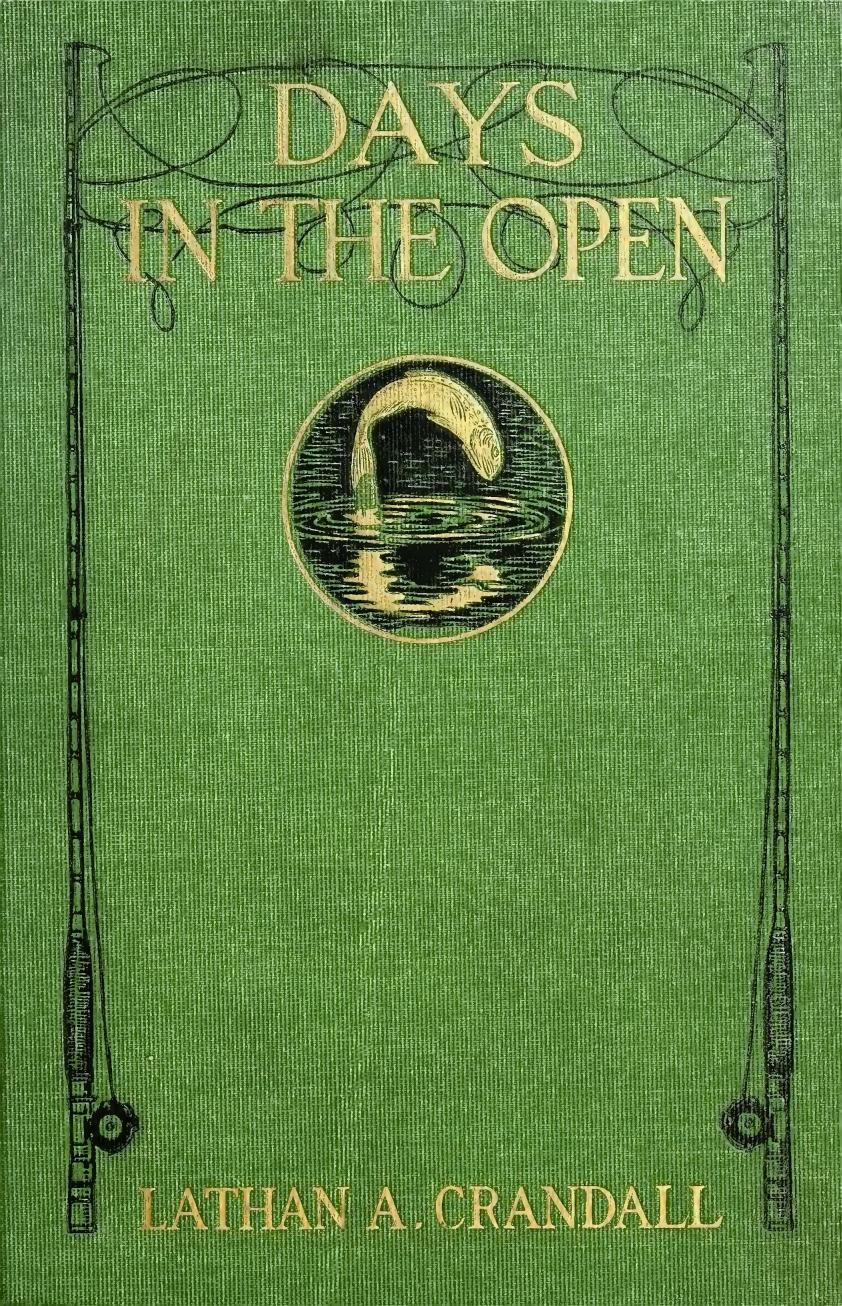

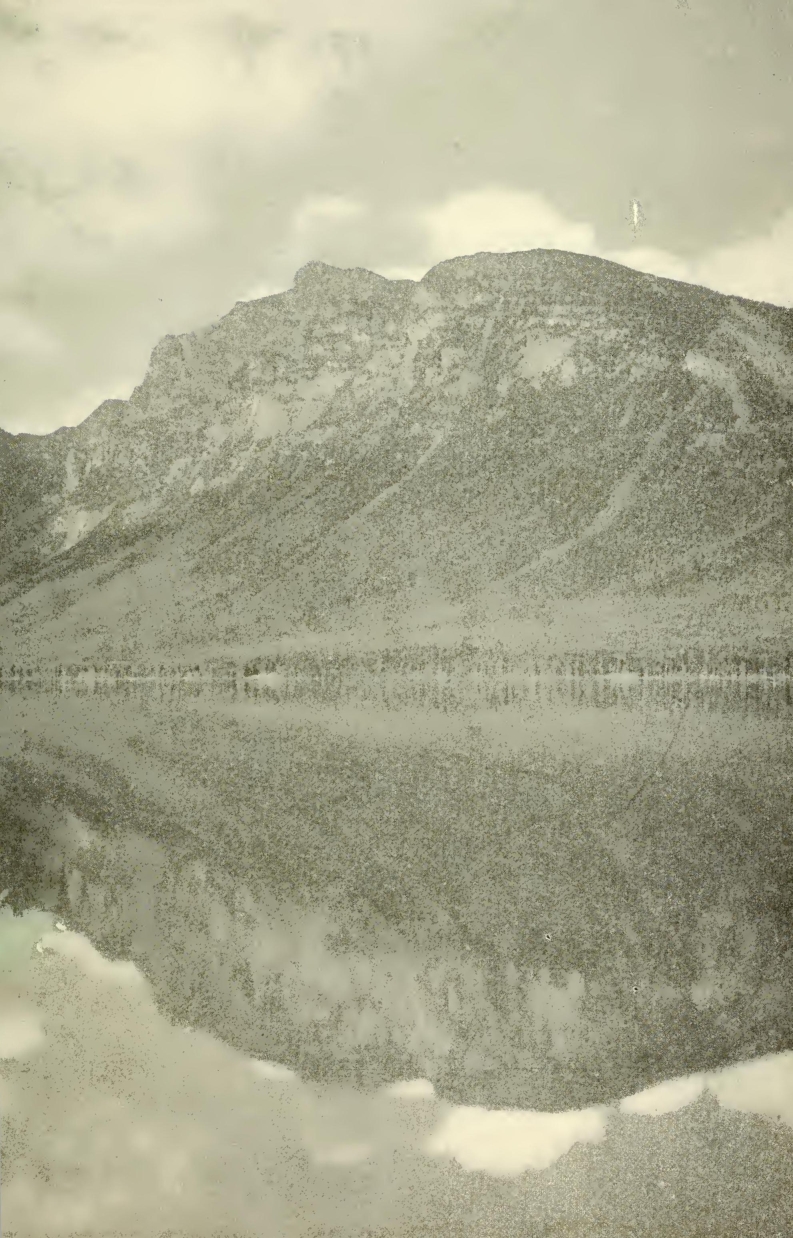
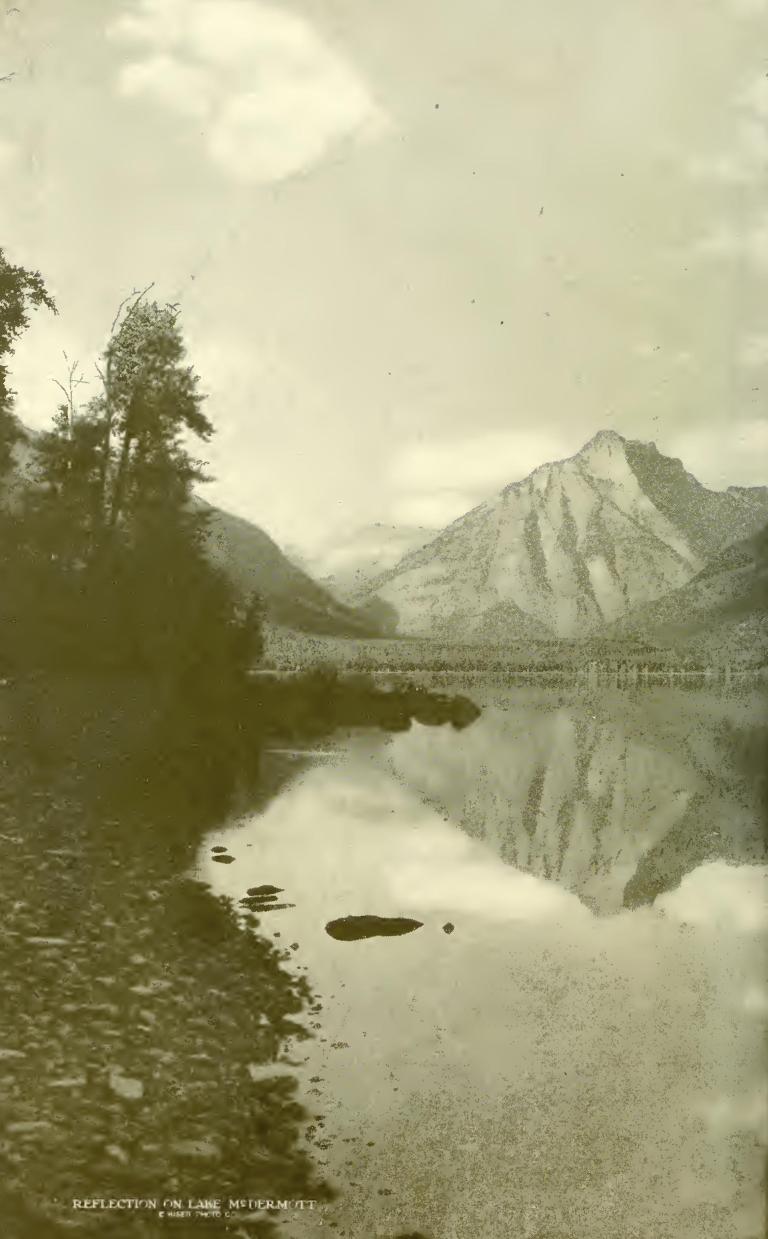
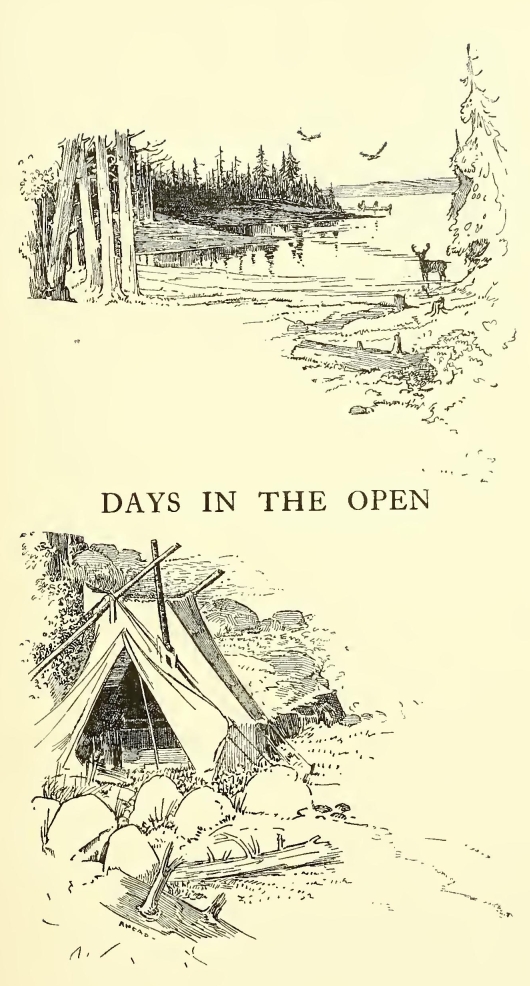
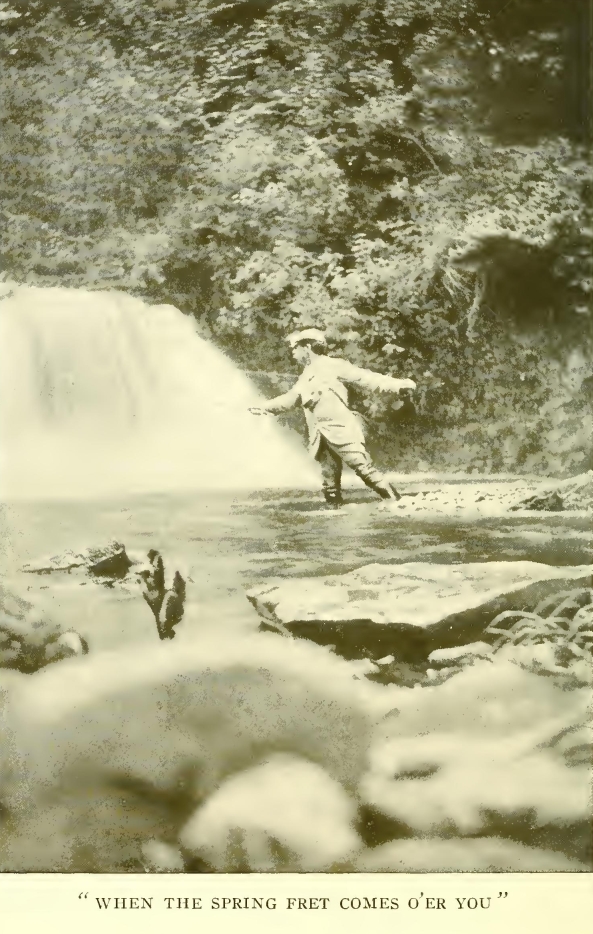
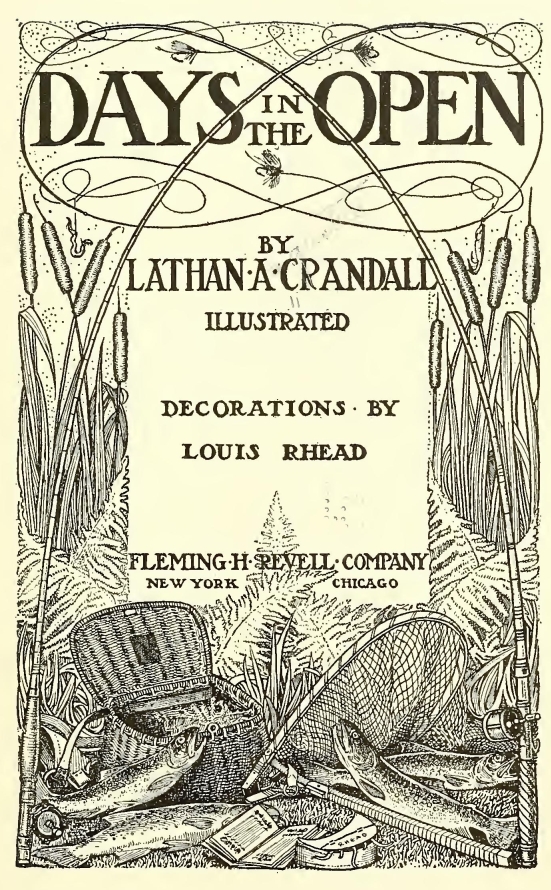

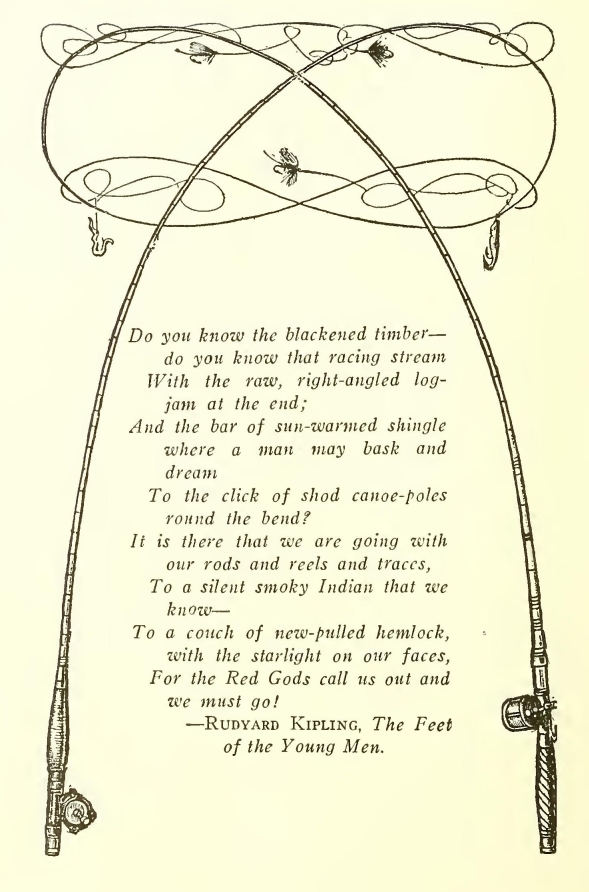
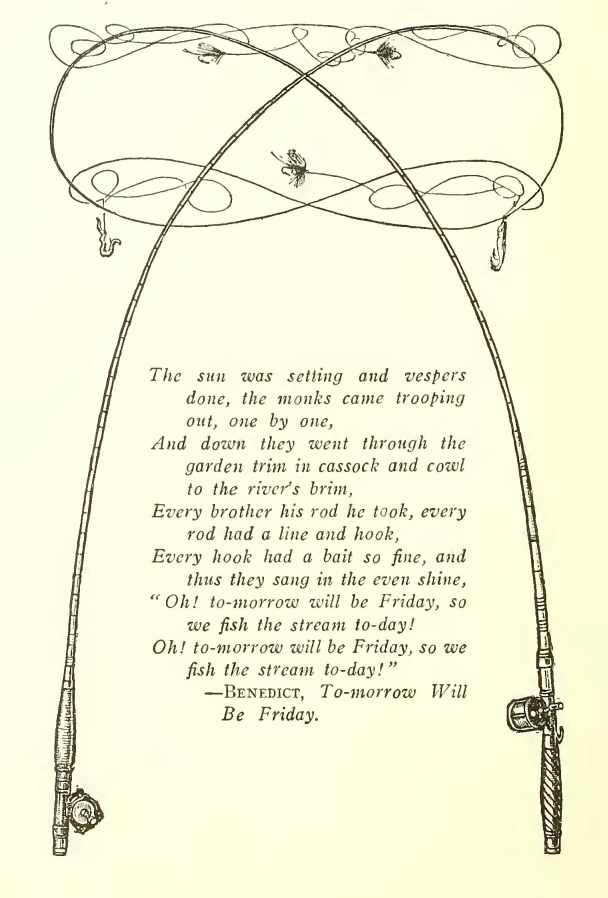
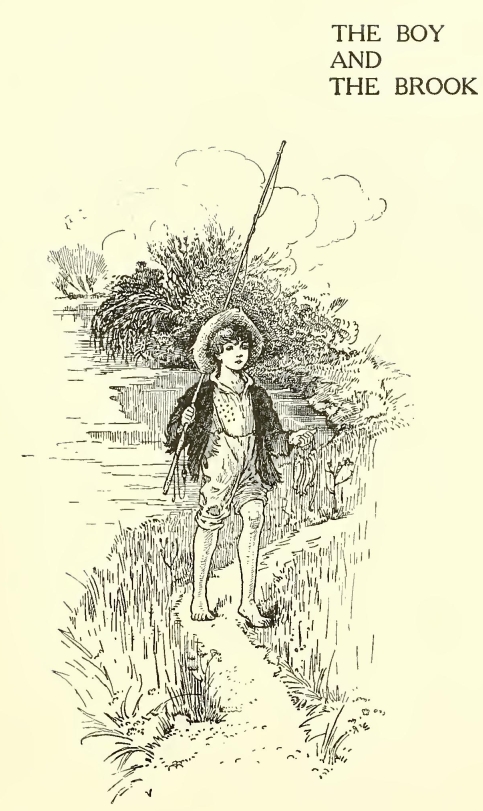
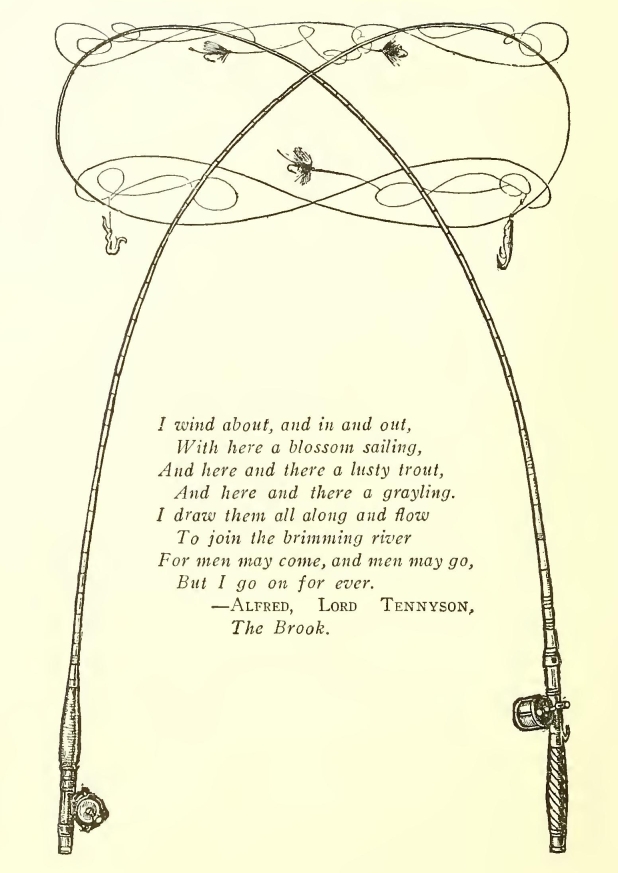
Do you know the blackened timber—do you know that racing stream
With the raw, right-angled logjam at the end;
And the bar of sun-wanned shingle where a man may bask and dream
To the click of shod canoe-poles round the bend?
It is there that we are going with our rods and reels and traces,
To a silent smoky Indian that we know—
To a couch of new-prilled hemlock, with the starlight on our faces,
For the Red Gods call us out and we must go!
—Rudyard Kipling,
The Feet of the Young Men.
The sun was setting and vespers done, the monks came trooping ont, one by one,
And down they went through the garden trim in cassock and cowl to the river’s brim,
Every brother his rod he took, every rod had a line and hook,
Every hook had a bait so fine, and thus they sang in the even shine,
“Oh! to-morrow will be Friday, so we fish the stream to-day!
Oh! to-morrow will be Friday, so we fish the stream to-day!”
—Benedict, To-morrow Will Be Friday.
I wind about, and in and out,
With here a blossom sailing,
And here and there a lusty trout,
And here and there a grayling.
I draw them all along and flow
To join the brimming river
For men may come, and men may go,
But I go on for ever.
—Alfred Lord Tennyson,
The Brook.
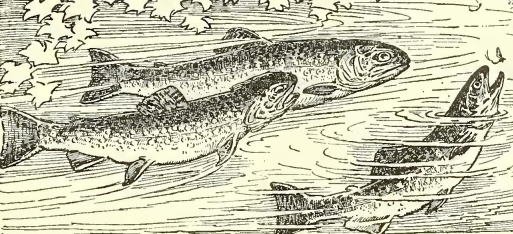
CONTENTS
III. THE TOWN-MEETING AT BLUE ROCK POOL
XI. AMONG THE CUT-THROATS OF LAKE CHELAN
XIII. IN A HOUSE-BOAT ON THE KOOTENAY
XV. IN THE ALGOMA WOODS—AND BEFORE
XVI. IN THE VALLEY OF THE DWYFOR
XVIII. THE BULLY OF THE UPPER OSWEGATCHIE
A, may I go fishing?”
That the boy should use the homely “Ma,” rather than “Mamma,” makes it clear that he is not of our generation, although his generous crop of freckles looks familiar, and his blue jumper, coming down to the knees, and that battered straw hat, are sometimes duplicated in our own day. It is fifty years across which we look, even if he does stand out so clearly. The question is one that he asks daily, if not oftener, from the time when the pussy-willows begin to swell in the spring-time, to the season for comforters and woollen mittens in the late fall.
Hark! Do you hear the voice that is calling the boy? It comes distinctly across the long stretch of years, and is as sweet and compelling now as when it pulled at the heart of the lad on that long-ago summer day. It is the voice of the brook. It gurgles and laughs and pleads. It says, “Ha! ha! ha! Isn’t this a beautiful world, and this the finest day ever? Come on, little boy, and play in my ripples. I’ve some nice peppermint growing on my banks, and all sorts of pretty pebbles that I have washed for you. Look sharp, now! Do you see that trout lying at the head of the riffle? Do you know that I counted thirty-seven as big as he is between the bridge and the Deer Pond? Come and catch ‘em!”
That brook was a part, and a large one, of the first permanent impressions made upon the boy’s mind. It had its rise in a little pond, concerning which there was the usual dark legend that it had no bottom. Just what held up the water was a mystery, but the boy never doubted the legend. It was fed by numerous springs. Vigorous and noisy from the moment when it broke forth from its source, the brook was ten miles of silvery laughter.
“If you’ll not go out of sight of the house you may go for an hour,” says the mother, for she too has ears to hear the call of the brook and can understand its charm for her lad. “Just up in the pasture-lot above the bridge,” calls back the boy, and starts off with his pole and a supply of angleworms wrapped up in paper. Take special notice of that pole, for it is the joy of the boy’s heart.
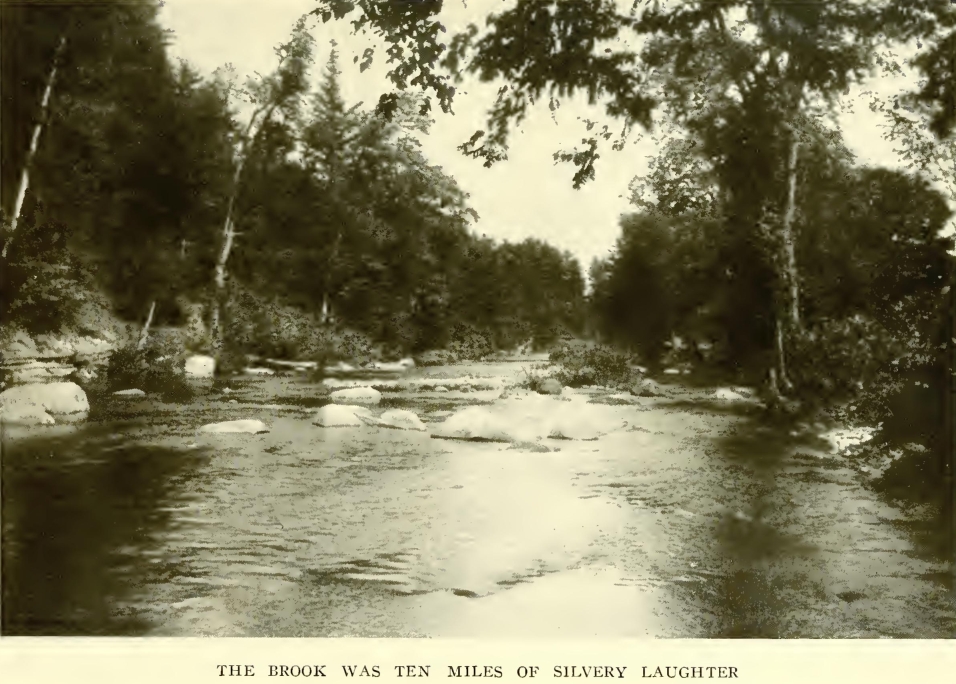
He had thought that a cedar sapling, peeled and thoroughly dried, made an ideal outfit, until a friend gave him a straight cane-pole painted a brilliant blue. In after years he owned not a few jointed rods, made by hand of split bamboo; but the tide of joy and pride has never risen higher in his heart than on the day when he became the possessor of the blue cane-pole.
There is a place in the pasture-lot where the brook stretches itself out in a long reach of still water. Above and below are rippling shallows. Wary as is his approach, the boy sees the shy trout darting from the riffles into the darker water. Patiently he dangles his baited hook by the side of a sunken log, and trails it temptingly back and forth before the coverts where the cunning fish lie hidden, but all in vain. They have learned by experience that the presence of a blue jumper and a blue pole spells out danger for them, and refuse to take any risks. Is this, like so many other fishing trips, to end in failure? Watch the boy! Laying the blue pole carefully on the ground, he rolls his sleeves to his shoulders and, lying on his stomach on the bank of the brook, thrusts one hand very gently into the water. With the utmost caution he feels here and there under the overhanging sods until at last his fingers touch something that sends an electric thrill tingling through the length of his little body. He feels a trout, and strangely enough it does not stir. The little fingers gently tickle the belly of the trout as they work their way towards its head, and when they have encircled the body at the gills they suddenly contract and the fish is thrown far back upon the grass. This performance is repeated three or four times, and then the trophies are gathered up in the jumper and with blue pole over his shoulder the boy goes proudly homeward.
Many years after the boy had grown to manhood he was riding with a friend on their way to a famous trout preserve. Naturally, the conversation turned to fishing experiences, and he told the story of the brook and of catching trout with his hands. The friend looked a whole volume of incredulity and exclaimed, “Well, of all the fish-lies I ever heard that takes the cake.” When the clubhouse was reached the keeper, a canny Scotchman, was interviewed. “Andrew, did you ever hear of catching trout with the hands?”
“Is it guddlin’ you mean? Mony a time. I’ve caught plenty of ‘em in the burns when a boy.” The skeptic was silenced if not convinced. Since that time a heated discussion of this mooted question has appeared in a prominent sporting journal, and able arguments have been adduced to prove the impossibility of any such feat as that ascribed to the boy. But he knows, and the brook knows, and the blue pole knows; and those may doubt who will.
“May I go fishin’ down in the woods?” The question came from an anxious heart, and the boy proceeded to support his request with reasons. “The biggest trout are down there. Edwin Crumb caught one that weighed ‘most a pound down there last week. There are no big ones in the pasture-lot. I’ll be careful, and I’m ‘most seven now, you know.” It was a momentous question. For two miles after leaving the bridge the brook ran through the woods, and the mother fancied all manner of possible and impossible dangers to her boy lurking among those trees. But then, the lad must be allowed to go out of her sight some time, and the day was full of sunshine.
“If you’ll be very careful, and not go far, and be back early, you may go.”
“Whoop!” and a small boy has disappeared from view before the permission is fairly spoken. No blue pole this time. The brush and alders are too thick and the pole too long. It is only a small birch limb, six feet long, possibly, that he pulls out from under the barn as he hurries to get out of hearing before the mother repents her rashness.
What a day that was! He has not gone far before, alongside the alders in the swift water, almost at his feet, he captures a larger trout than any ever granted him by the pasture-lot. He cuts a stringer from the over-hanging alders, and with fish in one hand and pole in the other proceeds on his adventurous way. For some time he steals along the gravelly bed of the brook, eagerly expectant but without getting even a bite. Certainly this is not very exciting, and his gaze begins to wander to the woods. Is that crinkle-root? Investigation yields a plentiful supply of the peppery plant and also three or four ground-nuts. Then the brook pulls him back to itself and a few rods farther on he comes to a log across the stream and partly under water. His heart gives a thump, for this must be the place where Edwin Crumb caught his big trout. It exactly fits the oft-repeated description. He leaves the bed of the brook, fetches a circuit through the brush and comes out just where he can drop his hook by the upper side of the log in the still water. The answer to his invitation is prompt, but the captive is not as large as was anticipated. Again and yet again he returns his lure only to meet a cordial reception, until five fair-sized trout have been added to the alder stringer; then activities cease.
We cannot follow him all through his eventful pilgrimage, but there is one experience that must not go unrecorded. In a tangle of brush formed by a tree-top which has fallen into a deep place in the stream he spies an open space, possibly eighteen inches in diameter, where the water is covered with scum and foam. Just the place for a big trout, but there is no way of getting even his short pole through the brush. The line is untied, and he goes crawling out on a limb that hangs over the brook, and sits, at last, astride it and directly above the enticing spot. A fresh and exceedingly fat angleworm is looped upon the hook and the wriggling mass is cautiously dropped into the middle of the scum. It has no sooner touched the water than there is a sharp tug and a mighty swirl, but only the hook and the remainders of the worm come back in answer to his pull. Another bait, and again the hook is lowered into the pool. No, the old fellow was not pricked the first time, for here he is again and this time firmly hooked. To balance the body on the limb when both hands are employed in tugging on the line, is no easy task, but at last the trout is in his hands and hugged to his breast. With the fingers of one hand through his gills and the thumb among the sharp teeth of the fish’s mouth, the slow journey is made back to the shore. Glory enough for one day! The prize measures about twelve inches and is thick through. Edwin Crumb’s trout is beaten with room to spare.
But now it dawns upon the boy that he has been gone a long time, and if he hopes to be permitted to repeat this trip he must hurry home. He also becomes acutely conscious of an awful vacuum in the region of his stomach which even crinkle-root and ground-nuts will not fill. He reasons with himself that he can reach home more quickly by striking through the woods to the road than by retracing his way along the brook. He is very sure that he knows the way, but his certitude evaporates steadily as he plunges his way through the woods. Just when he admits to himself that he has no idea in which direction the road lies, he emerges into a clearing and sees before him a group of farm buildings. They are certainly unfamiliar; but some one must live here and he can get directions as to his shortest way home. Who is that in the doorway? It cannot be Mrs. Woodman whose home is only a short half-mile from his own? But it is, and, to make his joy complete, this is baking-day and the good woman hands him out an apple turnover. All turnovers are good, but that one was far and away the best ever baked. A hungry boy and an apple turnover form a great combination.
It would not do to say that the boy and the brook were inseparable companions, for there were long months when the Frost King had everything his own way and the merry stream found it hard work to maintain its appearance even on the shallow riffles. Then there were swift flights down the hillsides for the boy, and long journeys up again dragging his sled. Often in the long winter nights he heard the half-smothered gurgle of the near-by brook, and wondered where the trout lived when the thermometer was below zero.
Even in the summer days the two friends could not be together all the time. A mile or so over the hill was the brown school-house to which the boy must make his pilgrimages five days each week for three months at a time, and where he learned, helped by the pictures, that three cherries and two cherries make five cherries, and wrestled more or less successfully with the multiplication table. The old meadow just above the orchard was a famous place for strawberries, and many hours the boy spent in gathering the luscious fruit while the bobolinks, perched on swaying mullein stalks or the old rail-fence, engaged in a vocal contest of riotous and maudlin song. Then a robin had built its nest on one of the big beams under the meetinghouse shed on the top of the hill, and the eggs must needs be watched and the young birds looked after. Sometimes the children strayed into the burial ground adjoining the church and pushed aside the myrtle to read on the little head-stone the name of a child that had died long, long ago.
If anything could make the boy forget the brook it was his dog. Very likely the dog had a pedigree, but it had not been recorded, and he was as dear to the heart of the child as if his ancestors had all been decorated with blue ribbons. Pedro and the lad knew where the woodchucks lived on the side of the hill above the pond, and it was a red-letter day when one of them was cut off from his hole by the two hunters and Pedro vanquished him in a pitched battle.
The brook has run through the years and its laughter sounds now in the ears of the writer. Somehow he hopes that the River of Life will be like the brook, larger grown. And ever as its murmur is heard a vision of the mother is seen.
The two grew into the boy’s heart together. In the last days when that mother had grown weary and was waiting for rest, the son sat by her bedside and they talked together of the long past days, of the home under the hill, of friends gone on into the silence, and of the brook with its sun-painted trout. She has been sleeping for many years on the banks of the Susquehanna, lulled by the ceaseless flow of the noble river with whose waters the waters of the brook are mingled.
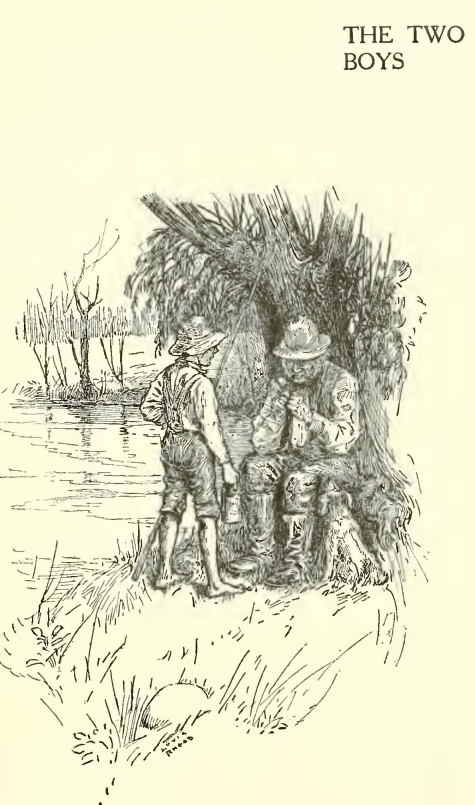
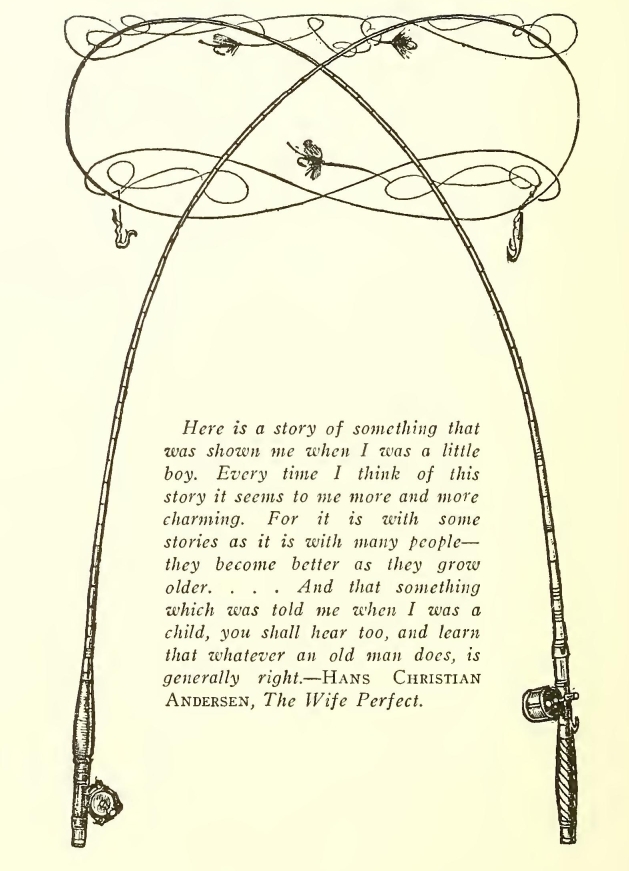
Here is a story of something that was shown me when I was a little boy. Every time I think of this story it seems to me more and more charming. For it is with some stories as it is with many people—they become better as they grow older.... And that something which was told me when I was a child, you shall hear too, and learn that whatever an old man does, is generally right.—Hans Christian Andersen, The Wife Perfect.
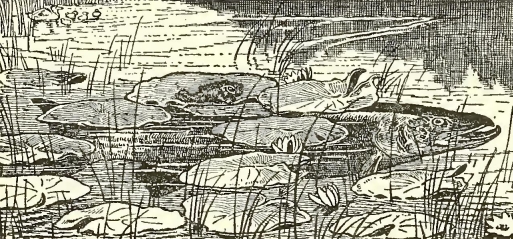
E may safely interpret a lowery day in haying time as a providential hint to go fishing. It did not require a strong hint of this kind to move grandfather, especially when the boy was around; for he not only loved to fish but he loved the boy who loved to fish, and was always planning something for his pleasure.
Why not stop for a moment just here to consider what sort of a grandfather a boy should have? Of course he must have white hair and a kindly face, but these are comparatively unimportant parts of his outfit. It is the disposition that counts. He must not have nerves. The peppery, irascible, impatient man, who growls and sputters on the least provocation, should never set up in business as a grandfather. In order to highest excellence he should keep the boy-spirit through all the experiences of life. The man who has entirely ceased to be a boy is disqualified.
This particular grandsire filled the bill completely. He never scolded, and never even grew tired of answering questions. When the little lad had reached the sled age, the cunning hands of his grandfather built him one that could easily distance all competitors. When skates had become an obsession, it was the same benefactor who invested his hard-earned money in the most wonderful pair that the boy had ever seen, and surreptitiously taught him to use them before the anxious mother knew anything about it. But the crowning day among all the many that these two spent together was that upon which the older boy taught the younger how to use a gun. The gun was a family heirloom, and tradition said that it had done duty in the Revolutionary War. The old flint lock had been removed and a percussion lock substituted; but the hammer refused to stay cocked. When it was fired, whatever might be the result to the object fired at, no uncertainty could be felt about the consequences to the firer; he was kicked certainly, promptly, and vigorously.
On an historic morning in the winter, when the grandfather was going into the woods to chop, he took the boy’s breath away by saying, “If you want to go with me to-day and take along the old shotgun, you may, possibly, shoot a squirrel.”
Will he go? If any boy reads these lines, let him answer. Gun over shoulder, and heart filled with infinite happiness, the boy trudges along the road, through the fields, and into the woods on the hillside, pouring forth a steady flow of talk. When the big beech, which the grandfather is turning into fire-wood, is reached, a council of war is held. Directions are given as to the proper way of handling a gun, and especially this one. “You’ll have to hold the hammer back with your thumb, and when you have taken good aim, let go.” Over and over again it is impressed upon the boy that under no circumstances is he to point the muzzle of the gun toward him.
While instructions are going on, a harsh call sounds from among the distant trees. The boy does not need to be told that it is the cry of the grey-squirrel, and with all the speed that caution will permit he hurries in the direction of the hidden challenger. Every now and then he stops to await a renewal of the cry, and then on again. Now the call is very near, almost directly overhead. Evidently it comes from somewhere high up in that great maple. For moments that seem hours he peers here and there among the leafless branches. At last the flirt of a grey tail catches his eye, and there, stretched along a limb near the top of the trees, lies the quarry. Up goes the long-barrelled gun, but the muzzle refuses to hold still. It describes circles and rectangles and zigzags, but persistently avoids the squirrel. Possibly it is too heavy for the slight muscles. Certainly the boy’s heart is beating a tattoo, and a severe attack of “squirrel fever” has him in its grip. Just as despair is completely overwhelming the lad, he sees a big log near by, and loses no time in getting behind it, with the gun resting upon it and pointing toward the tree-top. With this rest it is possible to keep the contraptious old gun still for a minute. Carefully he pulls back the hammer, takes a long sight over the barrel, and lets go. Have the heavens fallen and has the world come to an end? The gun bellows, and the boy turns a back-somersault in the snow, vaguely fancying that the entire universe has struck him. The squirrel is forgotten for a moment in the surprise caused by the back-action of the gun. But it is only for a moment, and then digging the snow out of his eyes, the boy peers anxiously up at the limb just occupied by the squirrel. It is empty. Has he missed him? Just when humiliation begins to creep into his heart he sees a grey heap on the snow, and sorrow turns to joy.
With gun over his shoulder and the squirrel hidden behind him, he takes the back trail, and soon rejoins the chopper. “I heard the gun go off,” says the old boy. “What did you shoot at?”
“A grey squirrel,” is the answer. “Missed him, eh?” This is the moment of supreme happiness, as the concealed game is brought to the front and the boy cries, “Missed him, did I? What do you think of that?” What amazement, simulated or real, appears on the older face! His surprise even surpasses the boy’s expectation. “Well! Well! If that isn’t a big one, and you killed him all by yourself! I’ll take his hide off when we get home and you shall have him for supper.”
It is more than probable that some dear people, if they have the patience to read thus far, will lay down the book in disgust, saying, “Cruel! Cruel! Boys should be taught never to take life unnecessarily.” The writer accepts their censure with all meekness, and assures them of his hearty sympathy. But he is writing of the boy in the open, the out-of-doors boy, the real boy, not of a becurled and anæmic male child, coddled and restrained and tutored until he is no more than a little manikin. And writing of the real boy as he has been, is, and evermore will be, it must be set down in all honesty that he loves the hunt.
But we have wandered a long way from that lowery day when grandfather said, “Boy, I can’t work in the hay-field today; what do you say to going over to the river fishing?” Now the boy had spent innumerable hours on the creek that flowed past the old farm-house, and had sought acquaintance with the bull-heads and horndace and eels for a mile in either direction, but the river he had fished only in his dreams. He had seen huge pickerel and giant perch which neighbours had exhibited as spoils from this wonderful stream, and in night visions he had walked along its banks and pulled out fish of enormous size and brilliant colouring. Now his dreams were to come true.
In the same valley with the river, and before it was reached, was the canal. Just below a lock, where the water looked to be infinitely deep to the boy, the grandfather stopped and said, “We will try it here for a while.” Nothing happened except that after feeling a tug at his line the boy pulled it in minus a hook. “Probably a turtle,” explains the elder: “Let’s go on to the river.” A quarter of a mile farther on and the shining river is reached, just where a dam had been many years before. Some of the logs remained, reaching out over the water, and upon these the two boys seated themselves and began to fish. Memory has failed to record all the incidents of that eventful day, but it has engraved the picture of the long string of fish which they carried home that night. The record is probably not any more accurate than some of which we read now-a-days, for it declares that this string was something over six feet long, and weighed at least a thousand pounds!
One experience of that day will not allow itself to be forgotten. The boy hooked a fish that put up an exceptionally vigorous fight, but was finally brought in. After it had been unhooked and was being exultantly inspected by the younger and exhibited for the admiration of the older boy, it gave a sudden wriggle, slipped through the hands of its captor, and fell back into the river. Woe of woes! For the time, life was not worth living. The biggest fish he had ever caught had gotten away! In spite of the most heroic efforts his chin began to quiver and then came a burst of tears. “Never mind,” said the older boy, “you’ll catch another just as good.”
That day and that particular event came back with startling distinctness more than thirty years later, and on the banks of the far-famed Nepigon. The boy had long since come to be a man, and was camped with two congenial friends at the lower end of “Pine Portage.” There had been long days of ideal trout-fishing and nights filled with refreshing sleep. One day an old man—apparently near to the Psalmist’s limit of years—with his son in the prime of life, came up the river with their Indian guides and stopped for a few hours to try the Pine Portage pool. While the younger man fished from the canoe, the father stood upon a rock that jutted out into the river and began casting. It was not long before he hooked a fish which gave every indication of being a big one. The old man fought him well. The son stopped in his casting to look on, and the campers came down to the shore to watch the battle. Out of the depths the gallant fish flung himself clear of the water, and then all saw that he was of unusual size. The son hastened to the shore and offered to take the rod and finish the contest, but the old man refused. A half-hour passed, and then the tired fish began to show signs of yielding and the fisherman already saw himself the proud captor of a six-pound trout, when—it was all over. Was there a flaw in the line? Had the aged sportsman inadvertently dropped the tip of his rod until the fish had a straight-away pull upon the reel? No matter what the cause, the line had parted under the last surge of the fish, and he was lost. For a moment the old face worked strangely, and then down went the white head, face in his hands, and we saw the shaking body as he sobbed out his disappointment Then the son laid his hand upon the senior’s shoulder and we heard him say, “Never mind, father, you’ll catch another just as good.” Ten and eighty are not far apart when we go fishing.
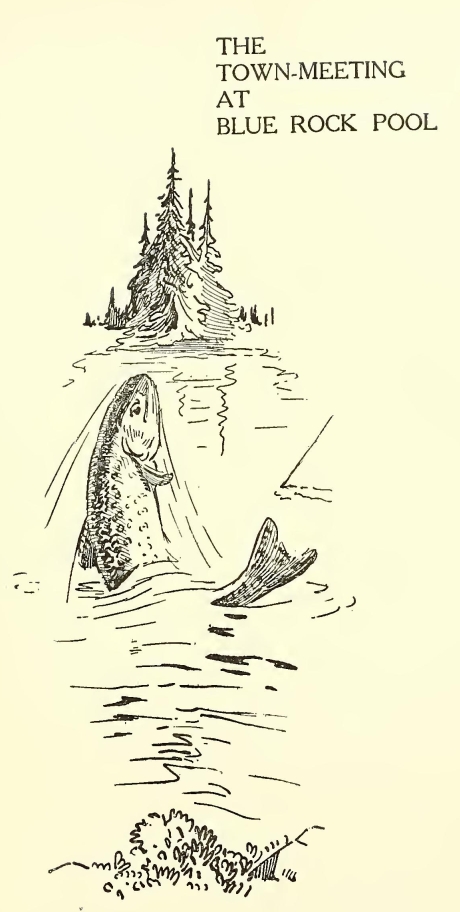
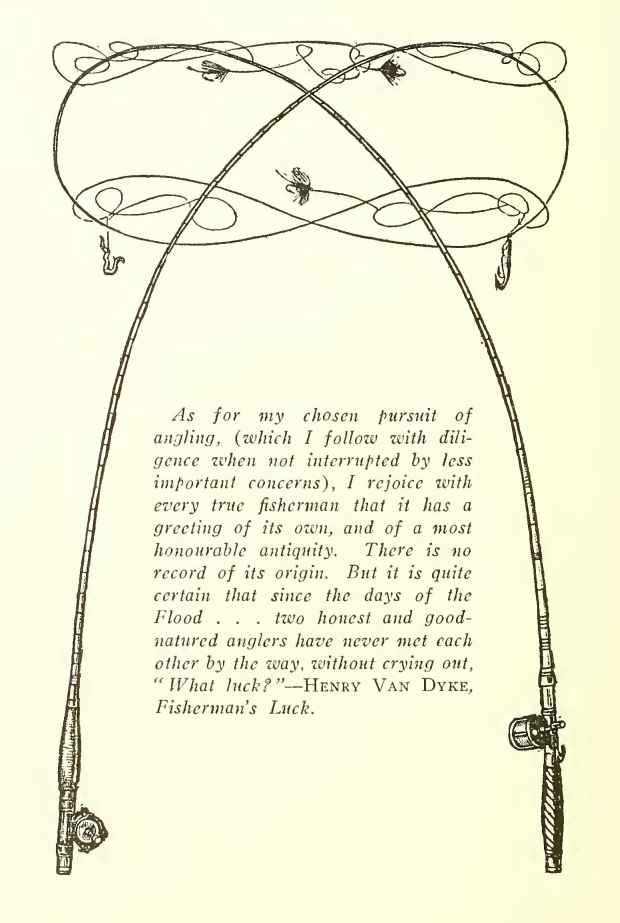
As for my chosen pursuit of angling, (which I follow with diligence when not interrupted by less important concerns), I rejoice with every true fisherman that it has a greeting of its own, and of a most honourable antiquity. There is no record of its origin. But it is quite certain that since the days of the Flood... two honest and good-natured anglers have never met each other by the way, without crying out, “What luck?”—Henry Van Dyke, Fisherman’s Luck.
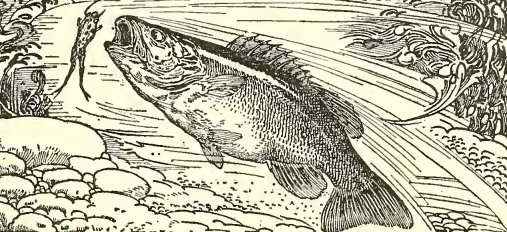
IDN’T know that fish held town-meetings? That shows how your education has been neglected. A town-meeting is an assembly; fish assemble; therefore, fish hold town-meetings. Isn’t that conclusive? But the fact is one of experience as well as of logical deduction. It can be “mediated” by the faith of every disciple of the immortal Izaak.
This is the unadorned and veracious account of one of these piscatorial gatherings, held on an August day in Caine River, New Brunswick, seventeen miles from the nearest house. They had been gathering for days. Prominent citizens were there from Big Rock, five miles down the river, and almost every inhabitant of the Forks, three miles up stream, had answered to roll-call. A large number of youngsters who had lately taken up their abode in Blue Rock Brook seemed to think that this was some sort of circus, and had to be nipped into order by their more sedate seniors.
The main business on hand was to provide for the “summer schools” which had won a deserved reputation for excellence long before the University of Chicago opened its doors. It was customary, also, to elect a path-master at this time, that the highways might be looked after and kept free from grass. The Hon. S. Maximus Fontaine, political boss of Troutopolis, had things well in hand, and it was generally admitted that his slate would go through without a hitch.
No wonder that the beauty-loving trout came from far and from near to this place of assembly. If the truth must be told a majority cared less about the election than they did for the climate. Search the country over and you could not find a more charming spot. Just where a great clump of white birches made a whispering place for the wind, Blue Rock Brook came gurgling down into the river. Its source was a great spring back among the hills, and all along its course other springs gave of their best to keep its waters cool and sweet. From start to finish it was uncontaminated. When, at last, it found the river, it rested for a little in a big, clear pool, before giving of its freshness to the warmer waters of the larger stream. Just here, with clean gravel underneath and the nodding birches casting their shadows overhead, enswathed in a delicious coolness that defied the heat of the August sun, were gathered the clans on the day of which we write. It was here that they were deceived, betrayed, undone by a stony-hearted Preacher who had journeyed far to be present at this meeting. But that suggests backing up and starting over again in order to get the Preacher to this lonely spot.
How did he find the town-meeting? That is a long story and must be compressed if told at all. It would take more time than we have at our command to describe the mighty struggle through which the Preacher passed in wrenching himself away from the seductive stockyards’ odours of Chicago. He succeeded, however, and went meandering through New York State and Massachusetts, finally taking passage on a venerable tub that crawls—in fair weather—between Boston and Yarmouth. There was a vague idea haunting the ministerial mind that he wanted to see the Evangeline country; but that infant persuasion died suddenly in Digby. If any American tourist wants to see Nova Scotia let him keep away from Digby or put it last on his list. For fascination it discounts the Lorelei. All right-minded people (that means those who love to sail and fish) are charmed with this little town.
If we had not set out to tell how the Preacher broke up that Blue Rock town-meeting, we should stop right here and relate one or two mild stories about the fishing at Digby. Did you ever catch pollock that were run by ninety-horse-power steam engines? Pollock that would strike so hard that they dislocated the fisherman’s shoulders when he tried to check them up a bit? Did you ever catch a codfish weighing two hundred and seventy pounds? Now this is not about pollock or codfish, and it is just possible that one figure ought to be taken off the weight of that cod. Do not ask that we tell about the day’s fishing on the Bay of Fundy, for we must not do it. We “could a tale unfold,” but it shall not be unfolded here lest we never get to that town-meeting.
It was at the supper table in a Fredericton hotel that the existence of Blue Rock Pool first became known to the Preacher. He had opened his heart to the whole company and begged of them information concerning the trout fishing in that locality. One guest said that by driving out to the northeast four miles trout could be gotten in limited numbers and of small proportions. Another suggested going up the St. John’s River some ten miles. There was much talk of what had been done in time past, and much regret expressed that the Preacher had not come in June or waited until later. The time was very unfavourable—it always is. Under such consolation the mercury in the ministerial thermometer sank out of sight. When supper was over and the Preacher was leaving the table, a small man who had not said a word during the entire meal took the discouraged dominie to one side and said:
“If you are willing to make a trip of some sixty or seventy miles and camp out one night, I can tell you of a place where you can get some trout.”
“But,” said the Preacher, “I have no tent or blankets or duffle of any kind.”
“I’ll see to all that,” replied the little man; “I have everything that you will need, and it is yours to use.”
What a lot of good fellows there are in the world, and the majority of them love to fish. Here was a man putting his precious outfit at the disposal of an utter stranger, with no thought of reward or desire for it, simply to show a kindness to a brother devotee of the gentle art. And the little man proved to be a tailor. Now it has been said that it takes nine tailors to make a man; but you could have made nine average men out of that tailor and there would have been material left to patch the rest of the race. He gave the Preacher the name of a man who could be secured as a guide, helped him make out a list of eatables, brought over his caribou blanket, tent, dishes, etc., and bright and early the next morning the train going north carried a passenger bound for Blue Rock Pool.
Did you ever notice with what reluctance the average vehicle of transportation moves when it has a fisherman on board? If you use a horse, he’ll go to sleep; an auto is sure to throw a fit, and a railway train almost invariably stops and goes backward for a good share of the time. It looks as if there existed some sort of a “combine” to prevent the fisherman from making connections with the place where he knows bliss is waiting for him. It took the train six hours to go fifty miles! They called it an “accommodation”; but by the way that fisherman growled you could see that he did not realize that he was being accommodated. He did finally get to Doaktown, where his guide lived, and found the aforesaid gentleman waiting for him at the station in response to a telegram sent the night before. His name was George—at least it ought to have been—and he was a clean-looking, husky fellow about thirty-five years of age. Close at hand was Bucephalus adjusted to a buckboard. (Bucephalus was the prancing steed which had consented to haul us to Caine River.) He was not handsome except in behaviour; in that he was a beauty. Habakkuk had evidently not seen Bucephalus when he wrote: “Their horses are swifter than the leopard.” The duffle was piled on behind the seat, a bag of oats was given the place of honour on top of the duffie, and Bucephalus, gently and with infinite caution, began to move. A sense of security took possession of the Preacher’s soul with the first step that that horse took. There was something dignified and assuring about his movements that left the mind absolutely free to reflect upon the beauties of nature, untroubled by any fear of personal injury. About a mile out of Doaktown on the road to Caine River was a little hill. Bravely Bucephalus tackled it, stopping not more than twice each rod to give his passengers time to drink in the beauties of the scenery. It was during this period of hill-climbing, with its attendant spaces of quiet, that George began his wary approach towards getting acquainted with the Preacher.
George: “Where do you live?”
Preacher: “Chicago.”
George: “What might your business be?”
Preacher: “I’m a Preacher.”
Thereupon George’s lower jaw dropped until it almost seemed to rest upon the dashboard, while he rolled a skeptical eye towards his seat-mate. Being convinced after prolonged scrutiny that the truth had been told, he relapsed into silence, broken at last by the remark, “I’ll bet you ain’t a Baptist Preacher.”
When his bet was promptly taken, he brought the interview to a close by saying, “You must git a mighty sight more pay than our preacher or you’d never got so far from home.”
For some time as Bucephalus jogged along through the woods George was evidently depressed. He may have been reflecting upon certain emphatic remarks addressed to Bucephalus earlier in the journey, or, possibly, he was wondering how he could sneak out of his job. It was evident that he had not reckoned on piloting a body of divinity on a fishing trip and was somewhat dubious as to the prospect.
The road ended in Caine River, and for the five miles farther to Blue Rock Pool there was nothing for it but to take to the bed of the stream. It reminded one of driving over the cobble-stone pavements of Albany, New York, only not quite so much so. The Swedish movement which undertakes to joggle you all over is not in it for efficiency with such a ride. If there is any part of the anatomy that is unmoved by this wiggle and joggle it must be in the domain of the “subliminal self.” When within sight of the destination it was found that the Preacher’s suit-case, in which he had a change of underclothing, reel, flies, etc., had become discouraged and dropped off. It was found a mile down stream, resting against a rock, with not a thing wet. “I’ll set up the tent and git supper while you go after ‘em,” said George, an arrangement to which the Preacher promptly agreed. The bamboo rod was put together, leader and flies selected, and, just as the sun was touching the tree-tops on the west bank of the river, the Preacher intruded upon the town-meeting. Hon. S. Maximus Fontaine had just concluded a deal by which everything was to go his way, when a strange and gaudy insect alighted upon the surface of the pool and went wiggling toward the shore. There was a wild and unseemly scramble, but the honourable wire-puller had his own notions of precedence and, cuffing some of the smaller fry out of his way and frightening off others by the glare of his eye, he proceeded to make that tid-bit his own. No sooner had he closed his jaws upon the coveted dainty than he was sorry, for there was evidently “a string to it” and that string kept steadily tugging at his mouth. Much as he believed in “pulls” he did not enjoy this one, and tried to part with it. He cavorted about among his astonished fellow-townsmen, flung himself out of the water, darted towards a well-known root that had succoured him once before in a like experience, but still that firm persuasion at work upon his mouth would not let up and, at last, he gave ground and was guided out into the river.
Out in the stream, thirty or forty feet from the pool, stood the Preacher engineering this performance. To say that he was nervous is a mild statement. He was scared. It had occurred to him just after that battle had begun that his landing net was at the camp, and here was a big, big trout to be taken care of. A six-ounce bamboo rod does not lend itself to the derrick act by which you lift the fish out of the water by main force and throw him over your head, landing him some eighty rods away. It would not do to try tiring out the old warrior in the pool, for by the time that was accomplished all of his comrades would be in a state of mind that would effectually prevent any further levy upon them. So out in the river that fish must come while the fisherman takes his chances. It was a long, hard fight, carried on a good part of the time in swift water where the chances for the fish’s escape were excellent; but at last, tired out and helpless, he was led into the still and shallow water near the shore. There, just as the fisherman was reaching down for him, the old politician gave a last lunge that snapped the snood, and he was free; but before he could gather strength to swim away the Preacher lay down on him, and the days of Hon. S. Maximus Fontaine were numbered.
A new fly was fastened to the leader, and the disturbed citizens were invited to interview it. A half-dozen, so small that they did not know any better, were gathered in by the Preacher in one-two-three order. Then came a tug that meant business, and the Preacher began kicking himself for forgetting that landing net. It seems that a big politician from the Miramichi had come up to see how Hon. S. Maximus managed things, and as he had seen his friend tackle that first strange insect and disappear, he concluded that this was the proper thing to do. He followed his friend to the basket of the Preacher, but not until he had indulged in some contortions that nearly gave the sportsman nervous prostration.
By this time the shadows had thickened and George was yelling: “Supper’s ready.” He was mistaken. It took about fifteen minutes to dress and fry those half-dozen small trout—not one under half a pound—and while they were cooking the Preacher weighed his prizes. Hon. S. Maximus came within two ounces, and his friend within four ounces of four pounds. Did you ever take a four-pound trout, or even a three-pounder, on a light rod? Then you know how self-satisfied that Preacher was.
The tent had been pitched on a little plateau some fifteen feet above the river. It was nine o’clock when supper was finished and the dishes washed, horse picketed and everything made ready for the night. The caribou skin was laid on the bed of boughs, the blankets made ready for cover, and George and the Preacher “retired.” The campfire shone out against the dark background of the wooded hills, the river sung a lullaby, and George told a story about a moose that he had killed the previous winter not more than forty rods from the spot where they were lying, and—when the Preacher waked he was freezing. The fire had gone out, it was nearly daybreak, and those blankets seemed made of gauze. He had no inordinate affection for George under normal conditions, but now he rolled over and clasped him to his heart. George seemed to have lost his fear of the Preacher, and for the remainder of the night each tried to use the other as a stove. Each failed of absolute success.
It is evident that the teller of this story has violated one of the fundamental rules of homiletics, and made his porch too large for the house. There remains a whole forenoon of fishing to be disposed of and no time to tell about it. But if we had unlimited space at our command, who could fittingly describe even an hour of successful dalliance with the festive trout?
There were no more of the size of the political boss and his friend; but how they came! Something over fifty trout preferred the Preacher to the town-meeting, and when noon came that meeting had adjourned sine die—especially die. Some were eaten for dinner, some were on the table at the Doaktown hotel that night, George had what he wanted, and twenty-one went back with the proud Preacher to Fredericton the next morning.
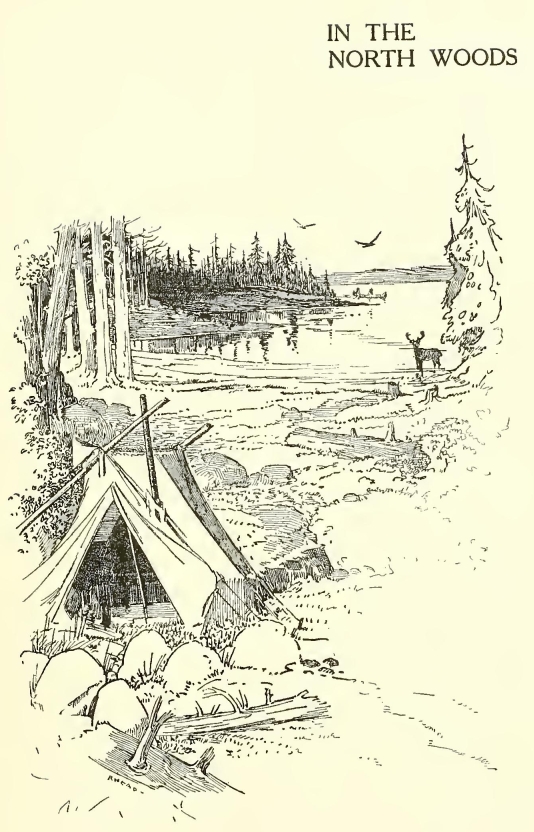
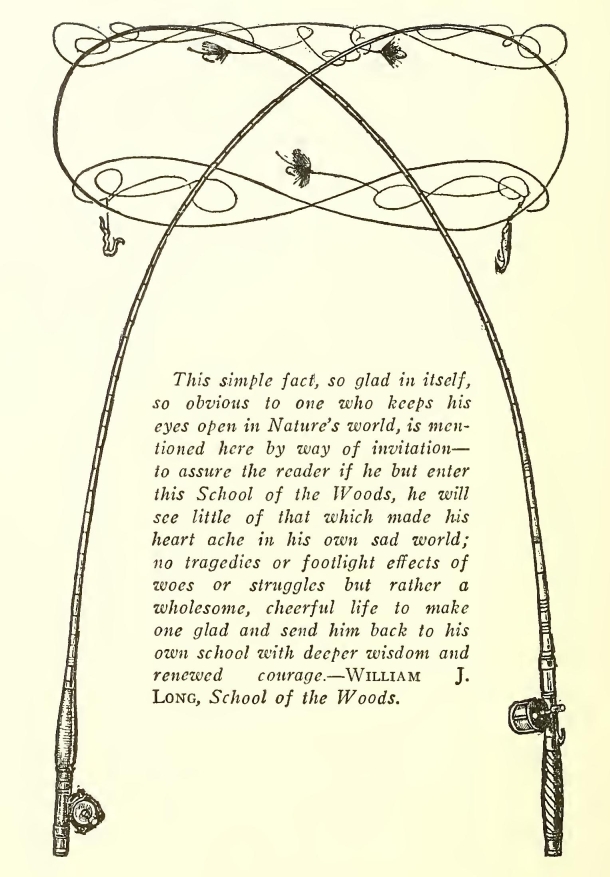
This simple fact, so glad in itself, so obvious to one who keeps his eyes open in Nature’s world, is mentioned here by way of invitation—to assure the reader if he but enter this School of the Woods, he will see little of that which made his heart ache in his own sad world; no tragedies or footlight effects of woes or struggles but rather a wholesome, cheerful life to make one glad and send him back to his own school with deeper wisdom and renewed courage.—William J. Long, School of the Woods.
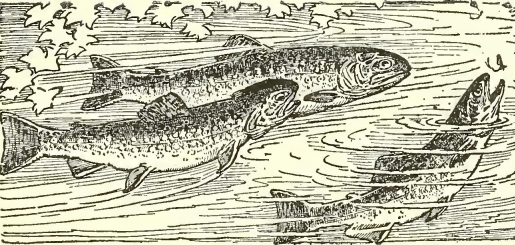
TOP a minute!”
It was the frightful jolt as one of the wheels of the wagon struck a high boulder and then went down to the hub in a mud-hole that called forth this plaintive request.
“I’ll get out and walk!”
The cry came from one, but we made it unanimous with great alacrity. We were making our way in a lumber wagon from the railway station to Otter Lake. The driver said it was only ten miles to our destination, and for the first hour we were comparatively hilarious; then we struck the woods and trouble began. It was growing dark, and stumps and stones and sink-holes could not be seen and so were taken as they came. The wagon rose upon some obstruction to come down with a jar that seemed to loosen every joint in the body.
A little of this was quite enough, and the party made the last part of the trip on foot, tripping and stumbling through the darkness until, after what seemed an interminable time, the lights of the cabin flashed out through the trees. We were in no condition to be curious as to our surroundings that night and, after a supper of fried trout, were glad to tumble into bed. The remark of one of the boys of the family that the “old man” was away, did not seem to possess much significance until later on when we learned that he was serving time in the county jail for shooting deer out of season.
In the sunshine of the next morning we saw our surroundings clearly for the first time. A little clearing of a couple of acres on the lake shore, a rough log cabin with a rougher barn, a beautiful little lake guarded on the east and south by high hills timbered to their summits,—what more could the seeker after rest and recreation ask? Otter Lake is too small to be entitled to a place on the average map of New York, but it lies north of the Mohawk River and east of the railway running from Utica to Clayton. It is not far enough east to be considered as in the Adirondacks, and the section is familiarly known as the “North Woods.” An alternative term is “John Brown’s Tract,” as the hero of Ossawatomie at one time owned hundreds, if not thousands of acres of land in this locality, and cherished ambitious plans for a colony.
The party was made up of the Doctor, the Hardware Man, Frank, Jim, the Boy and the Preacher. Poor Jim! He could ill afford the expense of the outing, but he “felt all played out,” as he expressed it, and the physician had ordered him from behind the counter to the woods. Every day he cheerfully assured us that he was feeling better, and every day he grew thinner and his breathing more difficult. He was in the beginning of a fight which was to go on for a couple of years longer; then he gave up the battle and lay down to rest.
We had come prepared to camp out, and immediate preparations were made for realizing this ambition. The guide proposed Independence River as a favourable point and, as we knew nothing of that or any other part of the country, we acted upon his suggestion, especially as he had told marvellous tales of the Independence River trout. It was not a long or hard tramp to the place where we struck the river and pitched the tent. The sun was shining, the air was soft and warm, and the Hardware Man was running over with enthusiasm. As we made ready for the night, with a big fire blazing in front of the open tent, he remarked, “I’ve looked forward to this hour from my boyhood.” Whereas the more experienced members of the party pulled on extra sweaters for the night, the Hardware Man proceeded to disrobe as if he were in his house in Harlem. When some one suggested that he might feel the need of this clothing before morning, he exhibited his sleeping bag made of blankets and assured us that this would be quite sufficient. Just before dawn the next morning, when the camp-fire had gone out and a penetrating chill was in the air, some of the party were awakened by the movements of the Hardware Man. He crawled out of his sleeping bag, arrayed himself in his discarded garments, and when asked what was the trouble declared, “I’m freezing. One night of this is more than enough. My ambition is satisfied.”
That day was devoted to the alleged trout of Independence River. From what the guide had told us we had supposed that two-pounders were impatiently waiting to be caught. We fished all day and averaged half a trout apiece. Six ardent fishermen managed to capture three trout, not all of which would weigh two pounds. Evidently something was wrong. Fortunately, explanations abound when fish refuse to bite. It is too early or too late in the season. We haven’t the proper bait. It is too warm or too cold. They were taking everything offered last week, or they will begin biting next week. This time the fish had left the stream and were gathered on the “spring-holes,” so the guide assures us, and we do not question his pronunciamento. The trouble was that we couldn’t find any spring-holes. One thing the Preacher did find for which he was not looking; namely, a narrow escape from being shot. He had made a short cut through the underbrush to strike the river higher up, and as he came out upon the border of the stream found himself looking into the muzzle of a gun. A party coming down the river in a boat had heard the crashing in the woods and, of course, thought of deer. All that saved the Preacher was the fact that the man with the gun did not belong to that group of invincible idiots who shoot at a noise or at an unidentified moving object. A week later, in a camp three miles away, a young man was shot and instantly killed by his camp-mate who saw something moving in the bushes and fired on the chance of its being a deer. At the close of the day the Hardware Man presented numerous and cogent reasons why we should not spend another night in camp, and just before sundown we struck the trail back to the cabin.
After that we were content to make daily excursions, returning to the cabin at night. Camp life is delightful when proper provision has been made for comfort; otherwise, it is a delusion and a snare. We had not outfitted as we should, and our guide either did not know how to make good our deficiencies or was too lazy to undertake the job. There is a deal of poetry about tent-dwelling, and not infrequently that is all. It is possible to have a tent that will not leak, pitched so that a heavy rain will not turn your sleeping place into a pond; a bough-bed so constructed that the boughs do not poke you in the ribs all night; a commissary department that allows some little variety in the bill of fare and a cook who can at least boil potatoes. This, we say, is possible, and these desirable features are sometimes actualities. When they are, life is “one grand, sweet song.” But there are worse experiences than returning after a day’s tramp, tired and hungry, to find awaiting you an easy chair, a well-cooked meal and a comfortable bed under the shelter of a roof.
This outing was in the days before “jacking for deer” had become not only illegal but entirely unethical. The Preacher and Frank, with the guide, tramped one afternoon to a little lake some four miles away for the purpose of floating for deer that night. As it is useless to go on such a quest when the moon is in the sky, and that luminary had fixed upon ten o’clock as the hour for retiring that night, a fire was kindled on the hill-side, well back from the water, and the hunters waited upon the slow setting of the moon. Many questions of more or less importance were discussed and, at last, Frank said to the Preacher,
“Have you ever read ‘Robert Elsmere’?”
“Yes,” answered the Preacher. “Why do you ask?”
“Well, Pastor ———— advised me not to read it. He said he had preached on the book twice, and he had never read it.”
The Preacher chuckled and then roared, until the guide growled, “You’ll scare all the deer out of the lake and over the mountain if you make so much noise.” Possibly it was the Preacher’s vociferous hilarity that explains why we “jacked” around the shores of the lake that night for two hours without sighting anything more animated than a dead stump. The Preacher was comparatively young then and had not learned that the less we know about a matter the more unrestrained and cocksure we may be in discussing it.
Not a few experiences are more amusing when considered in retrospect than at the time when they are going forward. When the guide proposed to the Preacher that they visit a little lake a couple of miles from the cabin, try for trout at sundown and then float for deer when darkness had fallen, the proposition was greeted with applause. Although the trail was not an easy one, the guide carried a canoe on his shoulders and the Preacher trudged on behind with the guns and rods, his mind filled with alluring visions of mighty trout and at least one big buck. When the lake was reached and it came time to joint the rods, it was discovered that the reels and lines had been forgotten. The fly-book, with its gaudy contents, was in the Preacher’s pocket, but neither of the two felt competent to do any successful fishing without a line. It would be dark before the trip to camp and back could be made and, reluctantly, the fishing part of the trip was abandoned. That night there was no moon to compel them to wait upon its slow movements, and as soon as darkness had fallen the “jack” was lighted and the slow circling of the lake began. About two-thirds of the way around, the guide stopped paddling, then gave the canoe a little twist so that the bow pointed towards shore, and the Preacher felt the slight shaking of the canoe agreed upon as the signal to shoot. Shoot at what? He could see nothing.
A whisper came from the guide—“Shoot!”
“Where?” was wafted back from the half-paralyzed lips of the Preacher.
“There at the edge of the lily-pads, just a little to your left.” Did the Preacher see the dim outline of a form? He does not know to this day, but he shot as he was commanded. A mighty snort answered the shot, then splashing of water and breaking of limbs, and the guide announced, “You missed him.” The assertion was entirely gratuitous. In fact, the Preacher had not expected to hit what he could not see.
Just about that time a thunder-cloud in the west became so threatening that the guide proposed that they go on shore and get under shelter. That sounded good, but it was not just clear to the passenger where the shelter was to be found. However, the mystery was solved when the guide pulled the canoe to a dry spot on shore, turned it upside down, and both crept under it as the first big drops of rain came pelting down. Just as the Preacher was congratulating himself upon their good fortune, the dulcet note of a mosquito sounded in his ears. He promptly slapped, and then kept on slapping. The singer was the advance guard of an innumerable host. All of the tribe between Paul Smith’s and Lowville had evidently gathered to the feast. To make a bad matter the worst possible, the quarters were exceedingly cramped. One could not well roll over without rolling from under the canoe. The omnipresent root was persistently punching the Preacher’s ribs. To lift his sufferings to the nth power, that guide went to sleep and actually snored. It would have been a satisfaction to have companionship in suffering, but now this was denied him. Was it only four hours? It seemed like four eternities before the guide decided that they ought to start for the cabin. The storm had passed, but every bush showered quarts of water at the slightest touch. Just where the advantage lies in keeping dry from the storm, only to get soaked to the skin from tramping through miles of wet underbrush, is not yet quite clear. At two o’clock in the morning the cabin was reached, sans trout, sans deer, but not sans mosquito bites or a thorough drenching.
What a day that was which the Doctor and the Preacher spent on the East Fork! The lake is fed by two streams, one flowing in from the southeast and the other from the southwest. By a trail the eastern branch could be struck well up towards its source, and from this point down to the lake furnished just about the right distance for a day’s fishing. Bright and early the start was made, with plenty of bread and butter, a skillet, and a supply of fat, salt pork. The fisherman who could not be happy on such a stream, on such a day, whether the fish would bite or not, listening to the laughter of the water, watching the flickers of sunshine strained through the meshes of the trees, drinking in the sweet, pure air, in close touch with nature, is a hopeless pessimist. Fishing side by side, sometimes one and then the other going first, the friends loitered down that beautiful stream while “not a wave of trouble rolled across their peaceful breasts.” Now and then an exceptionally fine trout was taken, and then fishing was suspended while they examined and exclaimed over it. They wondered again, as they had often done before, why some of the fish should be red of fin and belly and with yellow meat, while others had the greyish-white fin and belly, with white meat. The Preacher caught two trout from under the same log, one with blood-red fins and golden flesh, the other white. They were both speckled trout, lived side by side, ate the same food, but differed as greatly as a red-headed boy and an albino.
At noon, where the waters of a cold spring bubbled out of the bank, a fire was made, the fat pork set to sizzling in the skillet and then—but what’s the use? Trout fresh from the brook, fried over a fire in the open and eaten with an appetite engendered by hours of tramping and wading, make a dish for the adequate description of which words are impotent. Of course, the smaller trout were chosen for the mid-day meal, not alone that the catch might look better when exhibited that night, but because they tasted better than the larger ones. How many did we eat? Ask the Doctor! Who should understand the proper amount of food to be taken into the stomach at a single meal, if not one of his profession?
An hour or so for luncheon and chatting, and then into the stream again and on our way towards its mouth. The creels were getting heavy, and the Doctor decided to take a short cut for the lake shore. Just before starting, the two were standing near together fishing a pool, when the Doctor, taking a forward step, slipped on a smooth stone and began falling. The process was the most slow, deliberate, and altogether comical the Preacher ever witnessed. As he began losing his balance and tipping over backwards, he made frantic efforts to regain his poise. Both hands waving in the air, one clutching his rod, eyes popping out of his head, a look of mingled surprise and disgust illuminating his manly face, the final, mighty splash as the stream yielded to the impact of his body, formed a most delightful picture for his sympathetic and sorrowing comrade. Strangely enough, the Doctor could not see the humour of the situation, and if he should ever deign to read this truthful record it is doubtful if he cracks a smile.
Thoroughly drenched, the Doctor’s previous determination to take a short-cut home was much strengthened. He struck off into the woods and the Preacher was left alone to follow the stream. When he had reached the cabin the Doctor had not arrived. When it was almost sundown and no Doctor, the guide started out in search of him. According to later reports the Doctor was found in a depressed state of mind playing hide-and-go-seek with the trees in a tamarack swamp. The guide declared that he knew where they were all of the time—a most credible statement. They were in a tamarack swamp. It was well towards nine o’clock when they arrived at camp, and it took a hot supper to restore their normal good spirits.
The guide had frequently descanted upon the excellence of the fishing on “Lost Creek”; but as that stream was seven miles away, and no trail led to it, members of the party had not shown great eagerness to make the trip. But when the lake and near-by streams had become familiar through frequent visits, the Doctor, the Boy and the Preacher decided upon an excursion to “Lost Creek.” After crossing the lake, the guide plunged into what seemed an impenetrable jungle, and steadily led the way up and over the hill, through dense thickets showing no sign of ever having been traversed before. He never seemed to hesitate which way to go, and his confidence was inexplicable to those who followed until he pointed to a tree that had been “blazed,” then to another in the distance. He was not guessing or travelling by compass, but following a “blazed trail.”
The first sight of the stream was disappointing not to say disheartening. Here was no dashing brook dancing its way along, but seemingly dead water in a great stretch of marsh land. The guide called it a “beaver-meadow,” although we saw no signs of the animal or of its architectural activities. But there were trout, as we soon proved. Pushing along through the marsh grass, frequent catches of good-sized fish were made, until at last the Preacher had a notable experience, not only for that day, but for any he ever spent in fishing. The Doctor was fishing ahead, and as he vacated a dry hummock, having taken two trout from that point of vantage, his friend stepped into the same spot. The first cast brought a trout, as did the second and the third and so on until he had taken sixty fine fish without stirring from his tracks. And they all came from the same point in the stream. The lure fell in vain three feet away from this particular spot. They were not fingerlings, but ten-inch and twelve-inch fellows. The Preacher’s creel and his pockets were full when the guide and the Doctor, returning along the creek, came upon him. The guide’s explanation was that the fortunate Preacher happened in his first cast to strike a “pot-hole,” a depression in the bed of the creek, where the water was cool and in which the trout gathered in great numbers. The explanation mattered little to the Preacher; it was the fact that counted. Even now he would gladly give two old sermons to be permitted to stand again on the banks of “Lost Creek” if he were sure of locating that “pot-hole.”
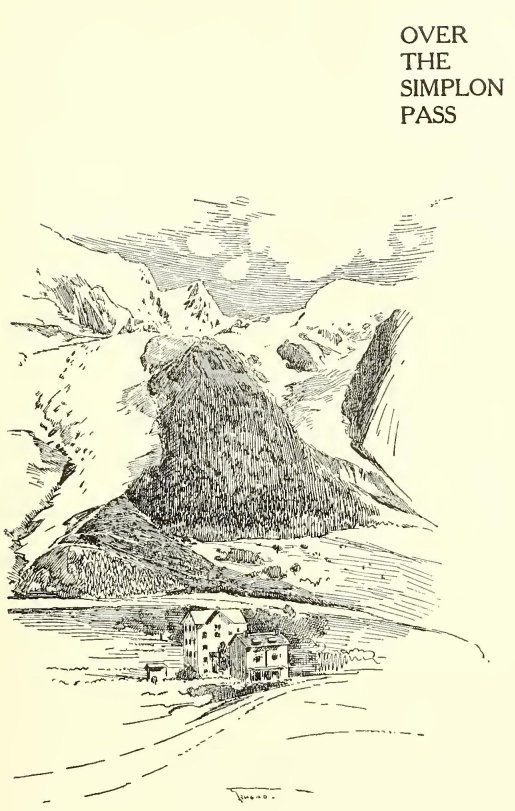
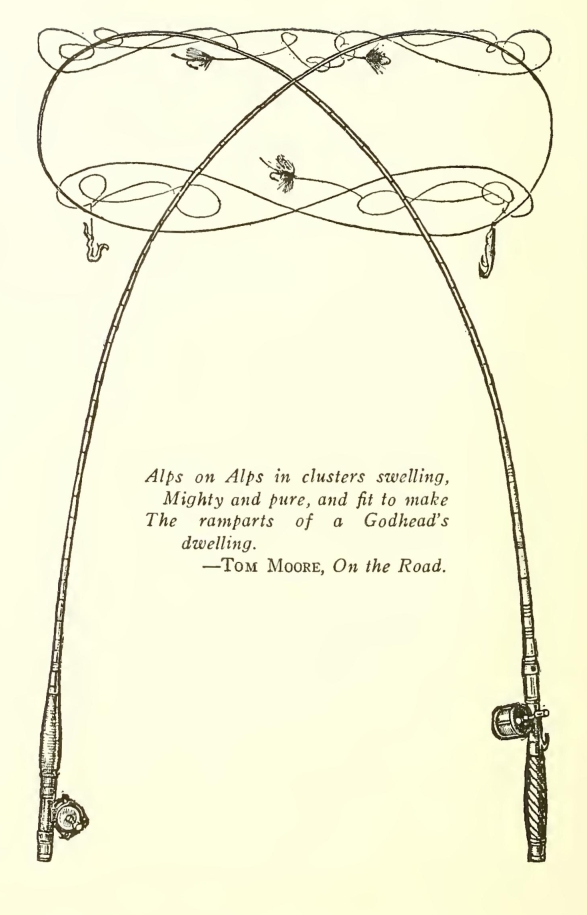
Alps on Alps in clusters swelling,
Mighty and pure, and fit to make
The ramparts of a Godhead’s
dwelling.
—Tom Moore, On the Road.
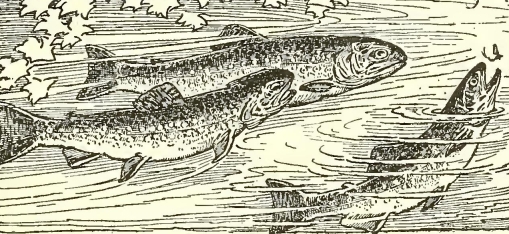
E agreed, my wife and I, that the couple whom we saw for the first time in the post-office at Domo d’Ossoli and a little later met in the gathering room at the hotel, would be well worth knowing. They were, evidently, not only husband and wife, but good chums, thoroughly congenial, and rejoicing in each other’s companionship. That they were intelligent no one could doubt, and they radiated kindliness and courtesy. They were dressed for roughing it, and we were prepared for the remark of the gentleman, made to a by-stander, that they had been spending a week in mountain climbing in the neighbourhood. When he added that they would cross into the Rhone Valley by diligence on the morrow, we were conscious of a distinctly pleasant sensation at the thought that, for one day at least, they were to be our fellow-travellers.
The table d’hôte that evening gave us the desired opportunity to cultivate the acquaintance of the attractive strangers, for they were seated directly across the table from us.
“Going over the Simplon tomorrow?” I venture to ask the gentleman. “Yes.”—Dead pause! “I am sure that you enjoy Italy,” is our next effort to make conversation. “Yes,” a pause even more absolutely dead than the preceding one. What’s the matter? Do they take us for pickpockets? We furtively examine our attire to see if we are looking especially dowdy, but can discover nothing very reprehensible. Possibly they are diffident, so here goes for another attempt:
“Do you know at what time we start in the morning?” Of course we know, have known for weeks; but it is a question whose answer offers good-sized opportunities for something more than a monosyllable.
“Six-thirty.” We wait anxiously, but that is all. Even the most obtuse individual must come to the conclusion that the questioner is being snubbed; quite courteously, but also very unmistakably snubbed. Our American blood begins to boil gently, and a solemn vow is registered then and there to let these attractive but unfriendly people severely alone. Meanwhile, they have been chatting with each other in some unfamiliar language which is not Italian or French or German.
When we leave the hotel the next morning for the all-day ride over the Alps our unresponsive fellow-travellers are in the banquette at the extreme rear end of the diligence, while we occupy the coupé directly under the driver’s seat. We could not speak to them if we would, and would not if we could. Indeed, they are soon forgotten in the joy of the hour. The deep blue of the Italian sky unflecked by a cloud, the broad, smooth highway, the cottages with their tiny patches of cultivated land, the exhilarating morning air and the rattling pace at which we bowl along for the first mile or more, would help us to ignore even a greater unhappiness than that caused by the snubbing of the previous evening.
Now we have left the level road and begin the long and tortuous climb towards the summit of the Simplon Pass. Again and again we cross the brawling stream with which the road disputes the right of way. The bridges are all of solid stone. Yonder, to the left, the mountains rise in great ridges and piles of raw rock, while on the right a more gentle slope is covered with grass and shrubs. We begin to count the waterfalls, threads of spun silver hung against the dark background of the rocks, but soon lose track of the count. On the heights the snow is lying, and by the roadside the wild flowers blossom in profusion. What a glory of flowers we find on these Alpine heights! In every meadow and pasture lot red and yellow and blue and purple, with many indescribable shades, delight the eye and the heart of the traveller. The rhododendron, with its brilliant colouring, is everywhere, and the little forget-me-not nods to every passerby. Up and still up we climb, and every turn of the road brings new exclamations of delight as the wonderful panorama of mountain and valley unfolds before us.
But now we have reached the summit, and the tired horses are brought to a halt in front of the little hotel where we are to have our mid-day meal. The village is a tiny one, of a dozen houses or so. The hotel does not look especially attractive, and the meal is even less appetizing than the appearance of the building has led us to expect. For once in our life we refuse chicken—at least we are content with one mouthful. Without attempting to file a bill of particulars, it is enough to say that the interval between the death of that bird and its appearance on the table as food has been unduly prolonged. With absolute unanimity the guests abjure chicken, for that meal at least. The food is so sublimely bad that every one laughs, and even our foreign friends who refused to respond to our advances of the previous evening join in the merriment. Somehow, during the course of the meal, we are led to speak of our nationality, and then comes the revelation.
“Americans?” cries the hitherto unfriendly foreigner. “Americans?” echoes his wife, who up to this time had not been supposed to understand a word of English. The mystery is solved. This gentleman and his wife are Hollanders and have taken us for English. It is at the time when the English-Boer war is at its height, and the Hollander has no dealings with the Englishman if he can help it. The gentleman is an Amsterdam physician, and a man of culture and wide reading. His evident effort to be friendly reaches a climax when he tells us of his hotel at Brieg, where we are to spend the night, and assures us that there we will be certain to have trout for dinner.
Now for the last half of the trip! We have only just left the hotel when the diligence is stopped and the passengers are asked to get out and walk for a mile across the debris of an avalanche which came thundering down from the terminal moraines of the Ross Boden glacier the previous spring. The diligence sways and lurches and thumps along, while we pick our way over stones and ice and around giant rocks. Halfway across we meet a young man who has spent nearly all of his waking hours for months past in search for the body of his sister who met her death under the sudden sweep of the avalanche.
Here, in this little monastery—so they tell us—is where Napoleon made his headquarters for a time when he led his troops over the mighty mountains to the sunny plains of Italy. We stop long enough to admire the St. Bernard dogs, and then on down the mountains. When we begin the descent some of the party assert that this ride will be less interesting than that of the morning when we were all the time climbing upward. Possibly it is; but it is far more exciting. Five horses going at full speed towards a precipice which drops away for a full thousand feet, the leaders seemingly pawing into space before they turn the corner, the outer wheels of the diligence constantly flirting with the edge of the precipice—these are things that lead to nervous prostration. As I look back at that trip I am satisfied that it was only by leaning hard toward the inside of the road that I saved the passengers and the whole outfit from untimely destruction.
When the Amsterdam doctor descanted upon the deliciousness of the trout served in the Brieg hostelry, he awakened memories of the Nepigon and the Adirondacks, of northern Wisconsin and the Miramichi! I formed a resolution, then and there, to catch as well as to eat some of the trout for which Brieg was said to be famous. Arriving at Brieg at 5.30 p.m. after our drive of forty miles, I at once interviewed the concierge of the hotel, who assured me that it would be no trick at all to catch a mess of trout before dinner-time. Away to a tackle store, where line and leader and hooks were bought and a cane-pole rented, an interview with the hotel “boy,” who dug a can of worms fat enough to have come from Holland, and then for the Rhone, which was rushing along the valley about half a mile distant. The first sight of the river somewhat dampened my ardour. It was of a dirty milk colour, and no respectable American trout would live in it for a moment. But then, I reasoned, Swiss trout may not know any better—so here goes. I fished in the rapids and in swirling pools, under low bending alders and by the side of huge rocks. I skittered those fat worms on the surface, and dropped them down to the bottom. Every trick of the angler learned by experience or gathered from conversation and reading, was tried in vain. Tell it not in Skegemog and publish it not on Prairie River!—but I never had a bite. And yet I was not cast down. The setting sun was turning the mountain tops into glory, the laughter of reapers in a neighbouring field, the tinkle of goats’ bells far up the mountain side, the gurgle and singing of the Rhone, the beauty of that matchless valley—I had gained all these by my efforts, even though of fish I had none.
Let no hard-hearted reader giggle over my poor luck, for when I sat down that night to dinner, and the far-famed Brieg trout were placed before me, behold! they were not trout at all, but some sort of a sucker, full of pronged bones and with soft white meat. I never had any ambition to catch suckers.
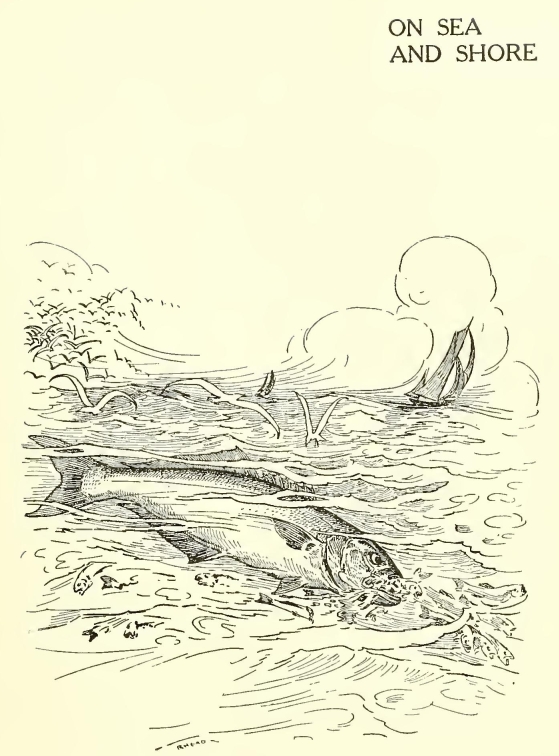
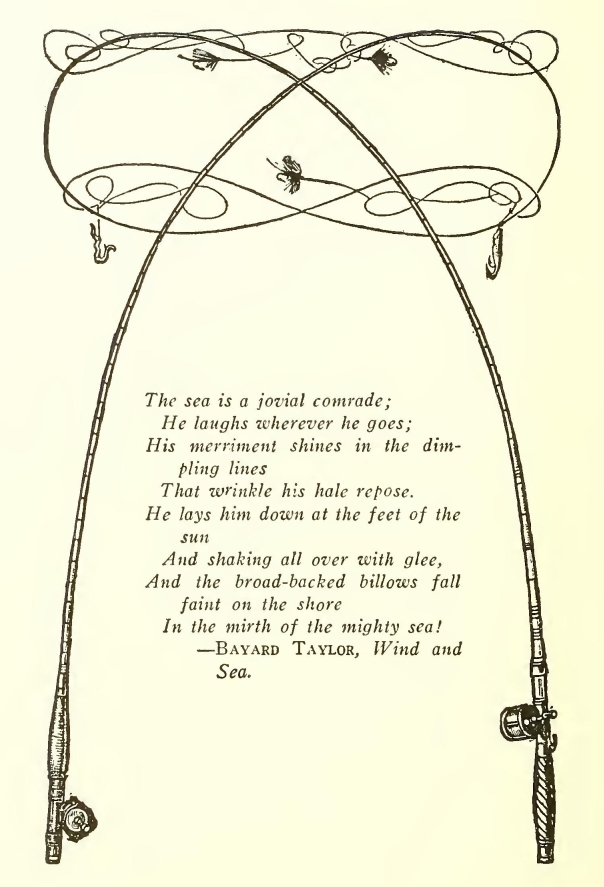
The sea is a jovial comrade;
He laughs wherever he goes;
His merriment shines in the dim-
pling lines
That wrinkle his hale repose.
He lays him down at the feet of the
sun
And shaking all over with glee,
And the broad-backed billows fall
faint on the shore
In the mirth of the mighty sea!
—Bayard Taylor, Wind and Sea.
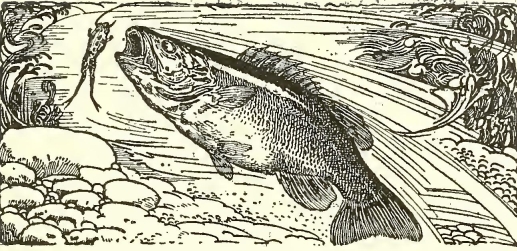
R. W. D. HOWELLS made a most pathetic confession some years ago in an article contributed to a well-known journal when he said concerning vacations, “Whatever choice you make, you are pretty sure to regret it.” Either Mr. Howells was “out of tune with the universe” or he never tried Edgartown.
Lest some of our readers should assume some selfish motive as prompting this bold proclamation of Edgartown as an attractive spot in which to spend the summer days, let it be said that the writer does not stand in with any hotel proprietor or real estate dealer in this village by the sea—or elsewhere.
Just how Martha’s Vineyard came by its name is not certain. One tradition has it that when, in 1605, Bartholomew Gosnold sailed from England for “Northern Virginia” and chanced upon No Man’s Land, he gave it the name of Martha’s Vineyard, and that, for some unknown reason, this name was transferred to the neighbouring island.
Still another tradition alleges that the first settler on the island had a loved daughter to whom he gave a tract of land where vines grew luxuriantly; and so not only her tract, but the whole island came to be known as Martha’s Vineyard. Neither theory costs anything; they are probably about equally true—you can take your choice.
At the extreme eastern end of Martha’s Vineyard is the quaint, restful village of Edgartown. Turn your face towards the sun-rise and you look across a narrow bay to Chappaquiddick Island, lying like a giant earthwork to protect the village from the assaults of the ocean. Wouldn’t you like to ramble about a bit? We’ll start in at this ravine south of the town, for it was here that the first settler made his home. Considering that he built his log cabin in 1630, only ten years after the landing of the Pilgrims, it is not strange that nothing remains to mark the place of his abode but this grass-grown depression in the hill-side.
Going south along the main street we come to the old Mayhew house, built in 1698, and looking as if it proposed to stand for a few centuries longer. Tradition has it that during the Revolutionary War a cannon-ball passed through its walls, going in at the rear and coming out at the front. We stop just long enough to make an unsuccessful hunt for the hole, and then on to the Collins place. What is there especially interesting about this fairly modern house? Just this: that it was our home through many summer days, and we can never think of it or of its hospitable mistress without a thrill of delight. Out there in the front yard gleam the white grave-stones which mark the resting places of members of the family who died a hundred and fifty years ago. From the wide porch at the back of the house you look out over the bay to Chappaquiddick, and may even catch glimpses of the sea, looking either to the north or to the south.
We’ve rested long enough, and will resume our journey up the street to the Fisher house. Some day we will make a long stop here, for it is a pre-revolutionary mansion and full of relics of the olden days. Here are quaint old deeds, some of them in the Indian language, and no end of curios gathered by members of the family during a prolonged stay in Spain.
If you’ve leisure, let’s visit the piers. Time was when all was bustle here, but it is depressingly quiet now. Forty vessels in a single year sailed from this port in search of whales. An old record bearing date of November 11, 1652, tells us that “Thos. Daggett and Wm. Weeks are appointed whale cutters for this year; voted the day above written.” In those days whales were frequently cast upon the beach by severe storms, and whale cutters were appointed to insure a fair division of the spoil. Now the whaling industry is a thing of the past. One of the pathetic sights of the village is an old whaling vessel tied to the pier and slowly rotting away. It is many a year since the last of these vessels sailed from port, but if we are fortunate enough to meet one of the retired captains and can induce him to tell us something of his experiences, we shall come quite near enough to the hardships and privations of those heroic days. Do you see that man going along Water Street? He sailed a whaling vessel for forty years, and one of his voyages lasted six years lacking ten days.
You can take your choice between visiting the old burial ground on “Tower Hill” or going out for a sail. Take the sail? I thought so. Of course, there are brown old head-stones with quaint epitaphs up there on the hill, but who that is in possession of his senses would pass up the chance to go sailing in a Cape Cod catboat on such a day as this?
Here we are on board the “Quickstep,” one of the smartest boats on the coast, with a captain who knows the sea as a native New Yorker knows Broadway. While we are dropping down the bay before the light wind, you may like to hear of the gale when this same boat and captain were blown out to sea. The storm came up suddenly and the wind blew directly off shore. The captain was fishing just off the Muskeget shoals and tried hard to beat in, but in vain. When the gale had blown itself out, wrecks were strewn all along the coast, and the Edgartown people had given up the captain for lost; but on the fourth day he came sailing into harbour. Single-handed and alone he had fought the storm and had won the fight.
Isn’t this a great day? and isn’t this the ideal way of getting over the water? Better let the captain take the tiller, for we’re coming to the bar and the channel is crooked. Now we’re over and you can see Nantucket off there to the south. Where you see the rough water is Muskeget shoals, and the captain says that at certain tides the strongest vessel would be wrenched to pieces by the fierce currents and counter-currents. Did you ever see sky more blue or feel air more full of tonic? Don’t worry! We shall curtsy a little, but the water is not rough enough to make trouble for the most sensitive landsman. Going around Chappaquiddick, Captain? Good! That is just about a twenty-mile sail.
Have I ever been out here when it was rough? Haven’t I told you about the trip after mackerel when we had on board a load of theology? No? Well, we shall have plenty of time for the story before we sight the light-house.
It was a nasty sort of a morning, but as friends had come over from Cottage City the night before for the express purpose of having a day with the mackerel we concluded to try it notwithstanding the weather. Dr. G. had brought along his boy of twelve, and as we sailed down the quiet water of the bay that boy was simply bubbling over with happiness. The lad besought his father to make an arrangement with the captain whereby he should spend at least a month on this boat the following summer. The captain seemed willing, and as we crossed the bar the boy was exulting in the assurance of long days of perfect bliss only one year ahead. The wind was blowing fresh from the north-west and as soon as we were out from under the shelter of the land the boat began to curvet and jump and roll and quick-step just as any respectable boat is bound to do under such circumstances.
In less time than it takes to write this down the joy of life had departed for that lad and he was carefully laid away. The lone layman of the party was a close second, and, losing all interest in mackerel, he stretched himself out on deck. The Professor followed suit, and Dr. G., after a heroic struggle, proceeded to part company not only with one breakfast, but, seemingly, with a dozen or more. The captain, who was an interested spectator of the process, murmured to the writer, “Holy mackerel! What an eater that man must be.” All day we rolled and pitched, with three of the party groaning to be put on shore. We caught only a few mackerel, but we had a great deal of exercise.
How do we catch mackerel? As you are asking how we do it, and not how it is done by the heartless, unimaginative, commercialized Philistines who chase the schools in steam vessels, I’ll tell you. The night before, the captain gets the fodder ready. I mean the fodder for the mackerel, not for the fishermen. It is about as nauseous a mess as one can imagine. Salted menhaden and the refuse from scallops are ground up together, forming a mass of about the consistency of thick molasses. There is the grinder now, just inside the cabin! Looks like a big coffee-mill.
We usually start early in the morning, sometimes before daylight, in order to take advantage of a favourable tide. When we are out to sea a sharp lookout is kept for that peculiar ripple on the surface of the water which denotes the presence of a school of mackerel. When we have sailed to the spot we “come-to” and drift with the tide, while dipperful after dipperful of the “chum”—as the sticky and malodorous mess is called—is thrown out upon the water. The mackerel will throng about the boat to feed upon this dainty, and then the fishing begins. Empty barrels on deck, a line—some fifteen feet long—in each hand, with hooks that are set into pieces of lead forming a “squid,” and the sport begins. It is usual to bait with a piece of mackerel belly, pure white; but very often the greedy fish will bite at the shining lead. You do not stop to unhook the fish, but simply slap them over into the barrel behind you, and then out with the hook again. Sport? Yes, of a sort. Gets a little monotonous after a while. The captain fishes for the Boston market, so we have no twinges of conscience about catching as many as possible.
Do we catch anything besides mackerel? If you’ll put out that line and the captain will sail along the edge of one of these “rips” you are very likely to have a practical answer to your question. Nothing that time; but the captain is coming about and we’ll see what happens on the other tack. This is the poetry of sea-fishing. Here we are bowling along with a full sheet and—hang on to him! No, you have not hooked on to a railroad train but a blue-fish. Look out! Don’t slacken on your line or you’ll lose him. Hurts your fingers? Of course it does. You should have put cots on them. Give him a swing! Keep him clear of the boat! There!
There’s your answer. He’s the bravest, pluckiest, gamiest fish on the coast. We sometimes spend a half day or so fishing for bottom-fish like scup, black-fish, or even flounders, for they bite freely and bring a fair price in the market; but if you’re fishing for sport, there is just one fish in these waters which fills the bill completely, and that is the blue-fish. Sometimes you fish for hours without getting a strike, and then all at once you run into a school of them. When this happens you have your work cut out for you. I remember a day at Block Island when the Doctor and I had sailed almost entirely around the island with our lines trailing unmolested behind the boat. Just as we were approaching the starting place the captain said, “Look at the bluebills jumping, over towards shore!” The bluebill is a small fish some four or five inches long, and favourite food for the blue-fish. We tacked and sailed across the school, back and forth, again and again, and when the fray was over we had sixty blue-fish lying in the bottom of the boat that averaged over five pounds in weight.
There’s the light-house; we’ll soon be in. See that hotel on the hill? I’ve just time to tell you of something that happened there on a summer morning a few years ago. I met Dr. ———— on the Providence boat and he asked where we were stopping and if we had any fishing. When I told him of the “Quickstep” and Captain Frank and the mackerel, he said, “I’ll be over Monday morning. I’m tired of Assemblies and Chautauquas and hotel piazzas.” Monday found him with us, and arrangements were made to start at five o’clock Tuesday morning. The hour came, but Dr. ———— did not. The captain worried about the tide and the bar, and I volunteered to see what had become of our tardy friend. Pounding on the hotel door I finally managed to rout out the night watchman, who readily went in quest of the Doctor. Upon his return he reported that the would-be fisherman had been asleep, but was now dressing and would be down very soon. The minutes passed, the tide was ebbing, and no Doctor. Finally I suggested to the watchman that he make another trip to see if he could not accelerate the Doctor’s motions. Reappearing after a little, the watchman said, “What do you think? That miserable old cuss had gone sound asleep again.”
“What a fall was there, my countrymen!” The D. D., the LL. D., the eloquent preacher, the famous lecturer, the renowned defender of the “faith once delivered to the saints,” the man whose name is a household word among those affiliated with one of our largest Protestant bodies catalogued as a “miserable old cuss!”
Here we are, at the pier. Confess now, that for unadulterated pleasure a sail such as we’ve just had beats motoring, whether on land or water, out of sight. Independent of the wind in a motor boat? Yes, but not of the sputtering and chugging and smell. Remember what Tennyson says in Locksley Hall? I don’t know that I can quote it accurately, but the idea is that a day in a cat-boat is better than a thousand years in a naphtha launch.
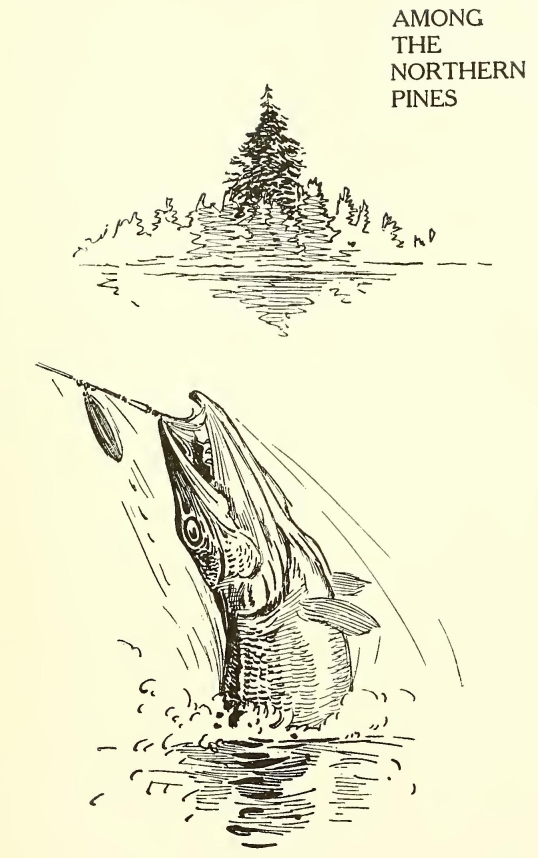
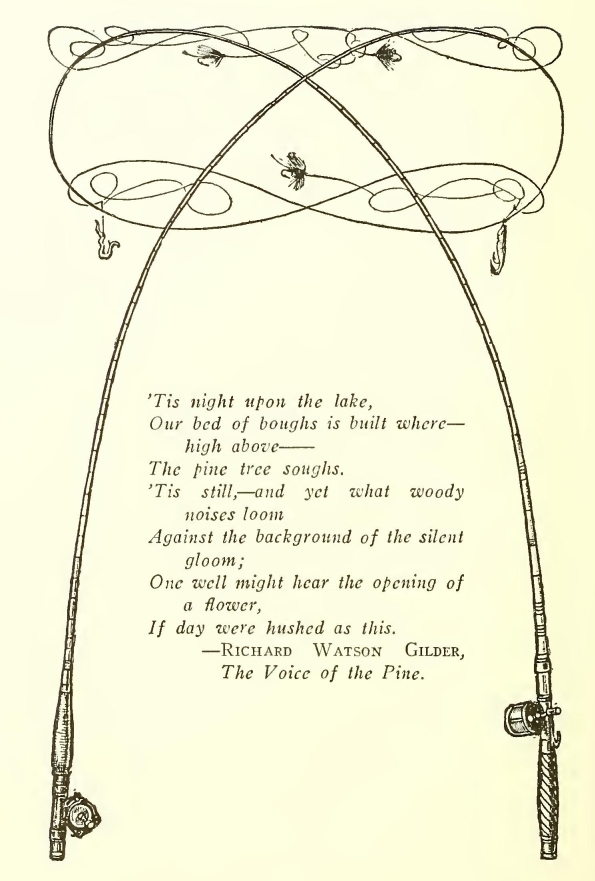
‘T is night upon the lake,
Our bed of boughs is built where—
high above——————-
The pine tree soughs.
‘Tis still,—and yet what woody
noises loom
Against the background of the silent
gloom;
One well might hear the opening of
a dower,
If day were hashed as this.
—Richard Watson Gilder,
The Voice of the Pine.
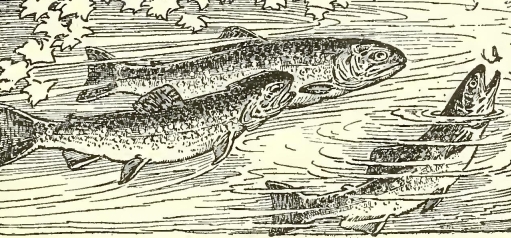
E reached the lake in the evening-, and started out bright and early the next morning to call upon some of the old inhabitants who wear fins and have a reputation for being scaly. A new and fascinating Dowagiac minnow caught the eye of a big bass before we had gone forty rods, and connections were promptly established. As he was being kindly but firmly persuaded to approach the boat he flung himself into the air, gave a twist and a wiggle and a shake and thus succeeded in appropriating that Dowagiac to his own uses. He has not been heard from since that brief interview, but it is safe to say that he is putting on airs as he dangles that rainbow-coloured minnow before the eyes of his admiring relatives. We have sometimes doubted the truth of the old saw that it is unlucky to lose the first fish hooked, but all doubt on that point has been put to flight.
A day or two later five fine bass were caught one afternoon and hung over the side of the boat on a hastily improvised stringer. Rowing home the stringer parted through chafing on the side of the boat and the bass went their respective ways. Not content with this unfriendly slap, Dame Fortune—or inexcusable carelessness—permitted the string of the minnow pail, also hanging over the side of the boat, to break, involving the loss not only of the pail but of some four dozen A-1 minnows. When the Junior had captured a three-pound bass we concluded to tie him—the bass—up to a root that reached out over the water and to keep him until later. Just when he seemed to be thoroughly halter-broken he succeeded in untying the knot and we saw him no more. All this was bad enough, but to make a complete job of our discomfiture the minnow-trap which was supposed to be busily at work luring bait for our use, suddenly and unaccountably disappeared. Then the outer pail of the new minnow-bucket was missing and the scaler could not be found. It rained and then rained some more. The bass absolutely refused to strike at a spoon-hook or pork rind or the new Dowagiac. Why did we ever leave our happy home?
It is always darkest just before dawn. The outer pail of the new minnow-bucket had been borrowed by a Methodist preacher who was camping nearby, and was returned the same afternoon. The minnow-trap had been rolled out into deep water by the under-tow, and within twenty-four hours of its disappearance was back in its accustomed place and hard at work. The scaler reappeared as suddenly and unaccountably as it had disappeared. A new stringer was easily manufactured and, with a plentiful supply of minnows, the bass needful to adorn the stringer were easily persuaded to come to hook. The weather-man repented of his unkindness and gave us days of glorious sunshine. The lake dimpled and laughed, the pines whispered all kinds of friendly messages, the red-squirrels scolded at us from the tree-tops where they were busy cutting off pine cones, and the chipmunks made friendly advances as we sat by the lakeside. The moon almost turned night into day and night loons called to us, “Ha! Ha! What’s the matter with you? This is a beautiful world. Minnesota is the finest part of the world and this is the fairest spot in Minnesota. Cheer up!” And we did.
Now that we have gotten out of the dumps and life is worth living, let’s go fishing. What shall it be? Or will you take anything that comes your way? There are bass and crappies and sunfish and great northern pike, not to mention rock-bass and perch. The natives aver that there are also enormous wall-eyed pike and we believe it, although they were always out when we called. Thanks be! there is not a pickerel in the lake. The great northern pike looks much like his kinsman, the pickerel, but differs in body-markings, gill-covers, general shape—being more stocky—and especially in palatableness. He is a vigorous fighter. Mr. Louis Rhead, in his book on “Fish and Fishing,” says that neither the great northern pike nor the pickerel has ever been known to rise above the surface of the water after being hooked. If that is correct, then something new under the sun has happened recently, for the writer, with eighty to a hundred feet of line out, had a nine-pounder throw himself entirely out of the water in his efforts to escape. The largest ever caught in this lake weighed thirty-six pounds, but numbers are taken that go over ten pounds each. They are nearly as gamey and quite as good eating as the muskallonge.
The crappies are more friendly. Early in our stay we located a “bed” which never failed to respond to a call. If there is any fish in these northern lakes that makes a more delicious dish than fried crappies, we want to be introduced to it. It is not all unusual to take them weighing a pound each, but this seems trifling when the Methodist preacher aforementioned tells us that he caught seventy-five in Lake Itasca in less than an hour which averaged two pounds each. Bass are here in abundance but were not responsive this summer. Those caught were ridiculously fat.
To cap the climax of attractions there is a trout stream only three miles away. Visit it? Rather. A friendly neighbour furnished horse and buggy and acted as guide. We had a few alleged angleworms, and even with these emaciated, scrawny apologies for bait we took enough trout to furnish a meal for each family represented by the anglers. The stream flows through a marsh and is fed by numerous springs. Where we first struck the brook one needed a magnifying glass to find it. How a six-inch trout manages to turn around in it passes understanding. It grows as it goes, however, and widens into quite a respectable stream during its journey of a mile.
For some years now the writer has been inflicting fish stories upon the unsuspecting public, and the impulse is strong within him to add more to those already told. He has a new supply growing out of the experiences of the summer, and it is hard to keep them bottled up. He would gladly particularize concerning the ten-inch trout that was waiting for him under the roots of a big tamarack just where the foam had formed a shady hiding-place, or mention specially some of the fights with the pike. But the cynical skepticism of assumed friends, the frivolous, not to say contemptuous comments made concerning the writer’s previous contributions to piscatorial knowledge, have deeply wounded his sensitive spirit, and he cannot summon courage to challenge renewed unkindness.
Just why fish stories should be discredited so readily by those who do not fish it is difficult to understand. Why should a man who does not know the difference between a spoon-hook and an ostrich feather and who cannot tell a sunfish from a rainbow trout sit in judgment upon the solemn assertions of experienced anglers? This attitude of chronic unbelief concerning the testimony of honest men is unbecoming. We have heard many fish stories during the summer, all of them true. We have even heard varying accounts of the same incident and have believed them all. That comes from possessing a trustful spirit. A gentleman told us of seeing a string of five fine bass and some fifteen or twenty sunfish and perch caught by a cottager who came over from an adjoining lake. The next day another gentleman gave an account of the same catch and the number of bass had increased to twenty-five. On the third day, as vouched for by another gentleman, there were one hundred bass in that string and they averaged between four and six pounds. Now some suspicious individuals would scoff at the apparent discrepancies, but it is easy to reconcile the different statements. The first gentleman may have seen the catch early in the day and the other accounts may have been based upon later accumulations.
Among the most untiring fishermen met this summer were a father and son who chased the great northern pike with a zeal worthy of such a cause. One day the father informed me that they had caught a pike weighing fifteen pounds the day before. Soon after the son gave his version of the capture and said the fish weighed eighteen pounds. But why cavil? Are we to make no allowance for youthful imagination? Is a little matter of three pounds to be allowed to spoil a good fish story?
The writer ventures to record these experiences because they are not his own. Possibly he may be allowed to set down one other incident, inasmuch as it does not concern him personally: On the shore of the lake—the precise location was not given—once lived a farmer who owned a dog famed for exceptional intelligence. It occurred to the farmer that, as the dog loved the water and seemed interested in the fishing excursions which they took together, it might be possible to utilize the canine ability to practical ends. Fastening a trolling line to the dog’s tail, he took him out upon the lake, threw him overboard and rowed rapidly to shore. Of course, the dog swam after the boat and had not gone far before he hooked on to a good-sized bass which he dragged after him to the land. The owner praised the dog and continued his training until the beast had become a proficient troller, entering into the sport with eagerness and zest. If the master failed to set him to work for a day or so the dog would bring the trolling line in his mouth and plead—as well as a dumb animal can—to be allowed to go fishing. If he caught a bass he would give two barks to announce the capture, and if a pike three barks, except in the case of an exceptionally large one, in which case he barked from the time the fish struck until he had landed it. If he had the misfortune to hook a rock-bass or a perch he would sneak down the shore to some unfrequented spot and there gnaw the intruder off the hook and then go back to work again. Would that we could record a long life for this most wonderful animal, but, alas! he came to an untimely end. When but four years of age, in the fulness of his powers, he begged to go fishing one lowering day. Soon after he had begun trolling up and down the shore the master heard his bark of victory and, as it was continued, knew that he had hooked a large fish. The barks soon took on a note of anxiety, gradually merging into fear. Rushing down to the shore the horrified farmer was just in time to see the dog being rapidly drawn backward despite his most heroic efforts. A moment later and a great pair of jaws opened and enveloped both dog and bark. When, now and then, on cloudy days, a sound comes across the water that somewhat resembles a bark, the residents say to each other, “There is the big pike that swallowed Perkins’ dog.” (The writer hastens to say that he did not see the dog nor the pike nor even the bark.)
By this time some reader may be interested to know where the lake is located about which we are writing. A journey of two hundred miles almost due north from Minneapolis brings the traveller to Park Rapids, a live and growing town on the Great Northern Railroad. One may not travel far in any direction from this town without coming across a lake. Three miles to the east is Long Lake, some nine miles in length with an average width of about three-fourths of a mile. It is a beautiful sheet of water, spring-fed, blue, with sandy beaches and broken, wooded shores. Here among the pines is the cottage where we spent a delightful outing.
Unless all signs fail, this section is soon to become the favourite playground of the Mississippi Valley. It has almost innumerable attractive lakes, the fragrant pines are everywhere, the air is pure and invigorating, the fishing is varied and first-class. Twenty-four miles from Park Rapids is Lake Itasca, whose fame has gone abroad, for it is here that the mighty Mississippi has its source. It lies within the state park, which includes thirty-six thousand acres of land, and here are found magnificent specimens of the great Norway pine, once so common over all this country. The superintendent of the park is given the privilege of conducting a summer resort on the shores of Lake Itasca, and the central lodge and adjoining cottages, all built of pine logs, are very attractive. An automobile trip on an ideal day gave an opportunity for visiting this interesting place. We wondered, as we approached the lodge, at seeing the boarders playing tennis and pitching quoits when ten rods away was the lake and fishing. But more intimate acquaintance with the lake dispelled the wonder. The shoreline is timbered and beautiful, but the water looks dead, and not a sand beach is to be seen.
It is now all in the past except the memory. That will abide. The last afternoon of our stay we rowed across the lake and picked a gunny-sack full of hazel nuts, took a swim in the lake, and then built a fire on the shore over which we roasted the delicious sweetcorn, took our supper in the open, and rowed home as the shadows deepened and the crescent moon hung low in the western sky. We shall often recall the sunny days and peace-filled nights, the glory of the sunsets and the enticement of the beautiful lake. Possibly we shall feel, at times, the tingle generated by the big bass or the ten-inch trout. Certainly we shall live over again the picnics in the pine woods and the days spent in the boat voyaging in search of the wary bass.
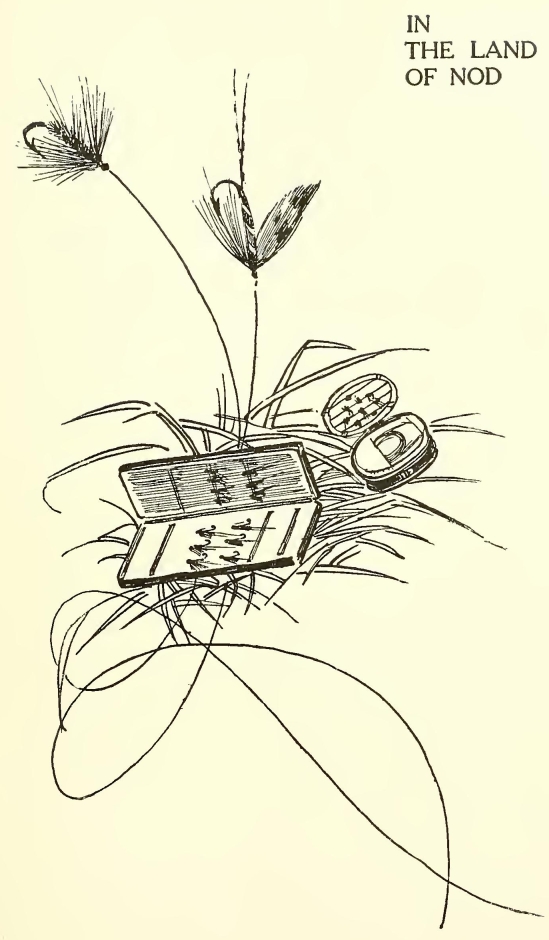
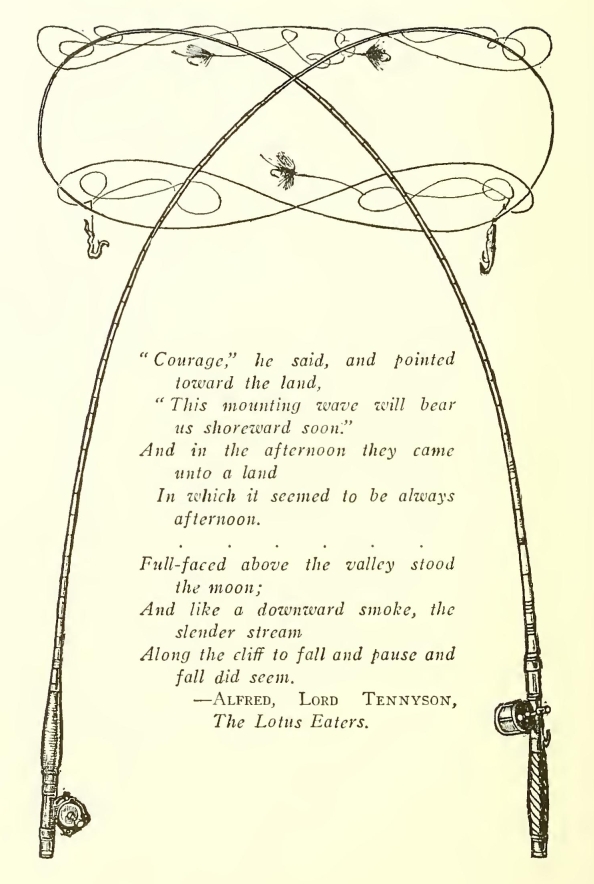
“Courage,” he said, and pointed
toward the land,
“This mounting wave will bear
us shoreward soon.”
And in the afternoon they came
unto a land
In which it seemed to be always
afternoon.
Full-faced above the valley stood
the moon;
And like a downward smoke; the
slender stream
Along the cliff to fall and pause and
fall did seem.
—Alfred, Lord Tennyson,
The Lotus Eaters.
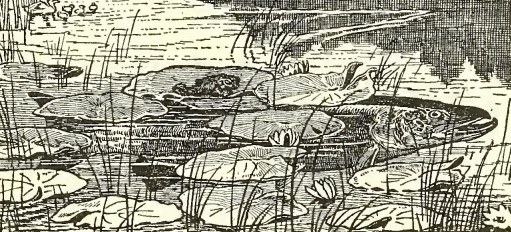
T was on the Steamer “Empress,” plying between Point du Chene and Summerside, that the Preacher said to his small son, “Yonder is the land.” The boy gazed intently for a moment and then solemnly remarked, “That’s the Land of Nod.” Great chap, that boy! for to his many other accomplishments he added in that hour the gift of prophecy. It is the Land of Nod, for every one you meet on Prince Edward Island gives you a friendly nod, and after you have been there a few hours all tendency to pursue the strenuous life departs, and the summit of earthly bliss is found in sitting under the shade of an apple tree and nodding at nothing.
Frankness demands a confession; namely, the Preacher went to Prince Edward Island to loaf.
He was not in search of a divinity school, or a summer assembly, or a wealthy church paying fifty dollars per Sunday for supplies. He sought a spot where committee meetings and mosquitoes and dust and noise are unknown; where he could have unlimited supplies of fresh vegetables, milk, cream, johnny-cake and cornmeal mush; where he could tickle his lungs with the breath of the sea, and, above all, where the trout hold a reception every day in the week—except Sunday. Do I hear some dyspeptic, pessimistic preacher saying, “There isn’t any such place?” Skepticism is not strange in one whose cup of bliss runs over when he finds a place where two cottages are built on a forty-foot lot and where he can plunge into the wild dissipation of croquet.
Few good trout streams flow past the front door of a summer hotel. It is necessary, as a rule, even on Prince Edward Island, to journey beyond the dooryard before coming to the favourite haunts of that festive fish. The walking is good? Yes, but the Preacher found a way that beats walking all to death. Have a man at the hotel where you are stopping, who keeps his own team and coachman; who counts that day lost in which he catches no trout; who is intelligent, genial, unselfish; who invites you daily to share his buggy in trips to streams that swarm with fish. Such a man there is (so far as the writer knows there is but one on the North American continent), and the Preacher found him. Do I hear pathetic cries from my brother preachers piscatorially inclined, asking, “What’s his name?”
“Where does he live?” S-s-h! my dear brethren. He is pre-empted by the writer, and to protect you from any temptation to trespass, we’ll just call him the Judge. Only the writer’s unimpeachable veracity as a teller of fish stories will save him from mild suspicion when he makes the following statement: The Judge, who knew every pool for ten miles around where the big trout rendezvous, insisted that the Preacher should have first chance at these fascinating spots. Don’t believe it? Well, no one can blame you for your skepticism, for in the annals of fishermen from the days of Izaak Walton until now, no other such example of self-abnegation is to be found.
It was on a Monday morning that the Judge and the Preacher made their first descent upon the unsuspecting trout. The point of attack was on a tidal stream known as Tryon Creek. Some of the writer’s friends have grinned derisively when he has told them of the “sea-trout” of Prince Edward Island, and one listener opined that “weak-fish” were probably meant. Of course there are always a few people around who enjoy the rare delights of omniscience, and it is useless to offer information to such. But for the benefit of the uninformed and open-minded let it be said that in every tidal stream on the south shore of Prince Edward Island, the well-known, square-tailed, speckled trout are found. They run up with the tide and, while many go back as the tide ebbs, a few remain in the pools. It was in pursuit of these sea-trout that we sallied forth on this Monday morning. The tide was full when we reached the stream, the sun shone from an unclouded sky, the wind had gone to sleep, and the rank marsh grass hid innumerable pit-falls. Picking our way along we cast industriously, in the middle of the stream, near the right bank, near the left bank, up stream, down stream—and not the suspicion of a response. Just to break the monotony the Preacher stepped into a bog-hole and disappeared, temporarily, from view. In response to the Judge’s anxious query, “Where are you?” a smothered voice from the vicinity of the grassroots answered, “I’m right here.” That ended the marsh fishing for that day, and the disgusted pair wended their way to a pool at the head of tide-water, where their labour was not in vain.
A little after the noon hour the Judge said, “Now we’ll go up to Mr. ————‘s and get some lunch.” If there is any home on the south shore of Prince Edward Island where the Judge has not a hearty welcome waiting for him we did not find it. Under a tent on the lawn we sat at ease, while the hospitable hostess brought forth great dishes of luscious strawberries, pitchers of cream, delicious bread and butter, and then mourned because we would not go into the house and have something to eat. It was with that at-peace-with-all-the-world feeling, which is begotten of strawberries and cream, that we turned our faces once more towards Tryon Creek. The Judge said, “Let’s try the pond.” Now fishing from the shore of a pond is torture to the sensitive soul of a true sportsman, so it came to pass that no sooner did we behold a canoe tied to the bank than preparations were made for a voyage of discovery. We discovered, all right. The Judge is a man of parts, and his fishing weight is about 250 pounds. He perched himself on the deck at one end of the canoe and invited the Preacher to balance him on the other. The proposition seemed to admit of debate, but the Preacher—accustomed to doing as he is told—clambered into the place assigned him. Then a kind friend pushed off the canoe and—never mind the particulars, but we know by accurate measurement that the water at that point reaches exactly from the Judge’s hips to his armpits when he is in a sitting posture. The canoe being righted the Judge insisted that the Preacher should enjoy it alone while he would skirmish along the shore. This arrangement resulted satisfactorily to all parties—unless we may except the trout—and long before sundown, the creels were filled and the horse’s head was turned towards home.
The writer has too much consideration for the feelings of his readers to undertake a detailed account of all the fishing experiences of a six weeks’ vacation, but he is not to be choked off until he has hinted at some of the things missed by those who were not there.
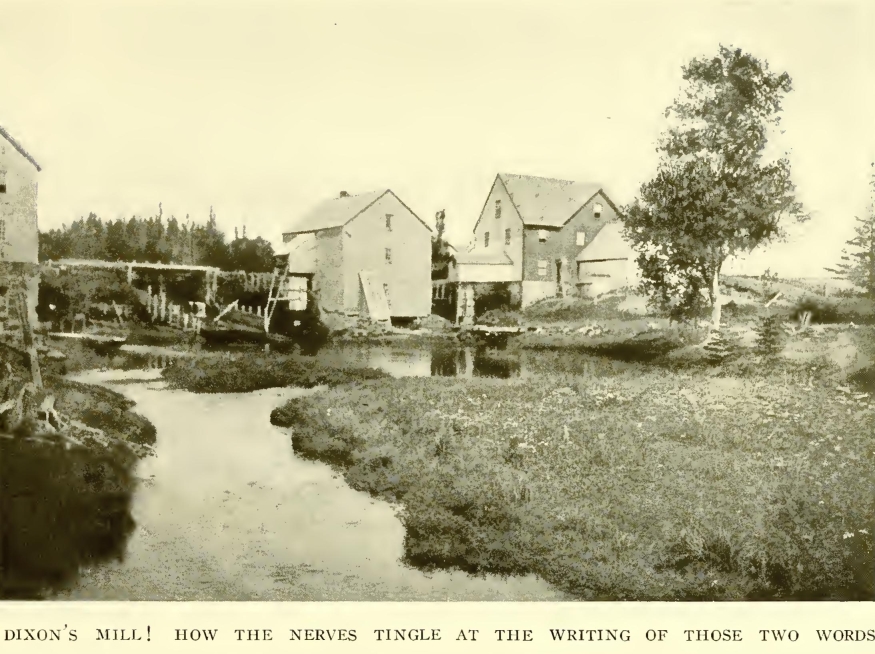
Dixon’s Mill! How the nerves of the right arm tingle just at the writing of those two words! It was thereabouts that some of the greatest days of the summer were spent, for the pond above the mill and the pool below furnished unfailing supplies of noble trout. The pond was bordered on one side by a steep hill, clothed from water’s edge to summit with sombre fir. On the other side were the miller’s garden and the meadow. One afternoon the Judge paddled the Preacher about this pond while the latter industriously whipped the water with his flies. A more responsive congregation that Preacher never had. They slept not nor slumbered, but were up and coming from introduction to “finally.” Twenty-three trout, filling a fifteen-pound creel, were the fruits of his joyous toil. Then, just as the sun had gone down behind the fir trees and the night shadows began to thicken, we addressed ourselves to the waiting throng below the mill. There were quick and constant responses, but they did not count in comparison with the swirl made by one old veteran as he lunged at and missed the fly. Quickly the fly was recovered and cast again, and still again, for many a time. Had he been pricked? Had he seen his enemy even in the dim twilight? No, for here he is again, and this time his aim is sure. Back and forth he rushes, the light rod bending in perfect harmony to his movements, until the lusty foeman has made his last run and lies exhausted in the net. He is fresh from the sea, beautiful as a dream, the perfection of form and colouring.
It was on Dixon’s Pond that the Junior hooked his first fish. Don’t blame him for neglected opportunities, for he was not quite three years old and this was his first chance. It was where an ice-cold stream comes tumbling from the hillside into the pond, and a kindly fate had decreed that a fir tree should fall at just this spot. What a combination! No wonder that this was a favourite tryst-ing place for big trout! But it had its disadvantages, as any one will recognize who has undertaken to direct the movements of a trout that has a hook in its mouth and a tree-top handy. The Junior hooked a lusty fellow and, with some aid from the Senior, managed to get him to the top of the water, and then there was a lashing and a splashing that caused the small boy to open his eyes in astonishment. Another instant and the commotion was at an end, the trout was gone—and the hook left fondly clinging to a submerged limb. Silence—and then the Junior remarked philosophically, “That fish spread his wings and flew away.” Let no one fancy that the young man accepted defeat as his portion, for a little later he captured, by his own unaided prowess, two trout that must have weighed, together, at least four ounces. These were carefully wrapped in paper and formed a portion of his next morning’s meal.
We submit that a well-trained Preacheress should spend the summer vacation sitting on the hotel piazza busy with her “tatting.” (Don’t read that “tattling,” please.) But there is at least one of this honoured class who, at certain intervals, abjures fancy work and insists upon going fishing. This aforesaid assistant pastor and her young daughter did, upon a certain day in August, with malice aforethought, sit on the logs at Ive’s Mill and most wilfully and maliciously deceive some forty innocent and confiding trout. Then, when the slaughter was done for that afternoon, these two, with the Senior and the Junior, the Judge and two young friends, sat on the grass by the singing brook, just where some great trees cast their shadows, and regaled themselves with the lunch so kindly provided by our hostess.
One day the Preacher was left to himself. The Judge was away on business, the Preacheress felt no stir of ambition towards piscatorial conquests, and the desolate man was compelled by force of circumstances to go it alone. That was the day when he discovered the unexpected resources of Matheson’s Bridge. This bridge spans the stream at the head of Dixon’s Pond. It is not a public highway and is used only by the owner of the farm. The water has worn down the bed of the stream until there is a depth of some four feet, and it occurred to the Preacher that here was a likely place for good-sized trout. Warily he approached and cast from the upper side, letting his lure float down under the bridge and then gently drawing it up the stream. The next instant he knew that his intuitions had not deceived him. A struggle, and then a glorious trout lay glistening in the sunshine. The farmer, who was waging a war of extermination against potato bugs on a neighbouring hillside, came down and lent his countenance to the stranger poaching on his preserves. To make it short, from under that bridge that afternoon came twelve trout that weighed not less than ten pounds.
One more experience must be told. The Judge, the Preacher and the Southerner had gone up the de Sable River at high tide in a dory. Their theory was that after fishing around Dixon’s Mill they would float back on the receding tide. The theory as to the fishing and the receding of the tide proved trustworthy; but the floating was a delusion. The fact is, they fished too long, the tide had gone out, and the dory would float only as it was dragged. The Southerner declared that he was incapacitated for violent physical exertion, and furnished his share of the necessary toil in the shape of large chunks of advice. As a self-acting dispenser of gratuitous counsel he was immense. Behold the Judge at one end of the boat and the Preacher at the other, shoes and stockings off, trousers rolled above the knees, tugging and straining at that heavy boat to induce it to float in three inches of water! When they were fairly stuck fast and it looked as if the boat could never be stirred again until floated by the next tide, the reproving voice of the passenger would be heard assuring the perspiring propellers that it was all their own fault; that if they had kept a little this way or to that side, all would have been well. As they listened, the wonder grew in their minds that Job ever allowed the friends who visited him in the capacity of an advisory committee to escape with their lives. But it takes more than a heavy dory and an unappreciative passenger to discourage men who are firm believers in the perseverance of the saints, and the Judge and the Preacher hauled their burden through a mile of mud and water, and live to tell the tale.
Fair Prince Edward Island! Across the years the Preacher sees your smiling fields and sober woods and hears the beat of the surf and the tinkle of silver streams. Land of trout! Land of peace! Land of Nod!
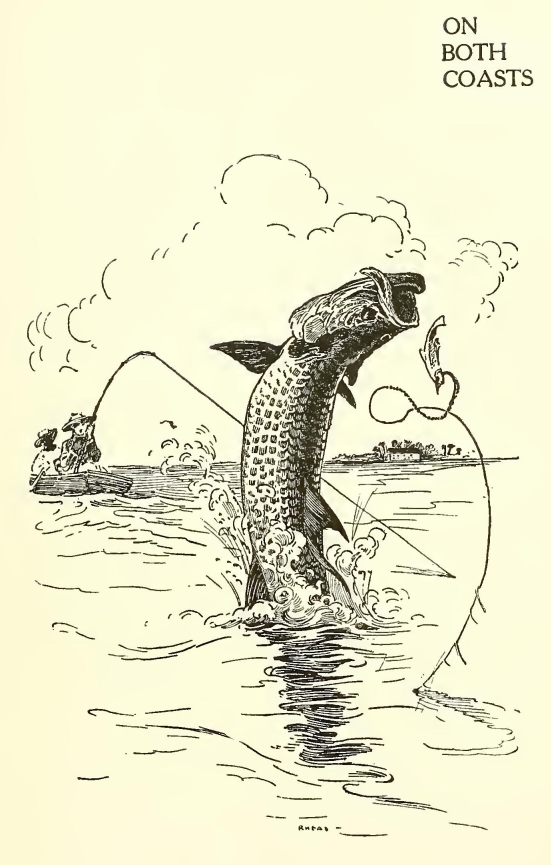
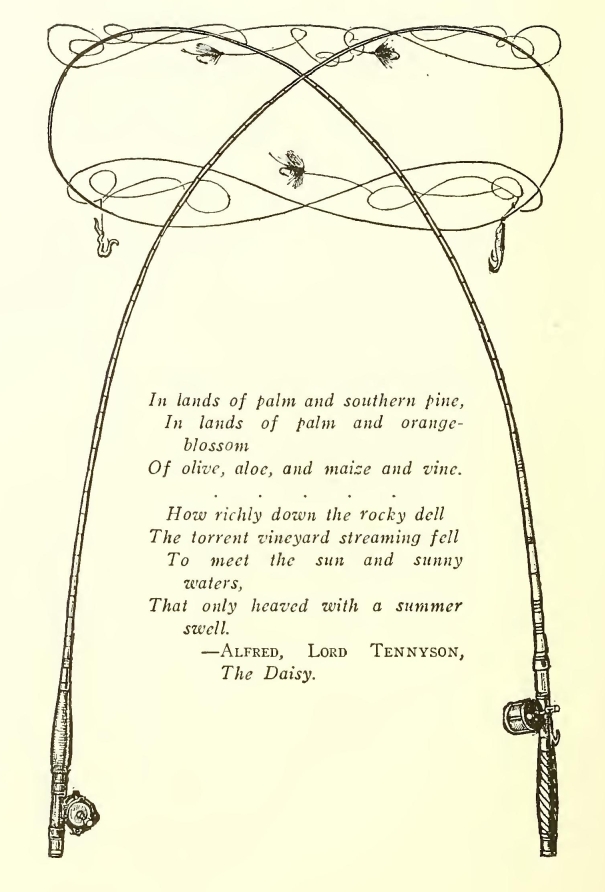
In lands of palm and southern pine,
In lands of palm and orange-
blossom
Of olive, aloe, and maize and vine.
How richly down the rocky dell
The torrent vineyard streaming fell
To meet the sun and sunny
waters,
That only heaved with a summer
swell.
—Alfred, Lord Tennyson,
The Daisy.
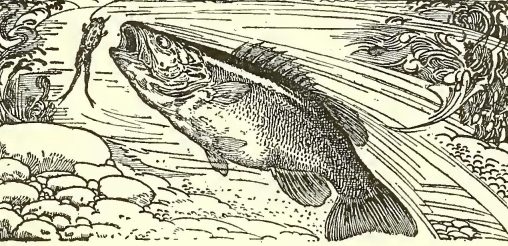
S an old proverb goes, “It is the unexpected that happens.” This ancient saw, seemed to find illustration when some one called out, as we were sitting at breakfast, “Come out and see this big trout!” We were on the St. Johns River and the steamer had tied up at a landing to take on wood. A trout in Florida! Somehow that experience had not been among our anticipations when we planned the trip; but why should not the unexpected happen in Florida as well as elsewhere? Knowing that it is never safe to be too skeptical concerning any statement which concerns fishing or fish, we joined the company of investigators. On the pier was a lad of fourteen or fifteen, holding up for inspection a fish that was, indeed, big, but to northern eyes gave no indications of being a trout. It was a giant “big-month” bass, and the lad’s assertion that it weighed twelve pounds seemed quite probable. It seems ridiculous to call the handsome speckled denizens of clear, mountain streams, and the brown, ugly frequenter of the muddy St. Johns by the same name, but there is no law forbidding such trespass. When we reach the coast we find the weakfish has also been transformed into a trout.
The “dead rivers” that abound along the St. Johns are well named, although they are not rivers at all, but bayous. They have no perceptible current, and the stagnant water furnishes a most satisfactory habitat for alligators. One day, when we had committed ourselves to the care of a negro boatman, we spent a forenoon in one of these dead rivers, catching an occasional bass and shooting curlew and fox squirrels. Passing a tree-top that had fallen into the water, the boatman told us that he had seen a number of little ‘gators drop into the water as we approached, and said that he would catch us some if we wished. Rowing quietly up to the tree-top, he watched the surface of the water for a little time and then, making a quick grab, held up a little wriggling alligator some eight or ten inches long. This was repeated until he had captured five, and we informed him that these were all we could use to advantage. It is said that the relentless warfare waged against the alligator by tourists and native hunters who covet his hide has made him a rarity, at least along the lines of travel, but twenty-five years ago, no one who visited Florida need fail of a sight of this ugly saurian. Coming home in the afternoon of the day spent with the negro boatman, our attention was called to the swaying of the marsh grass not far distant, and the negro informed us that it was caused, he thought, by an alligator. With guns at cock and all ready to open a fusillade on the first appearance of the game, a cautious approach was made until we were alongside the grass. Then, as we were standing in the boat, peering this way and that in an effort to spy our victim, there was an unexpected rush, the boat was given a whack that almost caused the hunters to fall overboard, and we had a fleeting glimpse of our quarry as he disappeared in the waters of the river. The performance was so unexpected and so soon over that not a shot was fired.
For many years the Indian River country has been a prime favourite with those who visit Florida. The so-called river is really a long, narrow arm of the sea, and at some points, a walk of five minutes brings one from the river to the ocean. The soil along this river is exceedingly fertile, and some of the finest orange groves in the state are found at Rock Ledge and farther south. This body of water furnishes ideal conditions for sailing, hunting and fishing, and nothing can be more delightful than a cruise of a few days with congenial companions. We hired a sharpie, a flat-bottomed sailboat of such light draft that it is commonly said of it that it “will sail in a dew,” and with a generous supply of oranges on board set off from Rock Ledge towards the south. Some fishing, some duck-shooting, much idling and orange eating, served to make the days pass like a happy dream. When night came it was not difficult to find some winter-hotel with comfortable accommodations. Not infrequently night had fallen before we reached the desired haven, and the water would turn to silver as the mullet darted here and there before the slow-moving boat.
One day we anchored at the mouth of the Banana River, that members of the party who had never seen the ocean, might walk across the narrow spit of land that separates between the river and the Atlantic. One of the company, to whom the sea was no novelty, elected to remain on board, moved to this decision, in part at least, by the fact that he had secured some bait the night before that as yet he had been unable to use. Left to himself, he began operations at once, and soon landed a seven-pound channel bass. This seemed pretty good to the lone fisherman, but he had no sooner put on a fresh piece of mullet and thrown out than another tug at his line assured him that “the best is yet to be.” Despite the angler’s most skilful manipulations that fish had its own way at first. It went down, down, until the anxious fisherman saw that the line remaining on the reel must be measured by inches. Then it decided upon a reversal, and came up so rapidly that only by reeling madly was the line kept taut. After that the fish took a notion to circumnavigate the boat, which he proceeded to do in spite of protests from the fisherman. When one is fishing from a row-boat with anchor safely stowed away in the bow, there can be no serious objections urged if the fish decides to describe a circle about the boat; but on a sail-boat at anchor, the case is radically different. It is not easy to manipulate your rod successfully under the anchor rope, crawl under the boom, keep clear of the rudder, and never, for a second, give the fish the least slack line. One such experience is more than enough, and when that fish repeated the performance three times he almost exhausted the fisherman’s patience. But all things have an end, even the antics of a fish that objects to being caught, and at last the sturdy fighter began to grow amenable to discipline. Slowly, line was reeled in and, after many flurries and plunges, he was landed safely in the boat. Natives assured the captor that eighteen pounds was not very large for a channel bass; but even their efforts to minimize the importance of the event did not entirely destroy the angler’s satisfaction.
If there is a more uninteresting ride anywhere than that from Palatka to Charlotte Harbour, we do not care to find it. Scrub palmetto, pines, sand, and then sand, pines and scrub palmetto, until the traveller almost wishes the engine would jump the track or bandits hold up the train to break the deadly monotony. After all, that day is a red-letter one, for during it the writer made a friend. At noon, the train stopped near a lonely building in the pine woods to allow the passengers to dine. Other bills of fare may be forgotten, but the menu that noon is imperishably engraved on the tablets of memory. Who would not remember a meal consisting of saleratus biscuits—with strong emphasis upon the saleratus—“sides” of pork and sweet potato pie? It is conceivable that even these may be palatable when well cooked, but the materials used that day had evidently had no fair chance to reveal their excellence when skilfully treated.
Among the passengers was a tall, somewhat gaunt man, with long, brown hair and a straggling-beard just showing a hint of grey. The face was rugged but kindly, and the eyes deep-set. One felt, instinctively, that here was a man of power and goodness whom it would be a privilege to know, and when a chance remark made by him to the traveller from the north gave an excuse for further conversation it was eagerly seized upon. It was not until the train was approaching Charlotte Harbour that we learned the name of our travelling companion, a name familiar, then and now, the world over, among those who look and long for a better day for man—Edward Everett Hale. His destination was the same as our own—Pine Island—where we spent three delightful weeks, the greatest pleasure of which was his companionship. After we had been at the little hotel on Pine Island two or three days, the proprietor approached the writer with something of unusual timidity in his manner, and ventured the information that Doctor Hale would preach in the school house the next Sunday. “Would you dare to assist in the service?” he hesitatingly asked. “Dare to take part in the service? Why not? What danger would there be?” “But you know he is a Unitarian, and I understand you are a Baptist. I didn’t know but some one would make trouble for you if they should hear that you had joined in a service with a Unitarian,” said the kind-hearted landlord. When assured that we were quite ready to run the risk, he went out with beaming face to tack up his notices. Among many sermons heard from many preachers, good, bad and indifferent, the outline of Doctor Hale’s sermon on that Sunday morning, in the little school house, is the only one that refuses to be forgotten. He chose for treatment the story of the rich young man who came to Jesus asking what he should do to gain eternal life, and gave his interpretation of the true life. In a quiet, conversational manner, he set forth his conception of the ideal for the individual and for society as living “with God, for man, in heaven.” The points were driven home by the use of homely but telling illustrations, and, after the passing of many years, one, at least, of those who listened that day, feels the glow and thrill begotten of this fine setting forth of the possibilities in manhood.
One of the most vivid pictures of Doctor Hale which those days furnished is, as he stands on the government pier at Sanibel Island fishing for sheepshead. He wore a long, linen duster, used a cane-pole without a reel, and the fish that came to his hook were usually made to describe the arc of a circle, landing with a resounding thump on the pier. After fishing had ceased to be attractive, owing to the undue eagerness of the sheepshead to be caught, the party wandered across the island to the outer shore where the waters of the Gulf of Mexico came tumbling in upon the beach, and shells were numerous and beautiful. On the way one bought a fine specimen of the saw of a sawfish from the Cuban fisherman, and another shot a diamond-back rattlesnake which lay coiled in the path. We were becalmed that night on the sail home, and Doctor Hale’s varied experiences were drawn upon to alleviate the monotony of the long wait for a favourable wind.
The rattlers were treated with the utmost respect by all the guests after a resident physician had told us that in an experience of more than twenty years in southern Florida he had never known any one to survive the bite of a diamondback rattlesnake. When one of the visitors would go up the island after deer he preferred to mount a pony and undertake to shoot from its back rather than to trudge through the dense undergrowth when any step might bring him within striking distance of this dreaded reptile. When a gentleman from Boston related an experience which he had two years before at the very point where the hotel had since been built, the reluctance on the part of the visitors to come into close quarters with Florida rattlers sensibly increased. He was one of a party of four who were cruising along the gulf coast in a sharpie. They landed at the foot of Pine Island, and two of the party started up the island after deer. They walked about a hundred yards apart, and had not gone far when one heard his companion’s gun go off and called out asking what he had shot. Getting no reply, he hastened to his friend, whom he found on the ground and by him a rattlesnake which he had shot. The snake had struck him in the calf of the leg, and in spite of everything that could be done, the man died before night.
The first visit of a northerner to this section is certain to be filled with novel experiences. Never before has he seen oysters growing on trees, but here, at low tide, this phenomenon may be observed at any time. The so-called “coon” oysters attach themselves to the boughs which droop over and into the water at high tide, and when the tide has gone out they are left hanging in great masses, high, if not dry. The little fiddler crabs, swarming by thousands in the sand of the beach, waving their single arm frantically in the air, were an unfailing source of amusement. Pelicans abounded, and a part of the day’s program was to feed mullet to the two tame ones which made their headquarters on the pier. Through long practice and because of the capacious bag which they carry, they could catch, with almost unfailing accuracy, every fish pitched in their direction. Every day some of the visitors fished from the pier for sharks. Probably this sport has its fascination for those who enjoy that sort of thing, but when it is considered that from this same pier one might catch many varieties of excellent food fish, the passion for shark fishing becomes an impenetrable mystery.
Probably no one who fishes at all can withstand the temptation to try his hand at tarpon when visiting the Gulf of Mexico waters. One hears such stories of the gaminess of this fish, of the fight, prolonged through many hours, at times, which is necessary to land it, that he soon contracts the tarpon fever. In spite of a certain reluctance to go in pursuit of fish which are good for nothing when caught, fish that have never injured us and against which we hold no malice, a sunny morning saw the writer and a boatman starting out for tarpon. We anchored at a favourable point, the hook was baited with half a mullet, tied on as well as hooked, and then came the wait. It was not long, for in less than half an hour the fisherman announced to his oarsman, “I feel something.”
“Let him have it,” urged the boatman, for one secret of successful fishing for tarpon is to give the fish plenty of time to gorge the bait. After what seemed to be an interminable time the oarsman said, “Now strike him.” And strike him we did, with the most astonishing result. No sooner had the fisherman struck, than a mountain of burnished silver flung itself out of the water. The oarsman said it was a tarpon of average size; but to the fisherman he looked to be fifty feet long and to weigh a ton. Just how large he was will never be known, for with vicious shakes of his head he flung the baited hook at least fifteen feet away. Disappointed? Not especially. Fortunately we had never really felt that our happiness depended upon catching a tarpon.
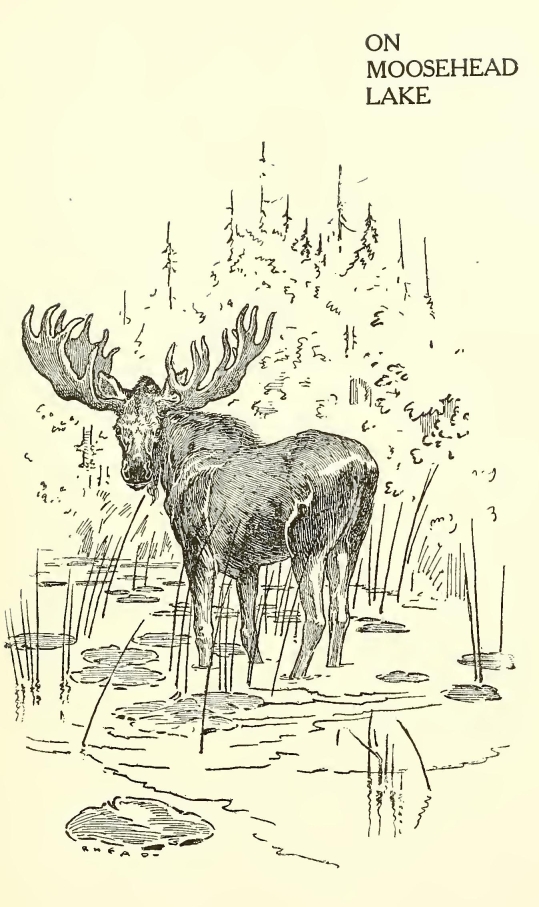
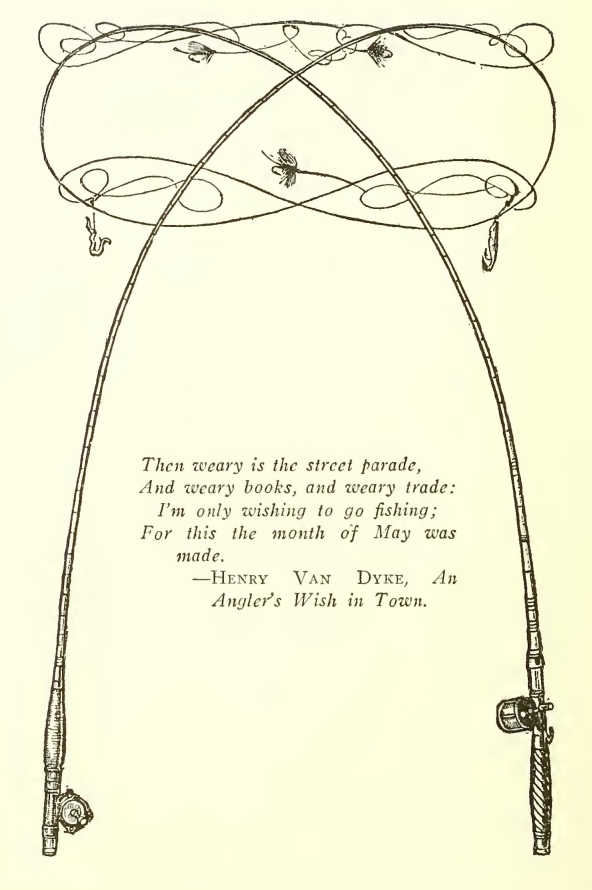
Then weary is the street parade,
And weary books, and weary trade:
I’m only wishing to go fishing;
For this the month of May was
made.
—Henry Van Dyke,
An Angler’s Wish in Town.
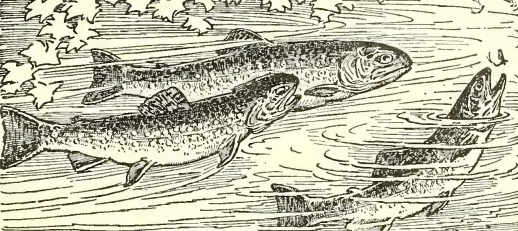
E want a quiet place, free from dudes and mosquitoes, with good good fishing.” Thus food and spoke the tired city man to his friend, the Preacher, and the friend answered, “I have heard of such a haven of rest, far in the east, on the shores of Moosehead Lake.” So it came to pass that we—Nell, little Sue and I—made the long journey of 1,500 miles on the strength of a hearsay. Risky? Yes, but the results amply justified our faith. We found the Peaceful Valley and the House of Rest.
Picture to yourself a long, rambling structure, designed according to no known law save that of utility. Additions have been made from time to time to the original farm-house, resulting in a delightfully unconventional and straggly building; an illustration in wood of the law of evolution. Great barns stand guard on the east and south. Hard by, a cold brook gurgles and laughs on its way to the lake a few rods distant. Take your stand facing the west, and declare your vision. Fifteen miles away, on the western border of the lake, Squaw Mountain lifts its ragged line against the sky. On the left, and close at hand, bold hills bound the view, clothed with timber to their very tips. Far to the north, Spencer Bay Mountain lies like a giant haystack. The waters of the lake dimple and flash in the sunlight, the air is filled with the drowsy hum of insects, and over all is peace. In the words of the ancient hymn, one sings,
“This is the place I long have sought
And mourned because I found it not.”
Now that we are here, what shall we do? Rest? Yes, but it cannot be the rest of inactivity. The woods are calling to us and the waters tempt us. The trout are jumping in the pool just beyond the big stump, and a deer is feeding in the meadow yonder. Great herons fly lazily along the shores of the bay, or go on frog-hunting expeditions among the rushes. Surely, there is something better to do than to loll on the porch, and the first important task is to interview those impertinent trout. Leaders are brought out and soaked, flies selected, the Leonard rod jointed and everything made ready. We start for the brook which seems to be murmuring an invitation, only to run against a very formidable obstacle in the shape of the Maine game law. “All streams flowing into Moosehead Lake are closed indefinitely.” Only nine words gently spoken by the landlord, but they were of tremendous significance. A journey halfway across the continent to fish streams that cannot be fished. The arm of the fisherman is palsied, and his tongue cleaves to the roof of his mouth. Is this the end of all his bright visions? A darkness like that of Egypt settles down upon him, and all joy flees from his heart. Silently he anathematizes the railroad companies for failing to find space in their attractive circulars for this important piece of information. But just when his gloom is deepest, a ray of light appears. “Do you see that red post?” says the landlord, pointing down the stream. “That marks the boundary between the brook and the lake. Below it you can fish to your heart’s content.”
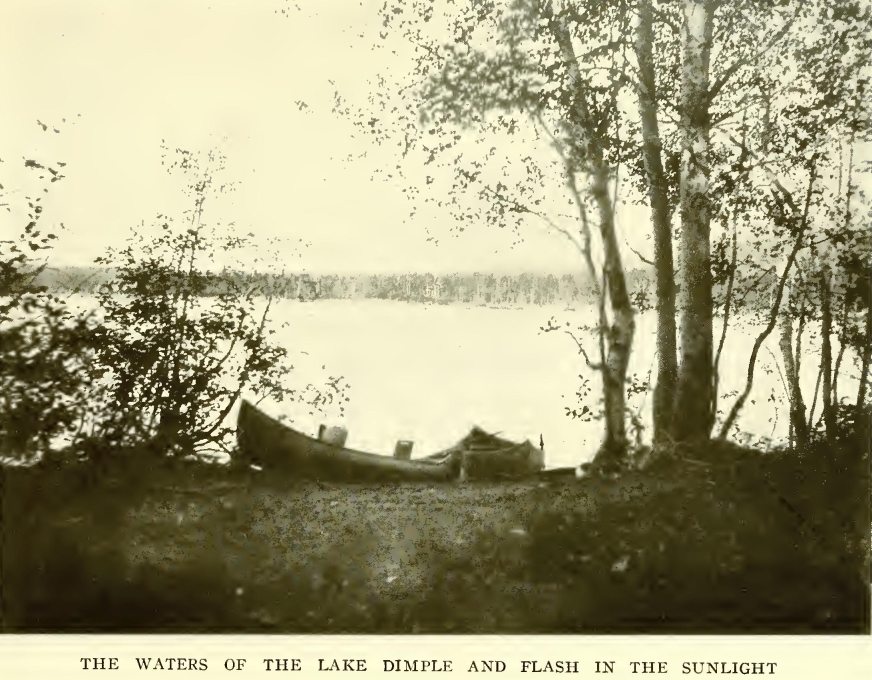
Really, it was not as bad as might be supposed. Fish love the mouth of a stream, and this mouth was of generous proportions and largely patronized by the trout. Many a happy hour we spent on that stretch of water below the post. Possibly, in the eagerness of pursuit, the fly sometimes fell over the line into the forbidden waters; but it is not easy to determine the exact location of an invisible boundary, and the trout had no business to gather in town-meeting just over the line and wink derisively at the irritated fisherman. But, on the whole, we sought to obey the law; not alone from respect for the law, mingled with fear of the game-warden, but, as well, because the best fishing was below the post. Here was a half-mile of water frequented by many noble trout. We will say nothing of the many ordinary trout taken from this stretch of stream, but the story of the fisherman’s experience with one wary old grandpa of the Salvelinus Fontinalis family must be told.
He lived in a deep pool bordered by rushes, where a sunken tree-top afforded an excellent hiding-place. Many smaller trout had been lured from this retreat before the patriarch gave any sign of his presence. One day a huge swirl and a heavy tug set the angler’s nerves to tingling; but the line came back limp, and the disappointed disciple of the immortal Izaak went to the house to tell of the four-pound trout that he had hooked and lost. A week passed, during which time the hopeful fisherman whipped every inch of that water many times, taking not a few, but hearing nothing from the veteran for whom he longed. Then, moved by hunger or contempt, or both, the old fellow snapped at a “Montreal,” and the battle was on. When victory for the fisherman seemed certain and the landing net was almost under the tired fish, he gave a mighty surge and was gone. This time he weighed a plump five pounds on the scales of the angler’s imagination. Other days passed, and then, one evening just as the sun was setting, a “Silver Doctor” overcame the wariness of the spotted warrior, and again the issue was joined between man and trout. The fish knew that there was safety in the sunken tree-top, and made heroic efforts to reach it; but the fisherman knew this also, and met every rush by giving the butt of the rod. The boarders on the hotel veranda saw the conflict and shouted encouragement to the anxious angler. Canoeists stopped at a respectful distance to watch the struggle. Nell was at the oars and kept the boat well out in the middle of the pool. The light rod bent almost double as the sturdy fighter made his great rushes for liberty. The reel buzzed as the fish carried out the line, or clicked gently as the fisherman worked the captive towards the boat.
Any one of a great number of things may happen at such a time. The hook may tear out, slack line is fatal, the line may break, the snood or leader may part, the rod may give way, an earthquake may chance along; in short, there is no catastrophe which is not liable to occur when you have a big fish at the other end of a line. The worst of it is that all these possibilities visit the mind of the fisherman at once. There is one other possibility; namely, that you may land the fish. That is just what happened this time; and when he was fairly in the net that fisherman let forth a whoop which must have scared the foxes on Deer Island, three miles away. How much did he weigh? Such inquisitiveness is really painful; but if you must know, the scales said two pounds, fourteen ounces. All fishermen will understand that a fish shrinks rapidly after being taken from the water, and it must have been at least ten minutes after his capture before he was weighed. This accounts for some things.
Will some wise man rise up and explain the puzzling vagaries of the trout? Why does he strike freely at a certain fly one day, and entirely ignore it on the day following? Why will he sulk for hours, and then make the water boil with his acrobatic exercises? One morning, when all the signs were propitious, Mr. D. and the writer sought the mouth of South Brook, a place famous in all this region for the number and size of its trout. Mrs. N., a veteran angler and successful, was just leaving in deep disgust. She had been fishing since five o’clock and not a strike had rewarded her patient toil. One hour, two hours, we cast in vain. We might as well have been fishing in the Dead Sea so far as any signs of trout were concerned. Under the overhanging alders, by the side of old logs, up close to the bridge, down where the stream meets the bay, back and forth we went, but all in vain. At last, over by the big rock, a splash is heard and the widening ripples tell that a trout has jumped. Quietly we seek the spot. When some forty feet away the flies are sent on their mission, and then follows an experience that cannot be put into words. For fifteen minutes the water fairly foams, as the eager fish leap for the fantastic creations which are supposed to resemble different forms of insect life. The sport is fast and furious. Ten feet of line is as good as fifty, and a frayed fly is as acceptable as a fresh one. They seem to be fighting for the first chance at anything that is offered. Singles reward every cast, and doubles are not infrequent. Three of the number taken, go over a pound and a half each, and not one falls under half a pound. A quarter of an hour of this delirium, and then it is all over. We whip in vain for another hour, and turn towards the hotel, puzzled but happy.
Only a little time have we been in the Peaceful Valley, when moose stories begin to circulate. The rumour goes that Mr. P., a camper, has seen a bull moose in the north meadow, and watched him feed for more than an hour. Louise, the dining-room girl, declares that she frequently sees a moose feeding in the “logan” when she rises about daybreak. (Will some etymologist settle the derivation of that word “logan”? About Moosehead it seems to be applied to a bay of any sort or condition. Is it a corruption of “lagoon”?) The Higher Critic kindly calls attention to the evident unreliability of these stories. We know the habits of the moose. It is a shy animal, and seldom comes out into the open. If it should venture out it most certainly would not approach a summer hotel. Granting that some demented specimen might visit a clearing in which is a hotel, it would do so only under the protection of darkness. The stories are evidently mythical. Only a few days later the Higher Critic receives a distinct jar when he is awakened at early dawn one morning by a tapping at his door and hears a low voice saying, “There’s a moose in the logan!” The shadows of night are not entirely gone, but it is light enough to see distinctly the dark object standing in the water and tearing at the lily-pads. A cow? Too large and too high at the shoulders. A horse? No horse ever had such ears or such a head. Although the H. C. has never before seen a moose outside of a zoological garden, one glance convinces him that his theory is seriously damaged.
A few days later, as the guests are eating their midday meal, the small boy rushes into the dining-room and shouts, “Moose in the logan!” In an incredibly short space of time the boarders have exchanged the dining-room for the garden fence, and are looking down upon such a sight as even dwellers in the Peaceful Valley seldom see. In the middle of the logan, and not more than forty rods away, stands a cow moose with her calf by her side. The mother plunges her muzzle into the water in search of food, lifts her head and munches for a time, and then repeats the process. All the time the tail is switching at the flies, and the great ears are slowly moving back and forth. Neither mother nor child seems to pay any attention to the spectators, and both remain perfectly unconcerned until the small boy begins to whistle and shout. Then, without any signs of fear, they walk out of the water, trot slowly across the meadow and disappear in the woods. The H. C. sadly lays his theory away in the mausoleum where so many of its kindred rest.
By this time some reader is saying, “I don’t care anything about the moose, and less about the fishing. Didn’t you go anywhere? Didn’t you see anything worth writing about?” The rebuke is deserved, and the writer hastens to say that Moosehead Lake is forty miles long and fifteen miles across in the widest part, having an estimated shoreline of something like 400 miles. We saw it all, from Greenville to Southeast Carry; but he would be a brave man or a rash one, who would undertake to put its beauty into words. We drove to Roach River and, from the neighbouring hilltop, looked down upon the sparkling waters of Roach Pond and away across miles of forest to mighty Katahdin. We followed the old lumber roads into the depths of the wood, where the silence is broken only by the chatter of the red squirrel or the harsh cry of the bluejay. In the cool evenings we sat around the wood fire that crackled and leaped in the great open fireplace in the House of Rest, and heard the guides tell stories which would have made Baron Munchausen turn green with envy. We even went to Mountain Pond, six miles away, and all the way up hill. No wagon could make that trip and survive. The lazy man had a chronic dislike to walking six miles up hill on a hot August day, and, in a moment of forgetfulness, accepted the loan of a friend’s horse. He had not been on a horse in fifteen years and had forgotten the eccentric motions which that animal makes in scrambling over rocks and corduroy roads. However, he lived to reach Mountain Pond, and spent the night with three friends in an “A” tent. Don’t ask about the fishing, for it is a subject upon which the writer does not care to dwell. The wind blew a gale every hour of the day spent on Mountain Pond, and you can safely write the sign of equation between the results of that day’s toil and those secured by Peter and his companions engaged in a similar enterprise.
That was a never-to-be-forgotten night. The wind roared incessantly among the trees, the tent shook and flapped, an obtrusive root insisted upon being familiar with our ribs, and, to complete the enjoyment, a hedge-hog made us a call. That call afforded the one bit of comfort in an otherwise dreary night. To see the artist, in scanty attire, chasing that hedge-hog around the camp-fire at two o’clock in the morning was a sight to warm the cockles of the heart. To the artistic temperament there was nothing attractive in slaughter, but if the well-armed marauder could be caught alive and taken down to the hotel, that would be worth while. Finally, a well-aimed blow stunned the animal and he was hastily thrust under an empty box with a sufficient number of stones piled upon it to prevent it from being overturned by any exertion on the part of the captive. When daylight came, the box was in its place, but the hedge-hog had gnawed his way to liberty. That we did not extract his teeth before imprisoning him was a fatal oversight.
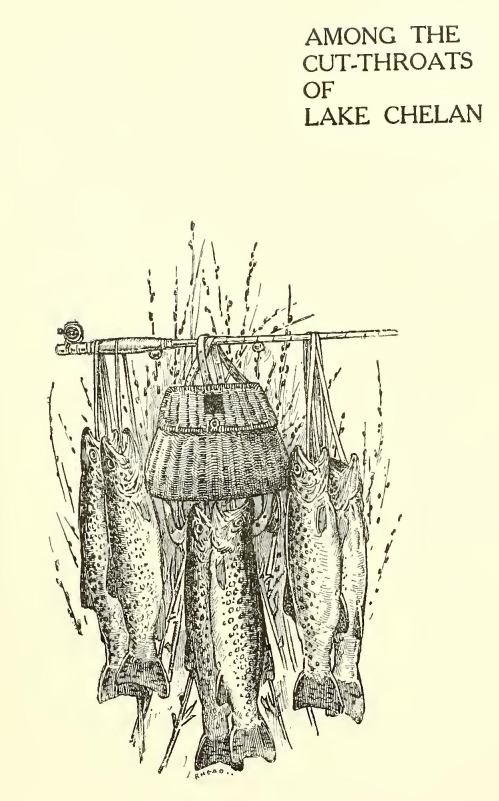
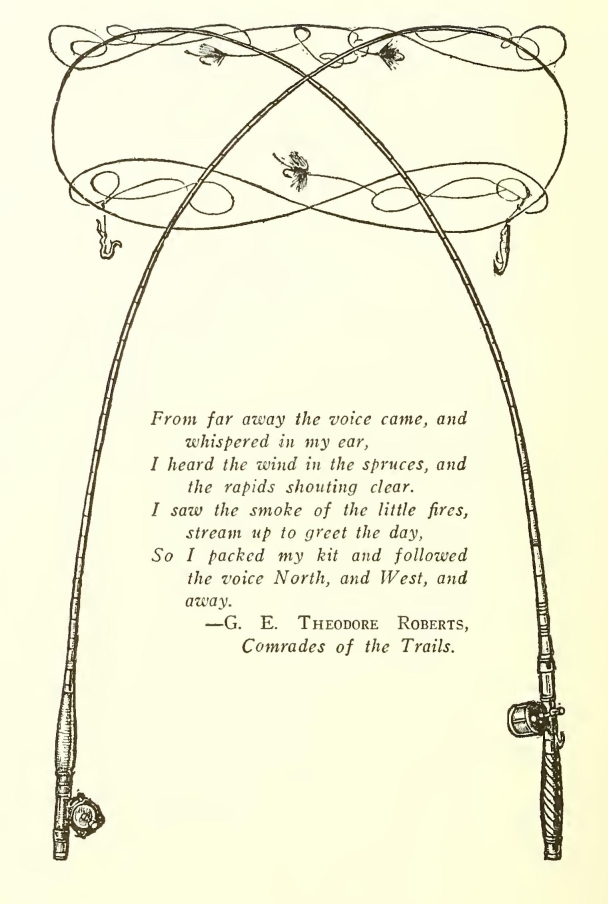
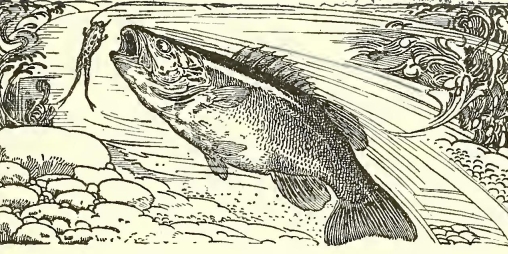
ON’T be frightened! The writer has not turned desperado, neither has he fallen among men of bloody practices. In order that all minds may be set at rest before we go further, be it known that this is but a fish story pure and simple. The brother with the melancholy mind and ossified piety will do well to stop here and turn to “Foxe’s Book of Martyrs” or some other literature of that order. The elect few who love the open, rejoice in God’s out-of-doors and the beauty of lake and mountain, may safely venture to read this frivolous story of a side-trip made by one of the delegates to a church convention.
What have cut-throats to do with fishing? Patience for a moment, you who live east of the Mississippi! The Pacific Coast dwellers will need no explanation, but for the benefit of the unenlightened it may be said that in common parlance the “Salmo Clarkii” is known as a “cut-throat.” This appellation has nothing to do with the character of the fish, for he is an eminently respectable citizen of the watery world, but is due to the presence of a blood-red line on either side of his throat which by an extreme stretch of the imagination may be made to resemble a bloody cut. It is said that when he has access to salt water the cut-throat ranges far seaward, in which case he loses his black spots and takes on a coat of silver; but he still holds fast to his crimson necktie.
Doubtless the next question will be, “Where is Lake Chelan?” If you are too indolent to look it up on the map of Washington, follow the trail of the fisherman. He took the Great Northern road from Seattle, crossed the beautiful Cascade Mountains and left the train at Wenatchee. It is alleged in a multitude of highly coloured circulars that this is the “home of the big, red apple.” A trustful habit of mind makes us ready to believe this, although the aforesaid big, red apple was not at home when we were there. He is expected to return in the fall. There are orchards and orchards, and then more orchards.
An enthusiastic friend had pictured the beauties of the Columbia River Valley, and when we took the boat at Wenatchee for a forty-mile ride up-stream, anticipation stood on tip-toe. To be sure, aside from the orchards there was nothing attractive in the country around Wenatchee, but we felt sure that it would be “better farther on.” But it wasn’t. Possibly our æsthetic sense had suffered from a stroke of paralysis; if not, a muddy river, sage brush and alkali dust, brown, treeless hills and a general air of desolation do not combine to form an entrancing picture. To be sure, there are spots of green where fruit-trees have been planted and water from the river or from some irrigation ditch is led in and out through the orchard. But to one who has seen the beauty of an eastern landscape, before whose eyes comes a vision of stately trees and luxuriant meadows and babbling brooks of clear, cold water, those little dabs of green in the midst of wide stretches of dreariness awaken pity and not admiration. There is nothing either in the accommodations on the boat or in the scenery to make the traveller long to repeat his ride from Wenatchee to Chelan Falls.
It is said to be four miles from Chelan Falls, on the Columbia River, to the foot of Lake Chelan. We believe it, and would just as readily believe that it is ten miles. The fact is that the miles are perpendicular. You are either going up or down all of the time. Lake Chelan lies four hundred feet above the Columbia River, and the road borders the stream through which Lake Chelan discharges its waters. On second thought that word “borders” does not fit. The road transcends the stream; looks down upon it. At one point in the journey you gaze downwards some five hundred feet upon the boiling, turbulent waters which have made a way for themselves through a crevice in the rock. The colour reminds one of his boyhood when he interviewed the bluing water in the family wash-tub.
Lake Chelan, at last, and a hotel for the night, as the boat does not leave for the upper end of the lake until morning. It was an eventful night not only because the inhabitants of the village were celebrating the “glorious Fourth,” but chiefly from an important archaeological discovery made by the writer. Many of our readers are familiar with the account given in the Bible of the pillow upon which Jacob spent a dream-filled night. That identical pillow is in a hotel at Lakeside. It must be confessed that this is a deduction and lacks absolute historical verification; but as Jacob’s pillow was of stone and the Lakeside pillow is of the same material, and inasmuch as we have no record of any other pillow of that kind, it is a fair inference that Jacob’s famous head-rest has been identified. If any one questions the deduction let him try the pillow.
It is fifty-one miles from the foot of Lake Chelan to its head, and with each mile as one goes north the scenery grows more beautiful. The mountains at the lower end of the lake rise to a height of three or four thousand feet, while at the upper end they tower nine thousand feet almost precipitously from the water. The water of the lake is clear and blue, the mountains crowd upon it in their silent majesty, the air is clean and refreshing.
On some still morning when the winds do not disturb the bosom of the lake, nature is at its best. In the lake we saw pictures that cannot be reproduced by any skill of man; miles of flawless mirror in which mountains and crags and trees and clouds were reproduced with matchless fidelity. Sometimes the clouds hung for hours over the summits of the mountains, and here and there were great masses of snow which no summer heat could banish. Looking up the valley of the Stehekin towards the north, twenty-five miles away rises a huge mountain, down the side of which a giant glacier makes its way. And the best of all is that here one is “far from the madding crowd.” At the head of the lake is a hotel and a fish hatchery; no store, no factory, not even a Chautauqua.
It has taken a long time to get to the cut-throats, but we have arrived at last. The books on fishing assure one that the cut-throat “takes the artificial fly greedily,” and all the way the right arm has been fairly tingling with anxiety to begin casting. Alas! and again alas! The hotel clerk says that it is too early for the fly; we must use bait or a spoon. It is the old story over again. Did you ever travel far to a famous fishing ground and find the conditions just right? It is always too early or too late, the water is too high or too low, something is the matter which effectually prevents the best sport. But the man who has lugged a bundle of fly-rods to the church convention that he might use them on Lake Chelan is slow to believe that all his enterprise has been in vain. He will give them a try before abandoning hope. Behold him, then, whipping patiently on the edge of sand bars, in the swift water, under over-hanging bushes, in the shadows of great rocks, here, there, everywhere except on the board walk and the roof of the hotel; but so far as results are concerned he might as well have cast his flies in State Street, Chicago. Nothing doing; not even the feeblest answer to his invitation. Meanwhile a fellow-boarder is fishing with bait, using a bamboo pole about sixteen feet long and derricking fish in with a regularity that is equalled only by his evident ignorance of all the fundamental principles of true sport. But he gets the fish. If one is fishing for market he may use a telegraph pole or a net; but if he has in him something of the temper of the famous Izaak, fishing is more than meat. He loves the water and the sky, is made captive by the beauty of stream and mountain, delights to pit his wits against those of the wary citizens of the pool.
But what is to be done? No one has yet been found who can compel a trout to go after the fly when he does not wish to. We troll with a Dowagiac spinner, and the result, in number of fish, is distinctly satisfactory. As the trolling is done with a steel rod there is a certain amount of sport in the exercise; but at the best it is far below fly-fishing.
This story, thus far, has been written with careful attention to facts in order that it may bear the scrutiny of certain friends who companied with the writer for a short time at the head of the lake. They were good men and true, lovers of God’s out-of-doors, delightful comrades. Their company was a joy, but their presence was embarrassing. Every one knows that witnesses are unnecessary in fishing. To have some one at your elbow who wants to know just how many you have caught and what they weigh, allows no room for that play of the imagination which gives to fish stories their indefinable charm. It was a dark hour for the writer when these good friends turned their faces towards the south and left him desolate, but it was then that the fishing really began.
Just where the Stehekin makes its final plunges before joining the lake, there is a reach of rippling water bordered on one side by low-growing trees, and on the other by a great bunch of drift-wood. The fly-rod was put in commission, a sinker was used, and a bit of the white throat of a trout took the place of the artificial lure. With the boat lying against the drift-wood a cast was made towards the trees, the bait allowed to sink and then drawn slowly towards the boat. Was that the bottom? Hardly, for it is tugging and lunging and rushing back and forth across the narrow water. The light bamboo meets every lunge, and the fight goes merrily on for ten minutes or so, when a beautiful Dolly Varden trout is brought to net. Another cast and another strike. This time the visitor has succeeded in getting on the other side of a log that juts out into the stream from the drift-wood. So much the better for the sport. Gently, little by little, he is persuaded to travel towards the end of that log, until, after many efforts, the line swings free. A long, delightful tussle, and he joins his comrade in the bottom of the boat. Lest the reader’s patience should give way under the strain of detailed description, suffice it to say that from that one spot six Dolly Vardens were taken, not one of which weighed less than three pounds.
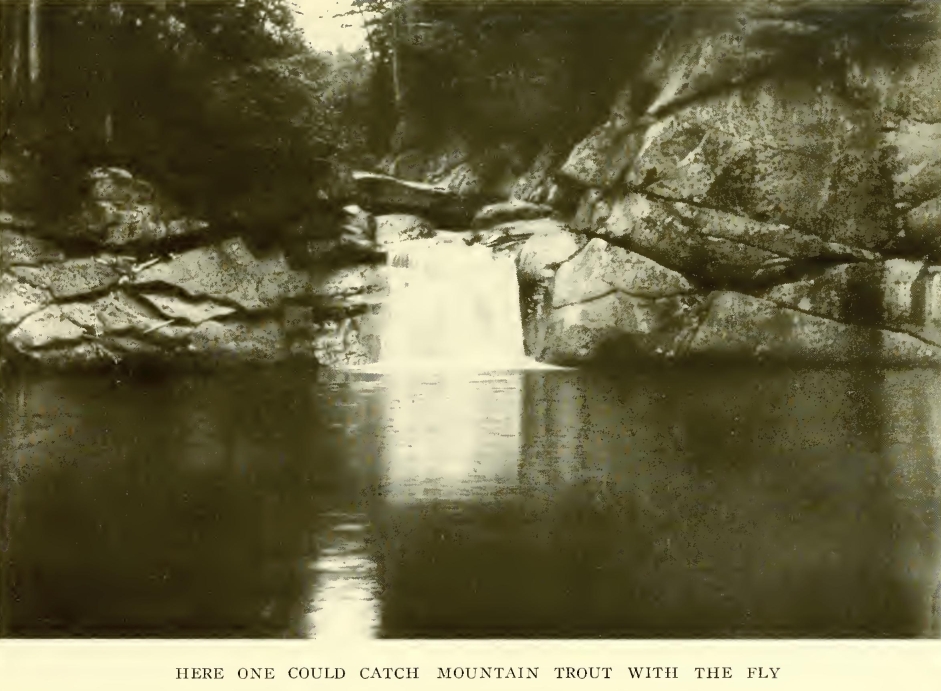
But fly-fishing was found, such as it was. Two miles up the valley Boulder Creek comes down the canon and empties into the Stehekin. We were told that here one could catch mountain trout with the fly. A mile beyond Boulder Creek are the Rainbow Falls, where a stream drops over the eastern mountains for a sheer plunge of three hundred and twenty feet. One day was all too little to devote to the beauty of this scenery and an excursion up Boulder, but it was a day well spent. The trout were there; little fellows among whom a nine-inch fish was a giant. The farther one went up the canon the better the fishing grew and the more plentiful and vindictive the mosquitoes became. The fish bit readily and the mosquitoes more readily. One could have filled a basket with small fish, but after saving a dozen for dinner the rest were thrown back. Zest was added to this excursion by the information that rattlesnakes frequented these rocky slopes; so the fisherman walked softly and kept an eye to windward.
Mountains and forests, dancing streams and beautiful lake, quiet and—fish! What more could one wish who seeks rest for tired nerves? Some time they will build a railroad in there, and then Lake Chelan will be easier of access, but less to be desired than now. When the crowds come, half of its present charm will be lost.
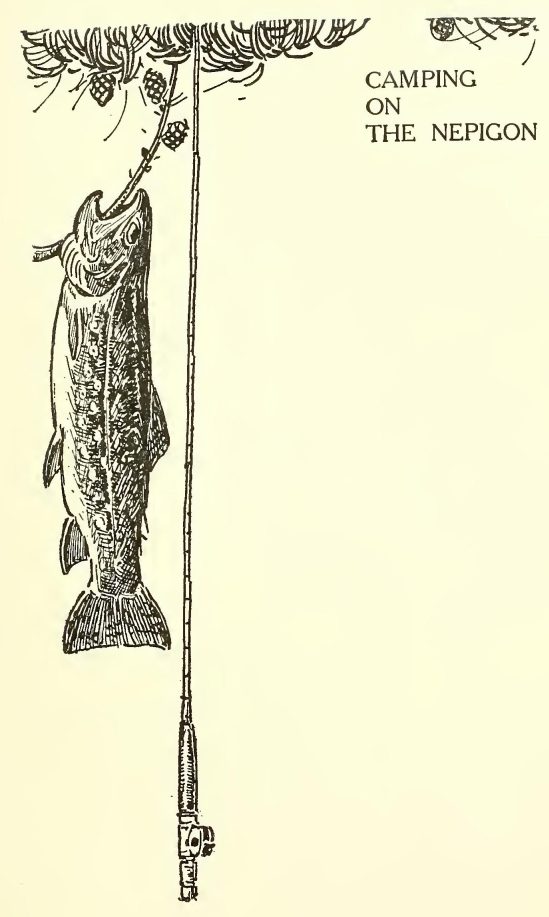
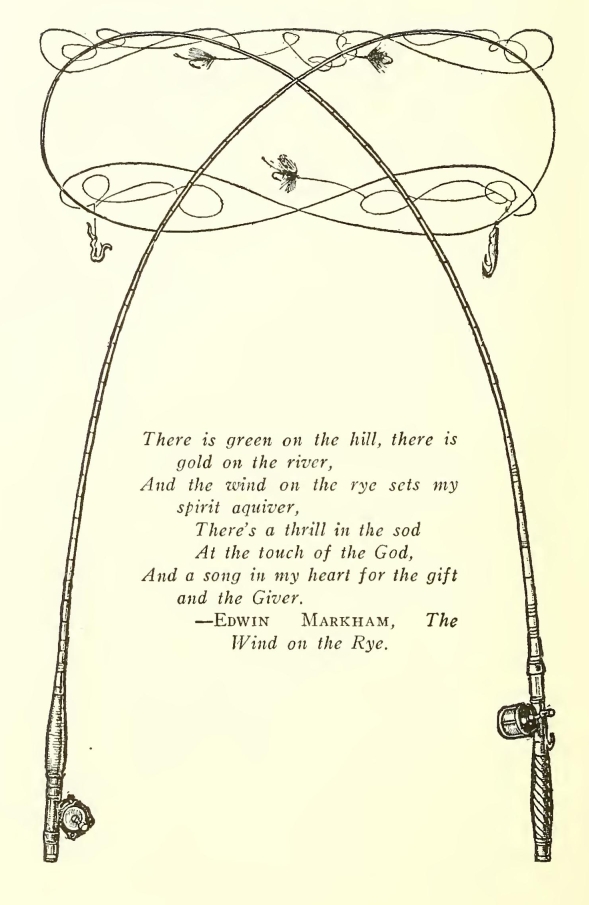
There is green on the hill, there is
gold on the river,
And the wind on the rye sets my
spirit aquiver,
There’s a thrill in the sod
At the touch of the God,
And a song in my heart for the gift
and the Giver.
—Edwin Markham,
The Wind on the Rye.
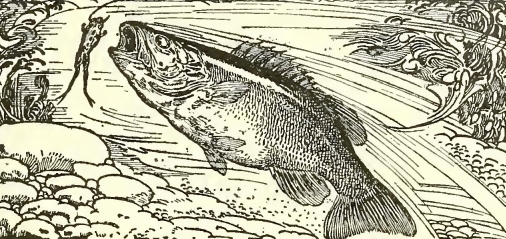
“Three fishers went rolling out into the North;
Out into the North as the sun went down.”
F that is plagiarism, make the most of it. It is a fact. There was the Business Man, the Doctor and the Preacher; fishermen all. They preferred to roll rather than to sail, because they were in a hurry. They rolled north rather than west, because the best trout stream in North America lies between Chicago and Hudson’s Bay. Who has not heard of the famous Nepigon? What angler has not dreamed of battling with the giant trout which inhabit its waters? For months the Business Man, the Doctor and the Preacher had been examining their rods, looking over tackle, selecting flies, laying plans and looking forward with feverish anxiety to August first.
The evening of that day found us on board a vestibule Northwestern train, bound for Duluth and the Nepigon. At Duluth we exchanged rolling for sailing—by steam. If the weather had been at all nasty, we should have combined rolling with sailing; for the little tub which plies between Port Arthur and Duluth was evidently designed to exemplify all the possibilities in the way of tumbling about. But Lake Superior was on its good behaviour, with its face as smooth and calm as that of a sportsman when he has just landed a five-pound trout. The captain was one of the most genial of men, and the cook was undoubtedly a genius. We were not privileged to meet him personally, but we had abundant evidence of his culinary skill. The memory of his soup will linger with us forever. After mature deliberation we unanimously agreed that it was unlike anything we had ever tasted. We tasted it but once, for whatever other failings we may have, we are not greedy—at least for soup made from a strong decoction of musty hay, flavoured with extract of logwood. The polite waiter, observing that the Business Man was playing with the soup spoon instead of eating, mercifully inquired, “Have you got tired of your plate?” Disgust, relief, unsatisfied longing and a choice variety of unclassified emotions expressed themselves through the hasty affirmative of the B. M.
If this chapter did not aim to treat of fishing, the writer would be tempted to say that Port Arthur is “beautiful for situation.” It lies one hundred and eighty miles east of Duluth on the north shore of Lake Superior. At this point the land rises gently from the lake shore, and from the elevation in the northern part of the town a beautiful panorama is seen. Immediately before us is Thunder Bay, hemmed in by the rocky walls of the mainland, Pie Island and Thunder Cape. A narrow passage opens out into the lake, through which Isle Royal may be dimly seen in the distance. Thunder Cape rises to a height of fourteen hundred feet, and Pie Island—which takes its name from its shape—is not less than one thousand feet high, with a little lake on its top. The sides of both island and cape are exceedingly bold. We watched them one August night as the setting sun touched the bold rock into gold and purple, and saw the shadows steal over the waters and up the precipitous sides of the cliffs until water and cliff were hidden in the darkness.
But we must get on to Nepigon, seventy-five to one hundred miles away. We take the train on the Canadian Pacific, and glad are we when the conductor shouts out, “Nepigon.” We look out with curious eyes upon the famous Canadian city. There are four log-houses, a store and a hotel. We afterward found the Hudson Bay Company’s store, and the comfortable house occupied by the agent. In fact, this same agent was the immediate object of our search, for he had kindly undertaken to engage guides and make the other necessary arrangements for our trip up the river. He proved to be one of the most courteous and obliging of gentlemen, and spared no pains to assist us in preparations for the trip. To his wise selection of guides was due much of the pleasure of our outing.
Behold us on a sunny morning fairly embarked and headed up the noble Nepigon. A little geography and guide-book eloquence might be appropriate just here. The Nepigon River is the largest tributary to Lake Superior. It is about forty miles in length, and the outlet of Lake Nepigon, a body of water seventy miles long by fifty miles wide, with a shoreline of five hundred and eighty miles. There is a fall of one hundred and thirty feet in its course of forty miles, and that means numerous cascades and rapids. But the fact of prime importance is that this river is the home of big trout; not only large, but pugnacious. They are the Sullivans—beg pardon, I mean the Johnsons—of the Salmo Fontinalis family.
But this is getting ahead of my story. We are just starting up the river. Let me introduce you to our four guides: Aleck De La Ronde, Joe Kejigos, Vincent Ashawikyegulap and Zavier Misak. They are Ojibway Indians. Aleck, the head man, not only speaks English, but reads and writes. Joe speaks a little English, and the other two none at all. Two birch-bark canoes are loaded with our tents, duffle and provisions. If any reader imagines that to camp out is to go half starved, let him cast his eye over this list of eatables: ham, bacon, potatoes, flour, eggs, baked beans, canned soups, chicken, beef, peaches, apricots, maple syrup, preserves of various kinds, condensed milk, bouillon, etc., etc. However, we needed all our provisions, and even more, for a camp appetite is sure to be large, vigorous, and in a chronic state of discontent.
Now we are off. The river at this point has broadened out into a beautiful lake. Yonder, upon the eastern shore, nestles the Roman Catholic mission house. All of our guides, as well as the majority of the six hundred Indians upon the reservation, are members of this communion. No one who talks with them can doubt that their religion is real. It affects their lives and controls, in some measure, their actions. Yonder, toward the south, a great mass of red rock lifts itself high in the air, and for many years it gave the name of “Red Rock” to this section. The Indians paddle and jabber. It is comforting to be told by Aleck that there are no “swear words” in the Ojibway language; but for this assurance we should have thought our guides horribly profane. The language sounds rough and full of imprecation. How our conception of the morose and taciturn Indian vanishes in the presence of these light-hearted, genial and loquacious red-men! They are children, full of mirth, fond of companionship, kindly in disposition, honest and faithful. We pass the neat log cabins of our guides, catch glimpses of a few wigwams on the western shore, and by five o’clock in the afternoon land at Camp Alexander, some twelve miles from Nepigon station. This camp is on a large pool at the foot of a rapid. The water comes foaming down through the narrow pass between the rocks, and then swirls and eddies and boils and bubbles before beginning its quiet journey toward the lake. It is just the place for trout. Rods are quickly assembled, flies carefully selected, and, trembling with eagerness, the fishermen make their way to the stream. And now comes a humiliating confession. The Preacher is the first to reach the river, and in a moment more his flies are dancing in the eddy. To his surprise nothing disturbs them. He casts again and yet again, but all in vain. So far as any signs of trout are concerned he might as well cast upon the pellucid waters of the Chicago River. Then comes a terrible temptation. A wily fiend whispers in his ear, “Try a worm.” Now the large-hearted Hudson Bay agent had presented the Preacher with a box of choice angle worms, and said box is at that moment in the ministerial pocket. Another ineffectual cast of the flies, and then “What a fall was there, my countrymen!” Off come the flies and on goes a fat worm. Gently the wriggling bait is dropped into the water, just in the shadow of a huge rock, when, tug—zip—whoop—“Hello! Bring the landing net!—Quick! I’ve got him!—Hurry up!” The air is heavy with the Preacher’s cries, and the rod is springing under the mad dives of the trout, and then—it is all over, and out on the grass lies a beautiful “two-pounder,” and the Preacher is suffering from the taunts and jeers of the Business Man and the Doctor: “Caught it with a worm!”
“What kind of a sportsman do you call yourself?” The pride begotten by capturing the first fish is knocked down and trampled upon by the shame of having been unsportsmanlike. Let it be said that the next day that box of worms was lost and never found.
Back to camp, where we find the tents up and supper well under way. That first supper in camp! Three hungry men devoured everything in sight, until it came to pancakes; then they paused, not from lack of appetite, but from fear of a sudden and horrible death. From what ingredients Joe, the cook, compounded those cakes will remain a mystery forever. It was suggested that he had cooked a flannel blanket or a pair of gum-boots, but he denied it. We ate very sparingly of the cakes, and soon afterward went to bed. That night the Preacher had a dream. An enormous bird, with curved beak and fierce eyes, persisted in roosting upon his stomach. Nor would the bird stand still, but with fiendish malignity curvetted and danced and double-shuffled, greatly to the Preacher’s discomfort. The unfortunate victim expostulated mildly, but the bird laughed him to scorn. Then the Preacher pushed the dancer off, but the bird hopped back at once and proceeded to execute a Highland fling. Then the long-suffering Preacher arose in his wrath and, seizing a knife, cut the bird’s head off. Horror! No sooner was the “foul” deed accomplished than the bird proved to be a man, and the Preacher was hustled before a Chicago court to be tried for murder. The prosecuting attorney showed beyond a question that the Preacher had deliberately killed this man. The lawyer for the defence submitted, first, that the man had no business to assume the form of a bird; second, that the stomach of a Preacher should never be used as a dance hall. The jury retires and is gone for only five minutes. The Preacher trembles in the box, and as the jurymen file back into their seats he—awakes. The verdict will never be known, although the dreamer did his best to go to sleep again at once and find out the decision.
The Doctor also had his experience that first night in camp. He was shot. As he lay listening to the gentle breathings of his tent-mates a sharp report, as of a gun, was heard, and he felt a bullet strike him over the heart. The end had come. It was hard to die so young, far from his dear ones, in the depths of the wilderness; but being a good man and a philosopher he whispered farewell to this world, composed his limbs and calmly awaited death. But it didn’t come; so the Doctor proceeded to make a diagnosis of his case. After thorough examination he found that the string stretched from the rear to the front tent pole and upon which various articles were suspended, had broken, and the looking-glass had struck him in the ribs. He took a long breath, went to sleep, and told us the joke in the morning.
Early the next morning we broke camp and were on our way up the river. In order to get around the rapids a portage of two miles is made at this point. It was a novel sight to see our guides packing the provisions, cooking utensils, etc. The white guide in the Adirondacks would carry it in a pack basket; but the Indian makes a large bundle which he ties together with the ends of his packing strap—some twenty feet long—leaving the central and wider portion of the strap to pass over his forehead, thus supporting with his neck the burden which rests upon his shoulders. The average load for a packer is two hundred pounds. When night comes we are at Split Rock, where we camp, and the next day make Pine Portage. Here we camp for a week, and really begin to fish. There is a splendid stretch of broken water right in front of the camp, and good pools within a short distance either up or down the river. The Business Man goes down the river one morning and comes back with a pair of trout which weigh nine and a quarter pounds. Then the Doctor sets the camp in turmoil by taking a five and a quarter pound fish. The poor Preacher rejoices in the success of his brethren, and tries hard to beat them; but four and a quarter pounds is the best he can do. Large numbers of trout are taken, ranging from two to four pounds apiece, but it is the big trout we want. How swiftly the days pass! A week has gone, and if we are to go as far as Lake Nepigon, we must push on. We break camp reluctantly, for this place seems like home to us. We have become familiar with every rock in the stream, with every eddy, almost. We have watched the sun go down in the woods which stretch unbroken for uncounted miles to the west, and have seen the yellow moon lift itself above the bold shoulder of the mountain which borders the river on the east.
But we have heard great stories of the fishing higher up, and away we go. Camp Victoria! Magic name with which to conjure scenes of the rarest pleasure! Here, where the swift-rushing river forms our front door-step, we make another long halt. Here, about ten rods below our camp, a gentleman from Woodstock, Ontario, took an eight-pound trout only last week. Here the Preacher caught three trout weighing five and a quarter, five, and four and a half pounds, respectively, and took two of them in two successive casts. Here Aleck, the head guide, broke the game law, and we became partakers of his crime by eating broiled partridge for supper. From this point we made excursions to Lake Nepigon, and found that the half had not been told us as to the beauties of this inland sea. Bold, rocky shores, clear, blue reaches of water, islands small and great, unbroken wilderness all about, with the August sun smiling down upon this unsullied work of God. A fairer picture man never saw.
From Camp Victoria we visited Virgin Falls, where, just after the river leaves the lake, the water, pressed in between walls of rock, has a sheer fall of some twenty feet. And what noble fish we took at this camp! Great lusty fellows, lying in swift running water, and with every muscle seasoned and wiry! Poems in gold and brown they were. The rougher the water the larger and gamier the fish. It was here that the Doctor had had an attack of sea-sickness. They were out in the rapids, anchored, and the canoe was dancing about in the current, when the Doctor suddenly lost all interest in everything above his head, and fastened his gaze upon the bottom of the river. He heaved—well, call it a sigh; now draw the veil.
Our camp was upon the solid rock, but when the thunder-storm was abroad in the land, that rock shook and trembled. We shall not soon forget that night of storm when our tent seemed a target for the lightning. In the morning we found two great pines rent and shivered by the electric bolts.
The Indians have their own explanation of a thunder-storm. The thunder is the noise made by a giant bird as it beats its wings against its body; the lightning is caused by the bird winking its eye.
The story of those idyllic days would require a volume for its telling, and the patience of the reader is probably exhausted long ere this. There came an evening when Joe placed a dish before us and announced, “All potatoes.” To be sure they were all potatoes. Did he imagine that we would take them for billiard balls? But there is a deeper significance in his words. After a wild struggle with our language, he manages to say,
“Potatoes all gone.” This is the beginning of the end. A hasty examination of the larder shows us that we have barely enough provisions to last until we can reach civilization. It is the Business Man’s appetite that has undone us. He is not large in stature, but he has developed an appetite that would paralyze a boarding-house keeper. The worst of it is that his appetite has gotten away from him, and goes roaming around among the victuals seeking what it may devour. Sadly we pack up and turn our faces toward the south. Word is brought in that Mary, the little daughter of our head guide, is dead. We press hurriedly on, through the sunshine and the beating storm, and within twenty-four hours from the time when the tidings reached us, our canoes are before the little cabin and we watch the sorrowing father as he enters his darkened home.
“Death comes down with reckless footsteps,
To the hall and hut.”
Sitting on the hotel piazza at Port Arthur, the Preacher watched the steamer on which were the Business Man and the Doctor, until it became a speck on the horizon and vanished from sight. He said in his heart, “Those are good men and true. Dear friends before, they are still dearer after the crucial test of camp life. God bless them alway.”
To stand within a gently gliding
boat
Urged by a noiseless paddle at the
stern,
Whipping the crystal mirror of the
fern
In fairy bays where water-lilies
float;
To hear your reel’s whirr echoed
from the throat
Of a wild mocking bird...
This is to live the old days o’er
When nymph and dryad haunted
stream and glade,
To dream sweet happy dreams of
having strayed
To Arcady with all its golden lore.
—Charles Henry Luders,
Haunts of the Halcyon.
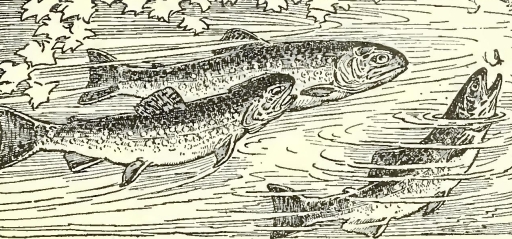
LORIOUS Kootenay!” That’s what the folders call it, and if any more intense adjective could be found that too would be tacked on. That Canadian Northwest strains the English language tremendously. “Magnificent,” “splendid,” “grand,” “glorious,” are worn to frazzles by constant use, and were it possible to roll them all into one big word, it would still be utterly inadequate to express the native’s admiration for his country. The chances are that the reader does not even know where the Kootenay is, and, while we have a distinct aversion to playing the part of a guide-book, we will go so far as to advise consultation of a good map of British Columbia. Down in the southeastern corner you will find Kootenay Lake and River, but the map does not reveal the rugged mountains, the wine-like air, the sparkling water, the sunshine, the peace, the restfulness, the TROUT that make the Kootenay one of God’s best gifts to man.
The confession may as well be made first as last that we went to the Kootenay country for the express purpose of fishing. This is no disparagement to the people or to the scenery, for each stands at the head of its class. But some philosopher has said (or if he has not he ought to have done so): “Count that vacation wasted in which you do no fishing.” Wasting a vacation is sinful; therefore we fish. Here in the Kootenay are trout worthy of one’s skill; heroes of many battles; cunning and adroit veterans who know all the tricks at the command of the enemy.
Just below the point where the Kootenay River breaks out of the lake is the little hamlet of Proctor. There is not much to the place but the hotel and the name—yes, and the trout. The river is wide and deep, with swift current and numberless counter-currents. Where the water rushes around some rock or point of sand, where current struggles with current and a great swirl grows out of the conflict, there the rainbow-trout hold their town-meetings. We attended some of them and tried our uttermost to break them up. It was in a visit to one of these gatherings that the Junior made his bow to the inhabitants of the Kootenay waters. Behold the young man (not quite four years old) seated in the stern of the boat, rod firmly grasped, determination in his eye, while his aged sire works the oars. To and fro over the waters for a little time, then the rod bends sharply back, and far behind a quivering mass of colour springs into the air and falls back with a mighty splash. “I’ve got him!” cries the Junior, and “Hang on!” cries the Senior. And he does hang on. Great boy, that! He’s as quiet and self-controlled as if only purloining cookies out of the jar in the pantry. It must be confessed that the fond father gave a little aid in landing the victim, but what of that? A noble two-pounder is lying in the bottom of the boat, and if there is a prouder mortal in the universe than that boy it is his venerable father.
But it is the house-boat concerning which we set out to write. Be it known that the Canadian Pacific Railway Company maintains a finely furnished house-boat on the Kootenay waters for such visitors as may desire to realize the utmost of human happiness. Can you see it in your mind’s eye? Sixty feet long by about twenty in width, four staterooms with two berths each, servants’ quarters, kitchen, pantry, storerooms, toilets, cabin. On the upper deck are chairs, and here, under the shade of the awning, we rest after the arduous labour of doing nothing. The houseboat is towed to any point on river or lake which you may select, and tied up to the shore. The steamer stops daily on its trips from Nelson to Kootenay Landing to take your orders for provisions or to bring supplies. A Chinaman does the “house work,” including alleged cooking. Do you get the picture?
It was five o’clock on a Friday afternoon when the tug and the house-boat picked us up at Proctor. By “us” is meant the Preacher and his family, together with the Doctor and his daughter. The wind was blowing fresh from the south, and our destination was twenty miles away. Once out of the river where the wind could get a fair chance at us, and that house-boat began to buck. Perhaps you think there are no possibilities of a heavy sea on an inland lake. If so, you will do well to think again. Kootenay Lake is more than one hundred miles long with an average width of some five miles. Great mountains guard it on either side, and up that long tunnel the wind came with a whoop. The boat was lashed to the windward side of the tug, and so was in position to get the full benefit of any slap that the waves thought best to give. We rose and fell and heaved about. The hawsers were not absolutely taut, and ever and again the boat would be knocked against the tug with a jar that made everything rattle. It was time for supper, and the potatoes were on to boil and the tea-kettle was just beginning to sing, when a huge wave lifted us up and hurled us against the tug. Over went potatoes, tea-kettle, kerosene can and everything else that was not nailed down, while the dishes flew from their resting-places and smashed to pieces on the floor. Who cares? Certain members of the party did not, at any rate, for they had lost all interest in the food supply, and were in retirement. Huge joke, to be sea-sick on a house-boat! The captain yells from the tug that we must abandon the thought of making Midge Creek that night, and heads for Pilot Bay, across the lake. Blessed haven! In a landlocked harbour anchor is dropped and in a short time order is brought out of chaos, and the discouraged members of the party regain their appetites.
At four o’clock the next morning we are awakened by the chugging of the tug. Day is just breaking, and the lake is as smooth as the floor of a bowling alley. Three hours later we are tied up to a sandy beach on the west shore of the lake, and vacation has really begun. Not a house is to be seen except two or three in the distance on the opposite shore. Ten rods away, to the north, a mountain stream comes rushing down the canyon and goes billowing far out into the lake. At the south end of the beach a giant mass of bare rock lifts itself into the air, while the mountains are all about us. Here and there a snowy peak looms into the blue. The lake dimples and smiles under a cloudless sky, and murmurs a gentle welcome as it laps upon the gravelly beach. This is a beautiful world, and nowhere more beautiful than on the shores of the Kootenay.
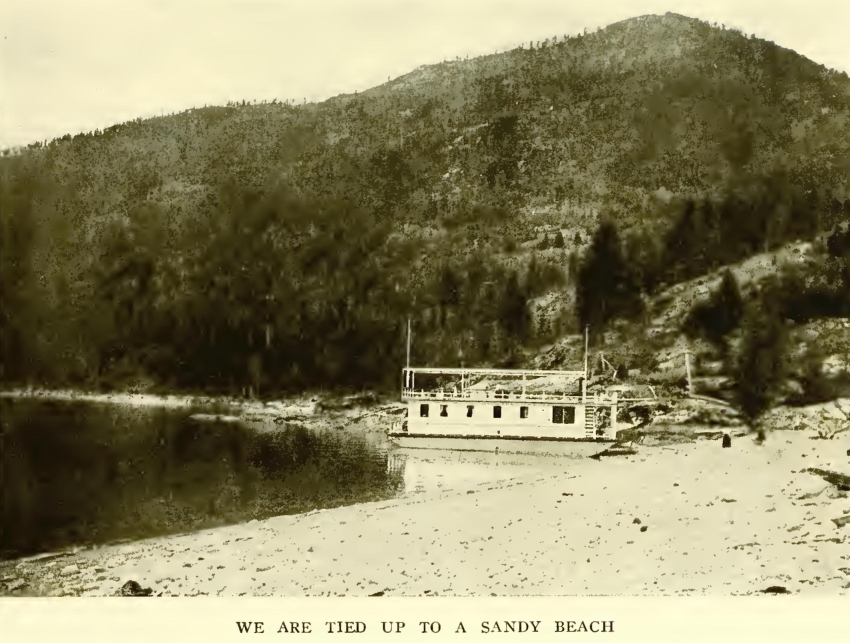
What about the fishing? In view of the dictum recently rendered by certain inordinately good people and recorded in one of our great religious weeklies, that question is clearly out of order. It has been decided by those who have no question as to their infallibility that it is wicked to catch fish. (Poor Peter! How thoroughly ashamed of himself he would be were he living in this day of ethical enlightenment.) Let it be understood before proceeding further, that our action has historic precedent in the well-known case of the boy and the woodchuck. We had to fish. We were forty miles from the base of supplies. The Doctor and the Junior and the girls and the head of the house and the Chinaman and the Preacher must eat or perish. As each and all manifested a strong prejudice against perishing, some one must fish. The Preacher offers himself as a hesitating violator of that high-toned, transcendental morality which places fishing among the mortal sins, and the Doctor aids and abets him.
Just here listen to a word of advice: If you will fish, provide yourself with a friend so unselfish that he will joyously perjure himself by declaring that he does not care anything about the sport and prefers to row the boat. It is important to have good tackle, carefully selected flies, a rod that will stand strain and a line that runs freely; but the sine qua non is a companion whose generosity is so much greater than your own that he will insist upon turning himself into a motor for your benefit. Such a man is the Doctor. May all blessings rest upon him! Those golden hours on the Kootenay were enriched by his companionship, and his unselfishness materially increased the Preacher’s score.
Now we are off. The trunks have been unpacked, the “girls” are tidying up the boat, the Junior is busy floating his ships from the shore, and the row-boat, with the Doctor at the oars and the Preacher waving his rod, is rounding the point of rocks to the south. Repeated casts of the flies find nothing doing. At last there is a swirl and a tug. But what sort of a trout is it at the end of the line? He pulls and plunges, but there is never a jump nor any indication of a purpose to break water. It is not much of a fight, anyhow, and the net lifts in a fish the like of which neither Doctor nor Preacher has ever seen before. Large head, enormous mouth, brownish back and sides with yellowish belly, he looks something like a salt water ling. And that was the sum total of the morning’s catch. Not much slaughter of the innocents about that! We ventured to cook that unclassified victim, and he was not bad as food for the starving. Later on the Doctor learned from the hermit—of course we had a hermit—that the stranger is called a “squaw-fish,” although it is said that the proper name is “squawk-fish,” so called from the noise it makes when caught.
Is this all that the far-famed Kootenay can furnish? Must it be told to future generations that two able-bodied men spent a half-day of strenuous toil and only captured a plebeian squaw-fish? Well, tell it if you must, but when you get started keep right on and tell the whole story. That afternoon we deserted the calm water along the shore and struck out for the tumbling billows made by Midge Creek as it rushes into the lake. Then and there the sport began. The trout were at home and receiving callers. The gaudy “Parmachene Belle” had no sooner struck the water than snap—whizz—jump—splash—landing net—two-pounder, and then it all began over again. We had struck our gait.
What fishing! Did you ever catch a rainbow trout? If not, you have yet to live. He is a combination of gymnast and dynamo. When communications have been established, he at once begins a series of acrobatic performances which leave no doubt as to his agility. The writer counted twelve jumps made by one fish before he was brought to net. These were not little disturbances of the surface of the water, just enough to give notice of his whereabouts—but clean leaps. How high? How would three feet do? If that’s too much, take off an inch. Especially fascinating was the sport after sundown, when the dusk was upon the face of the waters. Then, with a “white miller” as lure, we circled the broken water, knowing not where the fly lighted, but certain that it would be seen and craved by some hungry trout.
But it was in the early morning that the most wonderful phenomena were seen. The writer pledges his word that if he had not been there he would not believe it (the reader is not expected to credit the statement), but the Preacher, on divers and sundry occasions, left his berth before sunrise and went out to fish. The grey is in the eastern sky, and the lake motionless. Nothing breaks the silence but the roar of the creek or the sharp challenge of a chipmunk. Rowing slowly along the shore, the world seems as fresh as if newly born. A tip-up teeters along the beach, a thrush sings his morning hymn of praise among the trees on the mountain side, and now the sun peeps over a notch in the eastern hills. Did you ever see more exquisite colouring than the brown of the moss upon that rock, or the delicate shades of green in that clump of trees? The fish are not early risers, or, if they are up, have not found their appetites: but what matters it? Here are peace and beauty; God’s good world at its best.
Just one little story about the big trout. It was close by a face of rock that rose sheer from the water for fifty feet or more, that we struck him. Up and again up, in mighty leaps clear from the water he flung himself. With great surges he carried out the line, and then allowed himself to be coaxed gently toward the boat. When the Preacher fancied that the fight was well over and the great fish could be seen plainly but a few feet from the boat, there was another rush, and this straight down. There were one hundred and fifty feet of line on the reel, and the old warrior took out every inch of it. Where did he go? To China for aught the writer knows—but he came back. Slowly and reluctantly he yielded to the steady strain, and at last lay in the bottom of the boat, a dream of beauty. Three pounds and a quarter! The biggest rainbow trout caught in the Kootenay this summer; so the Nelson fishermen aver! Hooray!!!
By this time, the members of the gentler sex are saying, “It must have been deadly dull for the ‘girls.’” Far from it. Ask the Preacheress, and she will tell you that every moment of every day was full of happiness. That you may have a glimpse at some of the experiences which helped to make the hours pass pleasantly, listen to the tale of the chipmunks. The whole family looked at us askance when we first tied up near their home. Just a hurried scamper along the logs, and then away they fled with a warning chatter. Two days had not passed before they were eating crumbs thrown out for them. On the third day their suspicions were so far allayed that they ate from the hand of one of the party. After that, not a day passed, and hardly an hour of daylight, but some one could be seen holding out a crust at which a chipmunk was gnawing away. They lost all fear and would crawl over the knees and sometimes up on the shoulders in search of rations. They would allow us to stroke their heads and feel of the cheek-pouches in which they stored away food, without raising the slightest objections. When we left they had come to seem like old friends. They deserved better treatment at our hands than was accorded them, and the writer’s heart is filled with self-reproach as he recalls the dastardly act with which we closed our relations with these little friends. We gave them Jimmie’s pie! (Jimmie was the Chinese cook.) Near the close of our stay he manufactured the most wonderful and in every way impossible pie ever achieved by human ingenuity. One after another, every member of the party attacked that combination, only to suffer defeat. It was still intact when the time came to leave. It would have had abiding interest as a specimen, but there was danger that it might be broken in transit, so we left it for those confiding chipmunks. One thing is sure, if living, they must be woefully discouraged.
Jimmie was a character. What he did not know about the English language was equalled only by his abysmal ignorance of cooking. Asked to bring some breakfast-food for the Junior, he disappeared kitchenward, and when, after a long absence, one of the party went in search of him, he was discovered proudly bearing toward the table—a canteloupe. But Jimmie did his best, and that was quite enough to satisfy the happy members of our little family. He could boil potatoes well, and the water that he brought from Midge Creek was always first-class. Then, too, we had cooks of our own.
“Time to stop,” do I hear the weary reader say? Very likely, but the half has not been told. You should hear about the “hermit,” with his long, white hair and beard, his piercing eyes, his little shack and garden and the romantic love-affair which is said to have driven him into voluntary exile. You have not heard of the hard tramp up the canyon, past almost innumerable cascades and rapids, back and upwards until a pool is reached where a great throng of mountain trout is assembled. That marvellous rainbow which followed the Sunday afternoon storm must be ignored. The Junior’s sand-wells, his fall from the gang-plank resulting in a broken collar-bone, the fracas with a colony of yellow-jackets, the night of storm when we feared lest the cables break and we go drifting at the mercy of wind and waves—but what’s the use? You will never know what you have missed through your insistence that you’ve had enough. The writer had intended to tell of the total depravity of those trout, manifested on the Sundays of our stay with them, as they gathered en masse at the stern of the house-boat and dared the Preacher to cast a fly. Perhaps it is just as well to stop right here, for words cannot be found with which to describe the ministerial struggle.
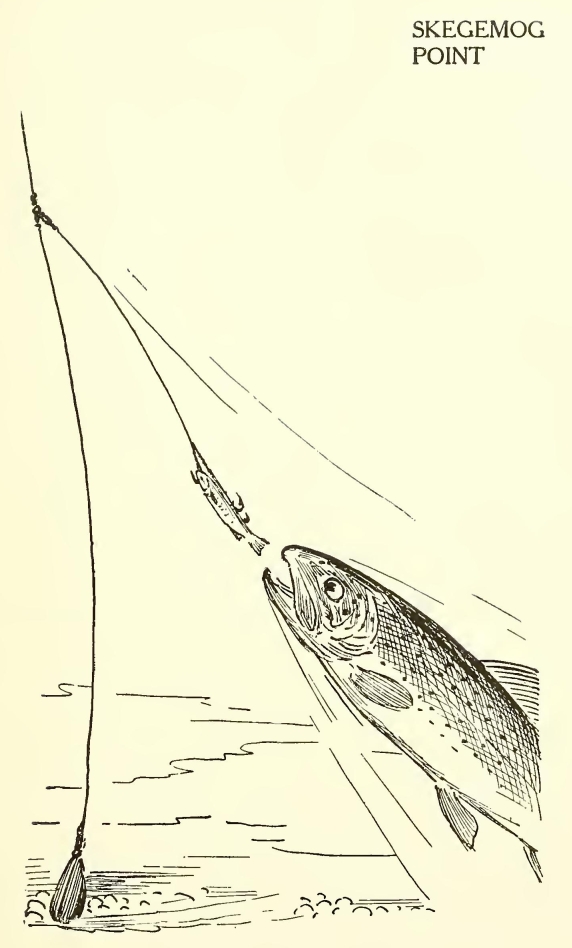
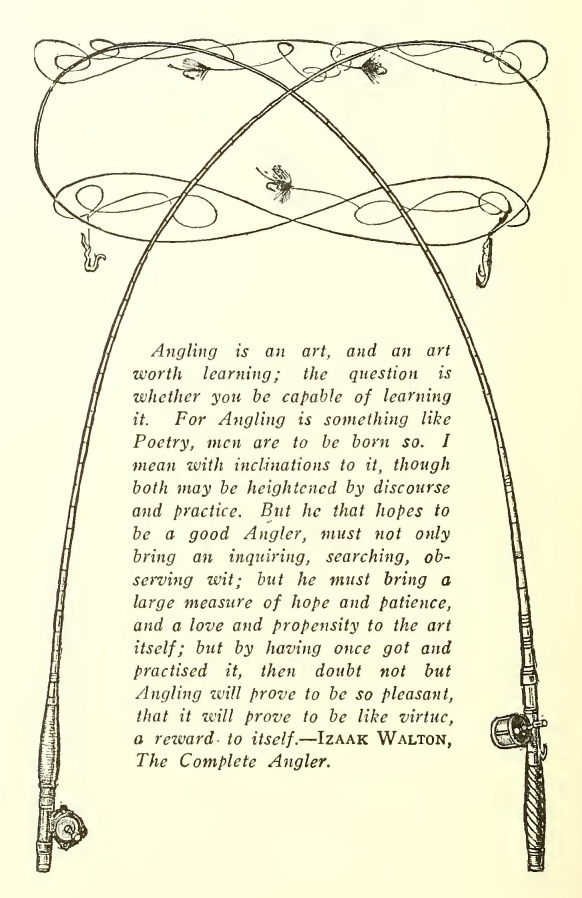
Angling is an art, and an art worth learning; the question is whether you be capable of learning it. For Angling is something like Poetry, men are to be born so. I mean with inclinations to it, though both may be heightened by discourse and practice. But he that hopes to be a good Angler, must not only bring an inquiring, searching, observing wit; but he must bring a large measure of hope and patience, and a love and propensity to the art itself; but by having once got and practised it, then doubt not but Angling will prove to be so pleasant, that it will prove to be like virtue, a reward to itself.—Izaak Walton, The Complete Angler.
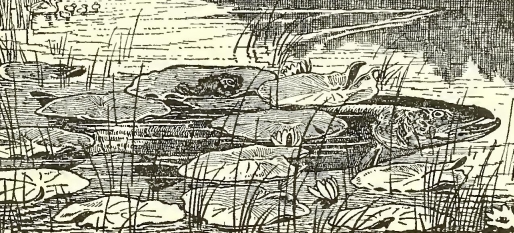
HAT’S that?”
The elect lady should have been asleep instead of sitting up in bed, an animated interrogation point, for the hour was late and the ride from Chicago that day had been hot and dusty and fatiguing.
“What’s what?” grunted the sleepy partner of her joys.
“That noise. Don’t you hear it? It sounds like a band playing in the distance.”
When this suggestion finally penetrated the semiconscious mind of the husband, the absurdity of the idea called forth certain emphatic if not convincing negative arguments, all of which were met with the puzzling query, “If it’s not a band, what is it?”
“That’s what I’ll soon find out,” answered the skeptic, as he arose to begin a serious investigation.
The noise was unmistakable; faint but clear, and from without. Approaching the window the noise became more distinct, but the character of it remained a mystery. Bands are not indigenous in rural districts, and no large town was near. With nose pressed against the window-screen in a vain effort to see everything within a radius of five miles, the explorer suddenly realized that the music was right at hand, and the musicians, in countless numbers, were separated from his face only by the wire netting. Mosquitoes? Exactly, and their name was legion. If night had suddenly turned to day one could not have seen anything through that window for the cloud of mosquitoes. New Jersey may justly boast of the size and ferocity of her mosquitoes, but for numbers Skegemog fears no rival.
It is more than probable that some reader will say to himself, “I wouldn’t stay in such a place.” Well, we stayed, not because of the pests, but in spite of them, and because they formed the only drawback to one’s enjoyment. The Lodge was on a point of land with water on three sides, the table was exceptionally satisfactory, the guests were congenial and the black bass never failed to respond promptly to our advances. What are a few mosquitoes, more or less, when such paradisaical conditions obtain?
To many people a bass is a bass, and that’s all there is to it. To be sure, they recognize the fact that some bass are larger than others, but the process of differentiation begins and ends with the table of weights and measures. Skegemog bass belong to the small-mouth family, and there is as much difference between these and the big-mouth variety as between a split-bamboo rod and a saw-log. The small-mouth is the aristocrat of the bass family. He is more dainty in his tastes, more plucky, and has more brains than his brother of the more generous facial opening.
And the small-mouth bass are not all alike. The marked differences seen in children of the same family are duplicated in the individuality shown by fish belonging to the same species. The bass whose home is in swift waters is a stronger, more tireless fighter than his brother of the lake. Of two bass living side by side in the same water, one may be logy and lazy and indisposed to strenuous exertion when hooked, while the other is brought to net only after he has tried every dodge known to fishdom and exhausted every atom of his strength.
It was while fishing on the reef just west of the Point that the invalid bass was taken. Each fisherman has his favourite method of capturing bass. One uses live frogs and casts close to the edge of the rushes or weeds along shore. Another trolls with many yards of line out, and a piece of pork-rind or a minnow fastened to the spoon.
Still a third anchors his boat and still-fishes with live minnows. A fourth method, and one which we prefer to any of the others, is to row slowly over promising ground, letting the minnow sink well down and keeping it constantly moving. It was while fishing in this manner and after taking six or eight fine fish, that a feeble tug at the line signalled the presence of the invalid. He came in with scarce a struggle; in fact he seemed to be relieved to have his troubles ended. As no expert was present to diagnose the case we shall never know from what malady he suffered, but he was a sick fish. If he had been a man the pallor and emaciation might have indicated tuberculosis, although he did not cough. He had a giant frame, and in health would have weighed five pounds or more. As it was, he barely went two pounds. As he was still able to wiggle a little after the weighing process was over, he was returned to the water, where, after lying seemingly lifeless for a moment, he feebly swam away. Just before he disappeared he turned a reproachful look towards the fisherman, as much as to say, “Why didn’t you put an end to my suffering? I’m disappointed in you.” If we ever catch another invalid fish we’ll kill him on the spot.
On a certain day, among the new arrivals was a Cleric and his Satellite. The Cleric was a genial and interesting man and an enthusiastic fisherman. That night he asked many questions about the fishing, and calmly announced that the next day he would show us how to catch bass. Then the Satellite took the floor and descanted at length upon the prowess of his friend and the piscatorial victories won by him on other waters and in other days. Not a word was said in reply by the men of the company, some of whom had fancied that they knew a little about bass fishing; but on more than one face there was a grim look which betokened something a little short of perfect happiness.
The next morning the Cleric and his Satellite were up bright and early, being the first to start out upon the day’s fishing. Later on, three other boats put out, each containing a man who had vowed to beat that Cleric or perish in the attempt. When night came and the records of the day’s catches were compared, it was found that the high-hook had brought in eighteen bass, another twelve, a third eight, while the invincible Cleric had taken but two. Never again, as the guests gathered on the porch at nightfall, did the Cleric expatiate upon his skill as a fisher for bass, and no more did the Satellite recount the marvellous exploits of his hero. On the faces of the other fishermen there rested a look of deep satisfaction and in their eyes one might detect a gleam of amusement. It isn’t necessary to brag about your achievements. Just do things, and let that brag for you.
But the Cleric was a good fellow and his stories helped to pass many an evening pleasantly. One, that may serve as a sample, has stuck in our memory:
“Where a railroad crosses a Michigan river is a deep pool under the bridge. As a fisherman was casting in this pool one day, he had a mighty strike followed by the fierce whizzing of his reel as the fish ran out the line. Before the man realized what was happening the line parted and the fish was free. In the afternoon he returned with a new and stronger line, only to repeat the experience of the morning. Then salmon tackle was called into use, which was promptly smashed by the, as yet, unseen denizen of the pool. By this time the fisherman had parted company with all his cherished principles of sportsmanship, and vowed that he would capture that fish even if he had to shoot it. Abjuring the rod, he next employed a muskallonge line and a cod-hook, baiting with a five-inch minnow. The fish responded promptly, and the big line just as promptly parted when this Sandow of the finny tribe had gotten fully into action. As a result of deep reflection the fisherman then bought a clothes-line and employed a neighbouring blacksmith to make him a hook big enough and strong enough to hold a shark. Baiting the hook with a pound of raw beef and giving the line a half-hitch around a near-by stump, he once more challenged his unseen foe. For three hours a mighty battle raged. The blacksmith, two section hands and a farmer joined forces with the fisherman, and the five of them finally succeeded in landing the fish. After quieting him with a club, they began to wonder at the fight which he had put up. While he was large—some twenty-five inches in length—his size did not fully explain matters. Then one of them undertook to turn the fish over with his foot, and could not stir him. He used both hands and failed. Then the five together tackled the job and barely succeeded. Evidently, here was an extraordinarily heavy fish, and the phenomenon was explained only when they cut the fish open and found him full of railroad frogs.” That story brings to mind the champion storyteller of northern Michigan who acted as occasional oarsman for the Skegemog guests. He was generally known as the “Cheerful Liar,” and his kinship to Baron Munchausen was put beyond the shadow of a doubt by the variety and character of his stories. After a somewhat careful study of the man, at least one of his occasional companions became convinced that he did not prevaricate consciously. His was simply a case of an over-grown and exuberant imagination. Given a tiny bit of fact as a starter, that imagination began to caper about without let or hindrance until the most incredible story resulted. He was a great comrade, always good-natured, always personally interested in the fishing, a lover of the woods and the water, ready at all times with an interesting story and never telling the same one twice. What more can one reasonably ask in an oarsman?
In earlier days he had lived in another part of the state, and most of his alleged adventures were localized on or near Clearwater Lake. As accurately as we could compute, the fish which he claimed to have caught in this one lake would have been sufficient to cover the southern peninsula of Michigan to a depth of seventeen feet, six inches, and then leave some four hundred fish unused. One of the most fascinating of his many delightful yarns concerned his adventure with a giant pickerel:
“Cousin Jim Smith and I,” the narrator began, “were fishin’ one lowery day on Clearwater Lake in a cranky little boat, when Jim hooked on to a pick’rel. The fish put up a tough fight and Jim got excited and kept standin’ up in the boat and I a-yellin’ to him to se’down. Bimeby Jim got ‘im into the boat, and then jumped up again, and over we went. When I saw we were goin’ I grabbed for the line and got holt just above the spoon. That pick’rel pulled and I hung on and he took me clear to the bottom in eighteen foot of water. When we got down there, I grabbed that fish with both hands, tucked him under my left arm, gave a big spring and shot up to the top of the water. What does that pick’rel do as soon as we reached the top, but slip out from under my arm and make for the bottom again, me hangin’ on to the line close to the spoon. When we reached the bottom I tucked him under my arm again, gave another spring, came to the top; the fish squirmed out again, and—well, I don’t know how many times we made the trip up and back, but just when I was about tuckered, some fellows in another boat came up and pulled us both in. That pick’rel weighed twenty-two pounds.”
The thoughtful critic will easily separate the element of historic fact from the mythical accretions in this story, and be able to retain Jim and a fishing trip and a big “pick’rel,” even if compelled to reject the account of the numerous subaqueous excursions.
In many of the larger inland lakes of Michigan lake-trout may be found, and summer visitors vary the sport of bass fishing with excursions after trout. Early in the season these fish are found in shallow water, along the shore, and may be taken by ordinary trolling; but as the weather grows warm the trout retreat to the deepest part of the lake, where they can be captured only by some unusual means. The method employed does not appeal strongly to a true sportsman, but he can afford to try it, once, at least, for the sake of the novelty. At the foot of Elk Lake lived an old man who was a past-master in the art of taking these deep-lying trout, and to him the visitor turned when he grew satiated with bass fishing and sighed for new worlds to conquer. The old fisherman has a big, heavy boat, in the back end of which he has fixed a windlass holding a thousand feet of fine, copper wire. The trout are lying in about three hundred feet of water, and no ordinary line will allow the trolling spoon to sink deep enough to reach those dim recesses. With all the copper wire paid out, the old man rows slowly over the deepest parts of the lake, while the tourist sits holding the handle of the windlass, ready to begin turning at the least suspicion of a strike. Now and then there is a false alarm, and the excited fisherman cranks in a thousand feet of wire only to find a piece of wood or weed fastened to the spoon-hook. When, by chance, a trout is hooked, the sensation differs little from that experienced in winding up a bucket of water from a deep well. The fish has not travelled far in his involuntary journey through the water before he loses all ambition, fills with water and becomes no more obstreperous than any other inanimate object would be when fastened to sixty rods of line. These trout are delicious eating, and run as high as twenty-five pounds, or even more in weight.
Other trout, the real, speckled brook-trout, are found in the streams flowing into the lake, and more than one delightful day was spent in pursuit of them. After all, there is no other fishing quite like that. It is not altogether because brook-trout are the cleanliest, handsomest of fish, or that they are so gamey and so toothsome that this sport is easily the prime favourite with fishermen. The brook itself is a joy. Just to company with it makes life worth while. It chatters to you, laughs at you, plays hide-and-go-seek with you, and never gets to be an old story. Sitting on an old root, just where a log fallen across the stream makes a good hiding-place for the shy fish, it doesn’t matter very much whether you catch anything or not. The checkers of sunlight are dancing all about you, a red squirrel is scolding at you from a neighbouring tree, a mink may go stealing by if you are quiet, and over all is a great peace which steals into the heart, filling it with profound contentment.
One day we followed far up the brook, so far that when the night fell and we saw a farmer’s home across the fields, it was deemed wise to seek lodging there for the night rather than to attempt the long trip back to the Point through the darkness. The farmer and his wife were hospitable and kindly, furnished us with an appetizing supper and, later on, showed us to a tiny bed-room under the eaves. It was not the fault of the house-wife, for the buildings were old, but a brief stay in that bed proved beyond peradventure that it had been preëmpted. We did not “fight and run away”; we ran without even beginning to fight. Stealing quietly down stairs we made for the neighbouring barn and the haymow, where we slept untroubled by anything more vicious than an occasional “daddy-long-legs.” Then, in the early-morning, back to the brook again and to trout that fairly tumbled over one another in their eagerness to grab the “Silver Doctor” as the light rod sent it flitting to and fro over the face of the stream.
When one of the guests proposed, one evening, that we all go on an excursion up the lakes the next day, there was hearty and unanimous assent. The lakes that wash the shores of Skegemog Point are only two of a series, all connected by thoroughfares. A steamer of light draught can go the whole length of the chain, some twenty-five miles or more. The next morning proved ideal for such a trip. The sky was a deep blue with just enough fleecy clouds in it to furnish the needed contrast. The wind set little wavelets to dancing on every inch of the lake, but never grew troublesome and unpleasant. The farmers were at work in their grain fields on either shore, the luncheon was excellent, and nothing occurred to mar the pleasure of the day. Why write of an experience so common and so uneventful? Just because of what the day brought to one member of the little company.
Among the excursionists was a man in middle life whose mother had gone home to God the previous Christmas-time. He had seen the light go out of her eyes, had held her hand in his as she breathed her last, had stood by the new-made grave in the village cemetery as they lowered the casket into the earth. The snow lay deep upon the ground and was steadily falling as the friends turned away from the burial and, Christian man though he was, that son could not feel that his mother was. Have you ever felt that one who has been a part of your life, is not only dead, but has utterly and entirely ceased to be? He told himself that she whom he had loved so passionately was safe in our Father’s house, and he believed it—but he could not feel it. The days and weeks and months had come and gone, and still there had come to his heart—whatever his head might affirm—no comforting sense that his mother still lived, safe-sheltered in a better country. He was sitting by himself that day, far up in the bow of the boat, drinking in the beauty of earth and sky and lake. It all brought back other and golden days when he and his mother had been together on the majestic St. Lawrence, and then, all at once—She was at hand. He felt her presence like a benediction. He heard no voice, saw no vision; but somehow his soul sensed her nearness, and his sore heart knew a comfort that has never departed and never lessened in the years that have come and gone since that hour.
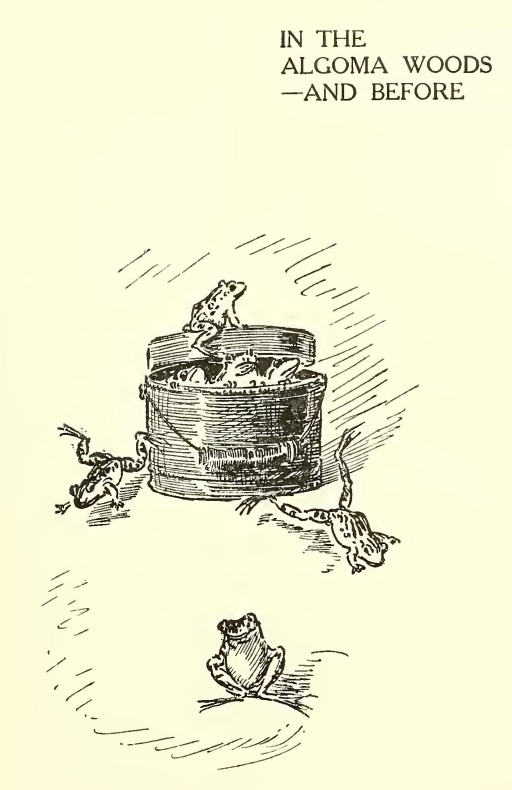
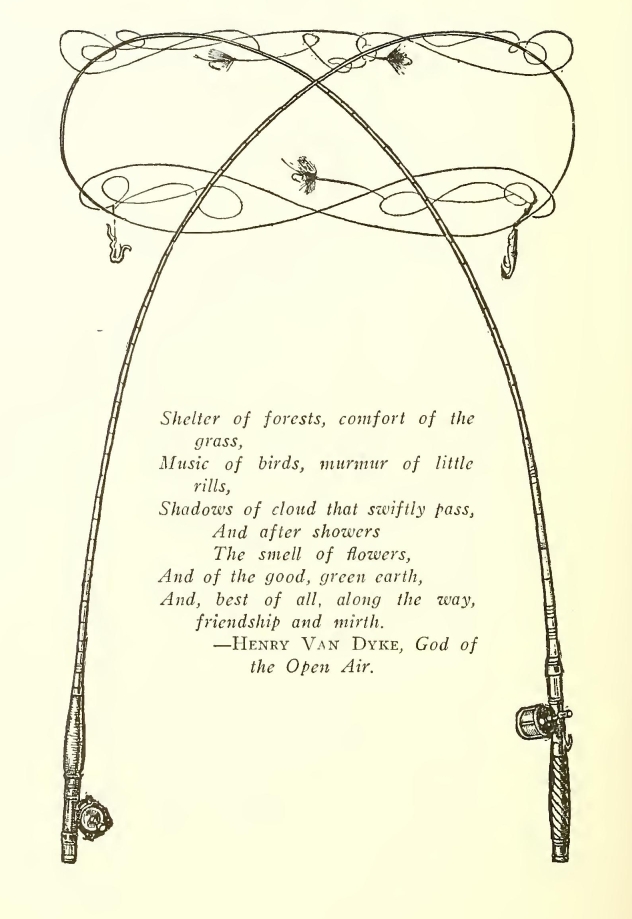
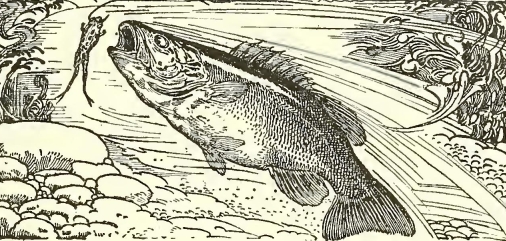
AVE you ever taken the Georgian Bay trip?” asked the General Passenger Agent when we sought his advice as to our annual outing. “The scenery is beautiful and the fishing all that heart could wish.” So it came to pass that we boarded the steamer at Sault Ste. Marie for the round trip of Georgian Bay, our tickets including generous stop-over privileges. Undoubtedly “palatial” is the proper term to use in describing a passenger steamer, but having never lived in a palace we are unable to judge of the fitness of the appellation as applied to this particular boat. We can affirm, however, that we were very comfortable, and that the scenery quite equalled our high expectations. So many people have made this trip and it has been described so frequently and so well, that the eulogistic possibilities of the English language were long ago exhausted in praise of the beauty of this unsalted sea.
It will be enough to say that we made the regulation trip and were quite orthodox in the matter of admiration. The moments of enthusiasm over the scenery were interspersed with periods of deep reflection; for somewhere along the course of the steamer we had decided to stop off for a stay of some weeks. Where should it be? We had started with a notion that the choice would lie between Pantanguishene and Parry Sound; but the former place failed to make a strong appeal, and at Parry Sound there were too many people and too few fish.
On our way down we had touched at Manitowaning.
When and where had we heard of this place? Carefully overhauling the odds and ends stowed away in the chambers of memory, we came at last upon a glowing account, given us some years before by a fisherman friend, of a vacation spent at Manitowaning. Much of what he said had been forgotten, but not his praise of the fishing. When the captain of the steamer assured us that there was a comfortable hotel in the little village, the matter was settled, and Manitowaning it was. It may be just as well to exhibit the “fly in the ointment” at once, and have done with it. The hotel had a bar, and the drinking and the drunkenness went far towards marring our enjoyment of this otherwise most delightful spot.
Manitou Lake, three miles from the village, swarms with little-mouth bass. One can hire a rig for a dollar and a half for the day, and many were the hours spent in close and delightful intercourse with the inhabitants of this beautiful body of water. Bass are freaky fish, and one never knows just when they will take a notion to scorn all efforts at their capture. One day Sue and the writer drove over to the lake, and those bass took everything that was offered. In a little sandy bay, where the water was not over four feet deep, we anchored and began fishing with minnows. So eager were the fish that both of us were kept busy hauling in the victims and putting on fresh bait. The Senior decided to try a gaudy, artificial fly, and the bass grabbed it with utter disregard of the fact that it resembled nothing which they had ever seen before. The fishing went forward so fast and furiously that it was finally agreed to throw back every bass that was not clearly of three pounds in weight, or more. Urged on by the sport of that day, the whole family started bright and early the next morning to duplicate the delightful experience. Alas! some mysterious change had come over the “spirit of their dream” in fishdom. Not a bass could be found in the little sandy bay where they had thronged only a short twenty-four hours before and, after a day of arduous toil, the net results were five bass, not one over two pounds.
If the fisherman were to find an earthly paradise it would be where he could catch trout from one side of his boat and little-mouth bass from the other. Next in attractiveness to this unrealized ideal must be placed the spot where these two species of game fish may both be found within a radius of a few miles. In this respect Manitowaning fills the bill. Although the village is on an island—Grand Manitoulin—trout streams abound, and among these the one flowing out of Manitou Lake was highly recommended by local sportsmen. The favourite point was some fifteen miles distant, and we were advised to drive over in the afternoon, stay all night at a farmer’s nearby, getting the evening and morning fishing. That sounded attractive, and was promptly tried out. There may be lazier horses than the one we drove that day, but if so they should be promptly executed for the crime of putting an unendurable strain on the driver’s good nature. But we finally arrived at our destination, and could hardly wait to stable Bucephalus, so eager were we to begin operations with the trout. It was a sizable stream, with much quick water in sight as we crossed the bridge and, in anticipation, we saw the big string of noble fish that we would carry proudly back to Manitowaning on the morrow. Must it be told? When it was nine o’clock that night and too dark to distinguish a favourable pool from a mud-puddle, we turned towards the farm-house not only without a trout, but not having had one rise in response to the incalculable number of times that the alluring flies had been cast. The next morning, at sunrise, we were on the stream again, and four hours of faithful fishing brought in return two small trout which had evidently escaped from some asylum for feeble-minded fish.
On our way out we had noticed an attractive looking stream which we crossed some ten miles from Manitowaning. Just by the bridge over this stream stood the remains of an old mill, half fallen down and with the timbers of the dam furnishing ideal hiding places for trout. When this spot was reached on the return trip the pull was too strong to be resisted and, hitching the apology for a horse to a nearby fence, preparations were made for a foray upon the unsuspecting fish. Fly-casting was out of the question and, after choosing a new snood of double gut and covering the hook with an exceedingly plethoric angleworm, the bait was cautiously dropped into the rushing waters at the upper side of the ruins of the flume. Slowly the line was paid out and the lure allowed to go far down out of sight. Zip! Yank! Tug!—and it’s all over. Under the conditions, any such thing as playing the fish was out of the question, and the straight-away pull parted that new snood as if it had been made of a single strand of cotton thread. Our humiliation was complete, and with a thoroughly chastened spirit the horse was untied and the homeward journey resumed. That night as we told the champion fisherman of the village of the experience at the old mill, he poured a little balm upon our sore spirit by exclaiming, “That’s no trout, that’s a whale. There isn’t a fisherman within twenty-five miles of the old mill who has not hooked that fish and lost him.” Strange, isn’t it, how other men’s ill fortune takes some measure of the sting from our own?
But this is no tale of woe. On another day, and on the same stream that flows by the old mill, the elect-lady and her unworthy consort spent hours that are a joy to recall. It was only eleven miles to the point recommended by our friendly adviser, and the horse was reasonably ambitious. We had laid in a supply of provisions and took along a skillet. A perfect day and perfect comradeship, plenty to eat and the novelty of unexplored territory, made it certain that, fish or no fish, the hours would pass pleasantly. As so frequently happens when we are not very particular whether the fish bite or not, they elected to be friendly. The stream where we visited it ran through meadow and pasture-land, with a luxuriant growth of alders along its banks. The open spaces afforded opportunities for my lady to try her hand at trout fishing, and the other member of the party could wade the stream and test the more inaccessible places. The water was almost ice-cold, the stream having its rise less than a mile away in a great, bubbling spring. Owing to the colour of the water the stream is called the “Bluejay.”
When noon came, a fire was kindled in a secluded spot close by the running brook. Coffee! You never tasted any like it. Fried trout! Why are they never so appetizing as when cooked and eaten in the open? We lingered long over that dinner, and the writer would fain linger a little over that day even now when it is only a memory. He has known many happy days; days which are golden as he looks back upon them across the years; but among them all no day spent in the out-of-doors, in touch with fields and stream and sky, stands out more clearly and alluringly against the background of yesterday than that passed with the dearest woman in the world upon the banks of the Bluejay. The sun was low in the west as we started homeward, and from the summit of a low hill over which the road led, we looked north and eastward over miles of woodland and cultivated fields, and saw in the distance the glistening waters of the bay. Yes, there is the lighthouse at Manito-waning, and the children are watching for us. In spite of the alluring beauty of the scene, something more attractive awaits us yonder. We must hasten.
Before leaving home it had been decided that all but one member of the family should spend a portion of the vacation time in visiting old friends.
Accordingly, when Sault Ste. Marie was reached, the devotee of rod and reel turned his face towards the north, while the wife and children took steamer for Chicago. The trip into the woods was not undertaken alone, for a fisherman friend who shall be known as Jim, one of the best of comrades, was waiting at the Canadian “Soo” to bear us company on the visit to the Algoma woods. What name, if any, the railroad bears which runs from the “Soo” sixty miles northeast, we do not know. The company does not depend upon passenger traffic for revenue, for that would mean bankruptcy. The road is used for hauling out logs, with the suggestion now and then made that some day it will be extended to Hudson’s Bay. The day before we were to go up the line, a trestle had been partially burned, and the train crept fearfully over the half-repaired structure. We were probably some five or six hours running the sixty miles which brought us to Trout Lake and the shack where we were to stop.
Through the kind offices of the Superintendent of the Algoma Railroad we had been able to secure accommodations with a forest ranger, who had a comfortable cabin and was an excellent cook. It was the only building for many miles around, and Edwards, the ranger, must know some lonely hours, especially during the long winters. Lest others may share the delusion of a friend who said that he wondered we did not starve at such a long distance from market, listen to the bill of fare: plenty of good bread and butter, eggs, bacon, toast, trout, with blueberries and raspberries ad libitum. Less than eighty rods away was a lumber camp where we could get milk and cream, and in return for trout the cook kept us supplied with delicious blueberry pies. The man who is on friendly terms with the cook for a logging camp need never suffer from hunger.
The first night after our arrival we were awakened by a knocking at the door. Upon being admitted the visitor told of a sick child which had been brought up from the city in hopes that the change might prove beneficial. The mother and child were living in a tent and they feared the little one was dying. Had we any medicine? We had, and he departed with it. The next morning the baby was reported as being better, and the following Sunday when we were invited to dinner at the logging camp, the mother and child were at table with us. When we saw that mother feeding baked beans, boiled ham, pickles and pie, to a child that had recently been at the point of death with cholera infantum, we had an unexpressed conviction that it would take something more than cholera-mixture to save the child this time. However, so far as we could learn, the little one survived in spite of its mother’s folly. Possibly ham and pie are specifics in this disease.
The country here is broken, rocky hills of considerable size almost surrounding the lake. Neighbouring lakes are to be found in nearly every direction, one of them less than half a mile away. From these lakes trout of large size may be taken, but not with the fly; at least at the time of year when we visited them. They seemed lazy and somewhat indifferent even to the minnows offered them. Now and then one would deign to respond to our invitations, but it was never with any enthusiasm. It will always remain an open question whether the huge trout that coquetted with Jim’s hook, one day, was a reality or a phantom. We were on a lake some three miles from camp and had taken a few fish. Fishing in some fifteen feet of water, Jim had a strike and brought a big fish so near to the surface that he was plainly seen by the three of us, and then the exasperating rascal quietly sank down out of sight. The bait was immediately lowered and a prompt response secured in the shape of another strike. Again the trout came within clear view, and again, without any apparent haste, disappeared. How many times this was repeated deponent saith not; but the repetition of this ungracious performance went on until even Jim’s patience was exhausted and we went on our way.
It was on this lake, near the outlet, that we came upon a beaver-house, recently built. We did not get a sight of the shy animals, but saw many evidences of their work in the stumps and freshly cut pieces of wood. A well-beaten path led from their timber reserve to the edge of the water, and they evidently floated the timber to their building some twenty rods away. The discovery of this colony called out numerous stories from the forest ranger of his experiences with the beaver, in the recounting of which he referred to the “outlaw” beaver which lives alone and in a hole in the bank of some stream or lake. The Indian theory is that this exile has been driven out by the members of his family on account of his bad disposition or for some crime committed against the society of which he is a member. We must confess to a measure of skepticism as to the absolute trustworthiness of this bit of natural history, and only the testimony of a well-known naturalist established it in our minds as an indubitable fact.
The best August fishing in this section is to be found either in the streams or just where they empty into the lakes. Here the sprightly, always-up-and-doing brook trout furnish real sport. In the Chippeway River, outlet of Trout Lake, we made good catches, and where a spring brook empties into the lake, sport that met our highest desires was found. One spot on the river made an indelible impression. It was where the stream, rushing against a wall of rock, was sharply deflected, forming a deep and shaded pool. The timber grew so densely all about that it was seemingly impossible to fish this pool from the shore, and its depth made wading out of the question. By dint of much climbing and fighting with underbrush, the top of the rock was reached, from which point of vantage one could look down upon the pool and the big trout lying near the bottom. While the rod could not be used on account of the brush, it was possible to drop a line into the water from the over-hanging rock, and however unsportsmanlike this may have been, it was done with most satisfactory results. Eight large trout were pulled up, hand over hand, from this secluded retreat.
The mouth of the cold brook yielded the largest returns of any one spot found during our stay. Just as the sun was going down, to send a cast of two or three flies dancing over this water was to be rewarded by doubles frequently, while rarely did the flies go untouched. Then back to the cabin and, after one of Edwards’ good suppers and a chat about the roaring fire, to bed and to the sleep that “knits up the ravelled sleeve of care” and sends one forth to the new day buoyant and rejoicing.
Full many a glorious morning have
I seen
Flatter the mountain-tops with
sovereign eye,
Kissing with golden face the
meadows green,
Gilding pale streams with heav-
enly alchymy.
—William Shakespeare,
Sonnet XXII.
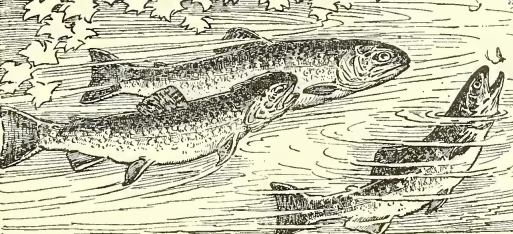
HEN our steamer, the “Tunisian,” docked at Liverpool after a quick and pleasant voyage, the two brothers of my good friend and travelling companion, Dr. W., were waiting to greet him. It was something like half a century since my friend had left his home among the Welsh hills to devote his fine mind and loving heart to the ministry of Jesus Christ in America. Were this the place, one might write many a chapter concerning the faithfulness and fruitfulness of that ministry which has brought such priceless blessings to so many lives and helped so largely in building the Kingdom of God in the new world. However, it is of his early home rather than of the man, that we are to write just now.
It was because the writer was his brother’s friend that one of these strong-faced Welshmen extended a cordial invitation to be his guest when, later on, Dr. W. should visit his native town. So it came to pass that after the great meetings in London were over, we started for the little village of Garndolbenmaen where Dr. W. was born and had spent his earlier years.
We had counted not a little on making the ascent of Snowdon, and in spite of the cloudy, threatening weather, ascend it we did. Boarding the toylike car on the little narrow-gauge road, we were slowly hauled up the mountain side. We had hardly begun the ascent when the country about began to unroll like a panorama below us. Yonder is a thread-like stream, and beyond it the mines with their piles of slack marking each opening. Higher up, the clouds were all about us, shutting out everything but the immediate vicinity, and before we reached the summit, rain had begun to fall. The only relief to our disappointment was when, for a moment, the clouds broke and we looked far over mountains and valleys. Down at our feet and leading away towards the east was a white road on either side of which were little squares of cultivated fields. Towards the south loomed the tops of high hills, the sides of which were hidden by the clouds, while towards the west we caught just a glimpse of the Straits of Menna.
A little later we were riding along the shores of the Straits and looking across to Anglesea. To those familiar with religious work in Great Britain, one figure stands out, giant-like, whenever the name of that island is heard. Here Christmas Evans prayed and preached, turning many hundreds from sin to righteousness under the sway of his matchless eloquence. Farther on we passed Carnarvon Castle where, according to a tradition now generally discredited, Edward II, first Prince of Wales, was born.
Night had fallen when we reached the Garn station, a mile or more from the village which straggles up the side of one of the foot-hills of the Snowdon range. A cheerful fire was blazing in the open fire-place when we entered the house, and it seemed a symbol of the warm and generous hospitality extended to the American stranger. There is something indescribably attractive about one of these Welsh homes. Perhaps “hominess” describes it best. The absence of ceremony and the presence of a spirit of kindliness and cordiality put the stranger at his ease from the first. The days spent under that roof passed all too swiftly, and, as we look back upon them, they set the heart to glowing. Since then the master of the house has passed into the great silence, but no change that time works can efface the memory of his gracious and considerate hospitality.
Sunday in North Wales is a day for rest and worship, not for golf and picnics. It was on a Saturday evening that we reached Garn, and it seemed like a “deserted village” when we looked up and down the street the next morning. Any such assumption was thoroughly dissipated later on when the hour for morning service came. Then people gathered from every direction for miles around, and when we entered the plain, Non-Conformist Church-house it was filled to the doors, galleries and all. The visitor could not understand songs or prayers or sermon, for all were in the Welsh tongue. When the sermon began my thoughtful friend, who sat beside me, jotted down the salient points of the discourse as the preacher proceeded, so that the handicapped American gained a very fair idea of the outline. It was not the sermon, however, but the singing that made the strongest impression. Needless to say, not a word could be understood, but somehow it reached the heart. The dominance of the minor would have been somewhat depressing had it not been for the occasional evident exultation and rejoicing which swept forth to fill the church.
It was at the evening service that the most profound impression was made upon the writer. The second service of the day closes before it becomes necessary to light the lamps. The sun was low in the west, when, after the sermon, a man came down from the gallery and stood up before the pulpit to sing. That song, in an unfamiliar tongue, melted the heart and filled the eyes with tears. The rays of the setting sun fell through the western windows upon the singer, and we thought of one in a far-off land and time whose face did shine when he returned to his people from talking with God. Later on our host told us that this man had been a popular concert singer whose heart God had touched during the great revival which had then just swept over Wales. The song to which we had listened told of the joy of the wanderer when he had come back from the “far country” to his Father’s house.
English is rarely heard on the streets of Garn, and not a few of the people of this section are unable to speak anything but the Welsh. On one of our days of wandering about the country we met a woman in the highway with whom Dr. W. talked in her native tongue. He then told his friend that we would stop at the home of this woman a little farther on, and excused himself for a moment while he visited a neighbouring farmhouse. Left together, the Welsh woman and the American were somewhat at a loss as to how conversation might be carried on. It was the woman, of course, who solved the difficulty. She knew one English word, and looking the visitor in the eye, she smiled and said, “America! America!” The stranger could not even say “Yes,” in Welsh, but he said it in his best Yankee and his answering smile was in the universal language. Dr. W. said afterwards that this woman’s sons were in the United States, and we found few homes from which at least one had not gone forth to the new world. It was for the sake of her boys, in part, at least, that this woman overwhelmed us with attentions when we sat in her home a little later on. Such milk we never expect to taste again. When Dr. W. said that she had served us with the “strippings,” he was compelled to explain that the Welsh dairymen keep separate the last of the milk taken from the cow—the “strippings”—as this is much richer than that given earlier in the milking. Henceforth, give us “strippings.”
As one comes to know something of the conditions obtaining in Wales, the only wonder is that they do not all emigrate. The land is generally owned by non-residents, and the rentals are high. If the tenant rescues a field from the rocks and brush, thereby increasing productivity, the rental is at once increased. Every one must pay towards the support of the Established Church. On the Sunday which we spent in Garn, the two Non-Conformist churches of the village were crowded, while only fifteen people were present at the services held by the Church of England; yet every man of these Calvinistic Methodists and Baptists was taxed for the support of the establishment. No more gross injustice in the name of religion was ever perpetrated than that from which the Non-Conformists of Wales suffer.
The valley of the Dwyfor is an idyll of peaceful beauty. One afternoon we climbed the steep hillside back of the village, and stood upon a giant rock jutting out from among its lesser fellows, where, when a mere lad, Dr. W. practised preaching to an audience made up of rocks and stones and grazing sheep. The spot was of interest not only because of the associations but for the extended view that it afforded. We faced the village and the valley, and saw the glistening waters of the sea in the distance. Here and there a patch of woods could be seen, but for the most part one beheld only carefully cultivated and fruitful fields. The Dwyfor is not a great river save in its quiet beauty.
Are you built so that every stream of water, even the output of the melting snow in the springtime, seems to say “Fish!”? Whether fortunately or unfortunately, the writer has never been able to keep his imagination from capering about when in the presence of lake or river. The shining Dwyfor had an irresistible appeal, and our host was subjected to cross-examination.
“Are there any fish in the Dwyfor?”
“Yes.”
“What kind?”
“Trout.”
“Would I be permitted to fish it?”
“Yes, by taking out a license.”
“Have you any tackle?”
“Certainly, and you are more than welcome to use it.”
The rod was heavier and stiffer than the American was accustomed to use, and the flies were absolute strangers; but, nothing daunted, the fisherman paid for his license and betook himself to the river. It is probable that Dr. W. would have little choice between going fishing and serving a term in jail; but the unselfish man trudged patiently along with his friend. If ever a stream was clearer or its banks more absolutely lacking in everything that would screen the fisherman, it is unknown to the writer. The sky was almost cloudless, no wind rippled the surface of the water, and we have a suspicion that every trout in the Dwyfor saw us when we started from Garn. At all events, they had hied them to safe retreats from which they looked contemptuously upon the fisherman and his futile efforts to fool them. One deluded fish, nearly as long as one’s finger, did lose his mental poise for a moment, just long enough to grab the fly. The verdict of temporary lunacy was promptly rendered by both Dr. W. and the fisherman, and the trout was returned to the water. Fishing in the Dwyfor was a flat failure, so far as returns in fish go.
But the fish were not the only returns of the day. When it was evident even to the most optimistic that fishing was wasted effort, Dr. W. suggested that we were not far from a “cromlech,” and off we started. A mile or so along the road, and then across the fields, and we came to one of the many Druidical remains to be found in Great Britain. The circle was small, not more than ten feet in diameter, all the stones standing and having a large, flat stone covering the top. Who were the builders? Why was it built? No voice comes from the weather-beaten stones, and wise men give differing answers.
The sun is almost touching the summit of the western hills when we reach Garn. We have tramped many miles, made a colossal failure of fishing, but there has been delightful comradeship, the blue sky, fair fields, hours in God’s open, and we are happy.
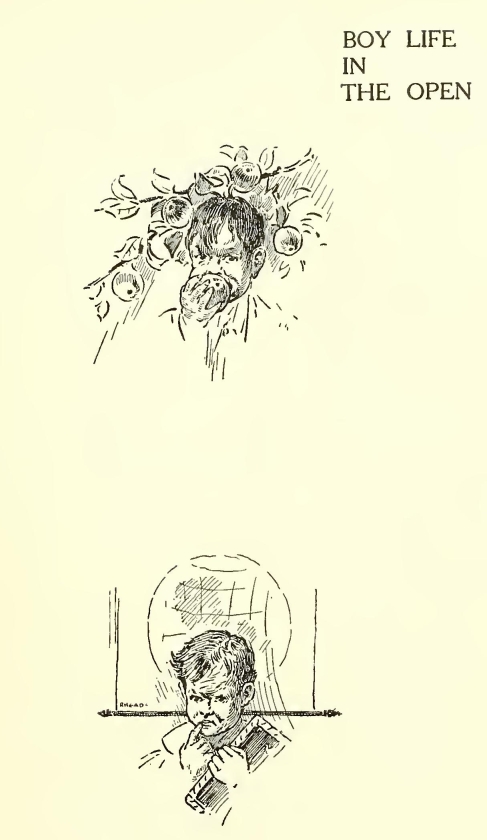
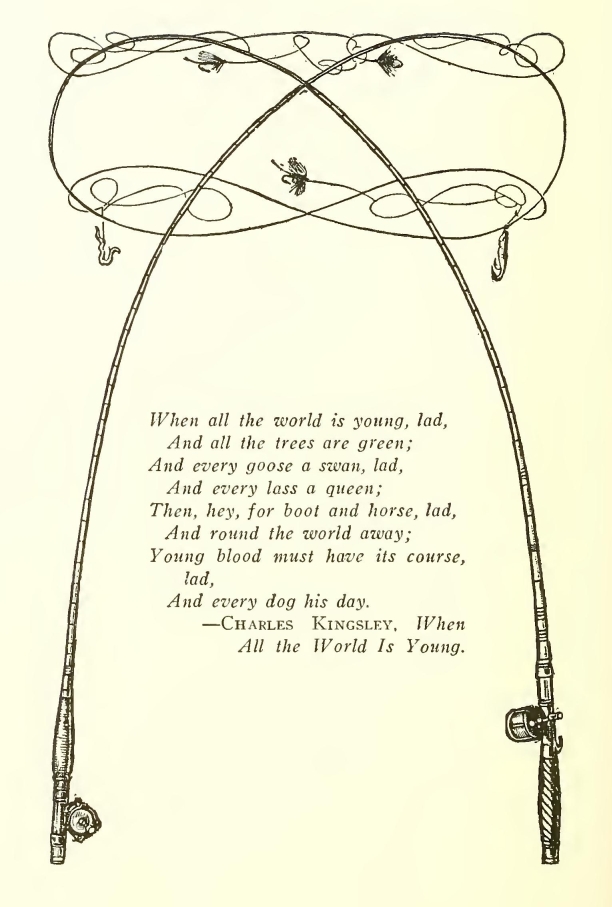
When all the world is young, lad,
And all the trees are green;
And every goose a swan, lad,
And every lass a queen;
Then, hey, for boot and horse, lad,
And round the world away;
Young blood must have its course,
lad,
And every dog his day.
—Charles Kingsley,
When All the World Is Young.
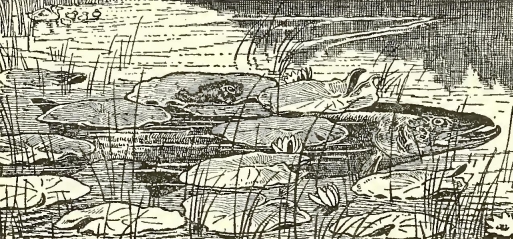
HERE’S a clam!”
“Where? I don’t see it! Can’t I get it?”
Of course he could get it, for the water in the creek was shallow and the father remembered his own boyhood too well to deny the little chap’s request. So the boat was stopped while the boy, arm bared to the shoulder, reached down to the sandy bottom of the stream and captured his first clam.
You don’t see anything interesting in that? So much the worse for you. It interested the boy, and the boy’s interest was quite enough to enlist and hold the interest of the father. If you do not yet know that whatever appeals to the mind of a child is important, however insignificant that thing may be in itself, you have something to learn.
The two, father and boy, had left the log cabin among the pines soon after breakfast in search of minnows for use in fishing. When they started out the boy went along simply because the two were chums and almost inseparable companions. The father had no thought of what that stream might mean to the lad, and he learned a lesson that morning which he will never forget. He had spent his boyhood in the country and had never stopped to think that the sights and sounds along this stream would all be unfamiliar to his city-bred son.
They had not gone far up the stream before another discovery was made, and two baby snails joined the clam on the seat. Then a crawfish was seen scuttling over the gravel and was added to the collection. By this time the boy was bubbling over with interest and enthusiasm, but when, rounding a bend in the stream, a turtle was discovered sunning himself on a bit of drift-wood, it was evident that the wonders of this wonderful stream had reached their climax. Cautiously the boat was moved toward the turtle’s resting-place, but just before he was reached he quietly slid off into the water. It would not do to leave the lad in such an ocean of disappointment as swallowed him up when that turtle disappeared, so, with landing net in hand, they watched for his reappearance. It seemed hours to the boy before the beady eyes of the turtle were seen looking up at them from the moss where he had found a hiding-place. Then a careful manipulation of the net, a sudden scoop, and the turtle was scrambling about in the bottom of the boat.
“See him snap! Will he bite me? Look at the markings of his shell! How old do you suppose he is? What do turtles eat? I’m going to take him home!”
Questions and exclamations crowded and jostled each other as the eager lad studied his latest prize.
When the captives had been carried to the cabin and duly admired by other members of the family, the question arose as to what should be done with them. Throw them back? Eager protests from their owner. When he was finally convinced that they were not altogether adapted to serve as pocket pieces, he proposed an aquarium, and aquarium it was. An ancient and discarded dish-pan was found, the holes filled with rags, water and rocks supplied, and clams, crawfish, snails and turtles were compelled to live in seeming amity, whatever their personal feelings may have been. Later on other turtles were added to the collection, and a yellow lizard with a blue tail gave the finishing touch to this conglomerate of animal life.
How shall we educate the young? This question, holding first place in the hearts of parents and lovers of children, elicits clamorous and often contradictory answers. The advocate of “cultural” studies finds a sturdy antagonist in the defender of “vocational” training, and school boards make frantic efforts to please everybody, and succeed, as is common in such cases, in pleasing nobody. Meanwhile, our children are the helpless and unfortunate victims of a series of experiments, as the school authorities try out different educational theories.
Far be it from the writer to propose a solution of the difficulty or to proffer any panacea for our educational ills; but in all humility he ventures to suggest the desirability of making it possible for the child to know something about the world in which he lives. Book-learning, essential as it is, is not enough if we would fit the child to live the larger and more joyous life. When we have studied literature and art and philosophy and science, when we have become familiar with the great cities with their bewildering sights and distracting sounds, the finest things remain to be discovered, and these discoveries must be made as we stand open-eyed in the presence of God’s workmanship.
Hills and streams, woods and flowers, bees and birds and butterflies, the flora and fauna of this earth where we have our home for a little time, should, somehow, be brought into the life of the child. The boy who grows up into manhood without being privileged to know the world of nature by personal contact has been robbed. He may be intelligent in many things and a useful member of society, but he has missed out of life some of its deepest satisfactions and purest joys. Indeed, such an one is not symmetrically educated, and is quite likely to be put to shame as the years pass. A story is told of a young woman, able to order her breakfast in six different languages, who, spending some days in the home of a farmer, made most mortifying mistakes concerning the common things of country life. When, coming down to breakfast one morning she discovered a plate of honey on the table, she felt that the time had come for a display of her knowledge and for the discomfiture of those who had laughed at her mistakes, and exclaimed, “Ah! I see that you keep a bee.”
Take the witness box! Yes, I am speaking to you, middle-aged man, city-dweller, slave to business, familiar with paved streets and great buildings, the honk of automobile horns and the love songs of vagrant cats.
“Were you born in the country?”
“Yes.”
“Have you forgotten your boyhood?”
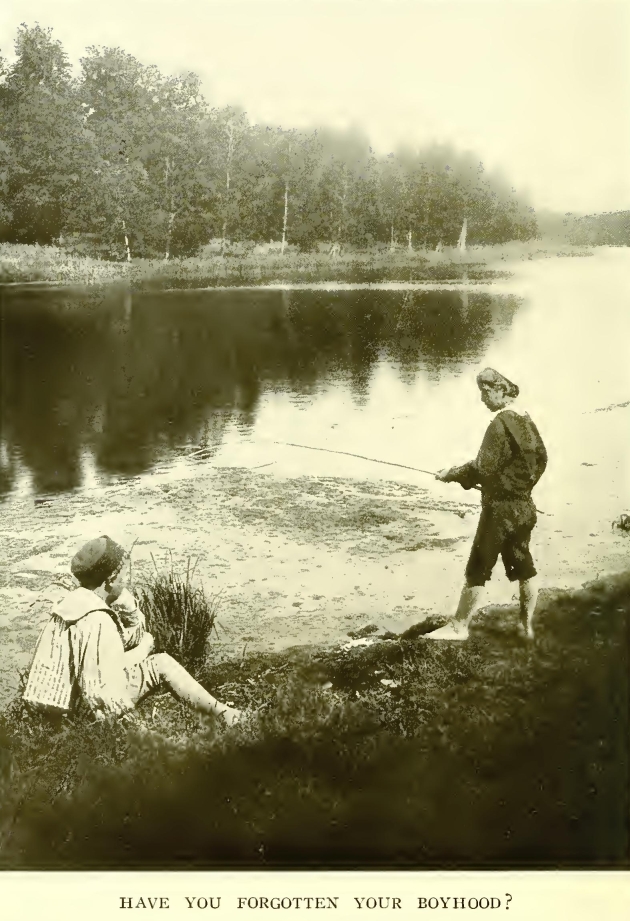
“Forgotten it! Sometimes I can think of nothing else, and always something out of that boyhood is popping up even in the midst of my business undertakings.”
“Do you regret that you were not born in the city?”
“Regret it? Say, you are fooling. I wouldn’t trade the recollections of my boyhood on the farm for the best business block in this city.”
“But it can’t be worth anything to you in a business way. Life in the country doesn’t train one to manufacture gas engines.”
“Well, I’ve never stopped to consider what I owe in the matter of business success to my boyhood in the country, but now that you raise the question, I’m inclined to believe that it gave me pretty good training in some ways for the business in which I am engaged.
“When I came into this business at the age of twenty I was given a place in the shipping department at a salary of seven dollars per week. Now I am at the head of the firm, while many of the fellows who were with me in those days are still working on salary. You see I had the advantage of the city boys in being accustomed to work. On the farm I had my regular tasks. Why, when I was a little chap I wiped the dishes for mother, and when I grew older I had to keep the wood-box filled and go after the cows and pick up potatoes and—but you know what a lot of things there are to do on a farm where ‘a boy can help.
“Now that I think of it, I imagine that I was learning application, industry and self-control—big assets in business. The city-bred boy has never had that schooling. He has not been trained to hold himself to hard and continued effort. It is not his fault, and I do not know that his parents are to be blamed. I have two boys of my own born in the city, and one of the questions which perplexes me most is how to provide them with regular tasks that shall develop their sense of responsibility and cultivate habits of industry and application. Although I could afford to have a man to take care of the lawn and attend to the furnace, I have the boys do this work for their own sakes. It is good as far as it goes, but I am afraid it does not go far enough. They have too much time to spend in doing nothing, and habits of idleness formed in boyhood are likely to stick when one comes to manhood. I do not believe in manufacturing tasks or setting them at work which is not real, for boys are keen observers and you cannot fool them into believing that they are doing something worth while when compelled to take wood from one corner of the cellar and pile it in another corner, and then shift it back again. The man who devises some way of supplying real tasks for the boys of the well-to-do city families will be a public benefactor.
“Now, that you have started the discussion of this subject, how about the physical health and strength that I brought from my country life to the work which I am doing? Of course, we have our sleeping porches and playgrounds and medical inspection in the public schools, and are doing what we can to build sound bodies for our city children, but I suspect that the out-door life of the country boy and his regular exercise and plain food furnish a far and away better physical preparation for the strenuous work of business life than anything we are able to devise for our children in the city.
“You never saw my old home, did you? Well, the house stood at the foot of a hill and close by a little stream. In the summer time the wild strawberries in the meadow above the orchard were so thick that I remember picking a bushel there one day. For raspberries and blackberries we usually went some three or four miles to Babcock Hollow, but once there you could fill a ten-quart pail in no time at all, and they were the sweetest, most luscious berries you ever tasted. Then, in the fall, came apple picking and potato digging and corn cutting and nut gathering. There were dozens of butternut trees in the pasture-lot through which the creek ran, and on Button Hill you could get all the chestnuts you wished. Did you ever gather beechnuts? They are so little that picking them up by hand is slow work. We used to take three or four sheets, spread them under a beech tree, after the first frost had opened the burrs, and then one of the boys would climb the tree and pound the limbs, sending the nuts down upon the sheets in showers.
“But the winters! When there was a good crust on the snow you could start on your sled at the patch of woods on the top of the hill, nearly a mile away, and ride right into our barnyard. I’ve done it many a time. Skating! We could go almost straight away for miles on the river. One night when Jim Gilbert’s people were away from home I got permission to stay all night with him.
I took my skates along and after supper we came down to the river and skated. The moon was full and it was almost as light as day. I must have been careless, for I skated too near an open place and broke through. Jim was just behind me, and, before he could stop or change his course, he had stubbed his toe on me and in he went, head first. The water was shallow, so there was no danger, but we had a mile to walk in our wet clothes, and all the way up hill. I remember that our clothes were frozen stiff when we reached Jim’s house. We built a roaring fire, stripped off our wet clothes and put on some that were dry, and then sat up until one o’clock eating chestnuts and popcorn and talking about what we would do when we were men. Jim had an idea that he would be a lawyer, but the last time I saw him he was selling tooth paste at the county fair.
“In some ways spring in the country is not remarkably attractive. The fields are brown and bare and soggy, and the winds cannot fairly be called zephyrs. As the frost leaves the ground the roads become rivers of mud, and some of the “sinkholes” seem bottomless. Early spring is easily the most unlovely time of the year in the country, but even then life has its brighter side. With the first breath of the south wind the sap begins to leave the roots of the hard maples and the sugar season begins.
“Did you ever work in a sugar-bush? No? Poor fellow! You’ve missed something worth while out of your life. I understand that nowadays they evaporate the sap in shallow pans; we used to boil it in a big iron kettle. We did not have many maples on our place, so I sometimes worked for Deacon Bouton, who had the next farm west of ours. He had a big sugar-bush, and we carried the pails of sap on neck-yokes. When we had a big run of sap we had to boil all night as well as during the day. I’ll never forget one night when we had a feast. There were two boys besides myself: Ed Bouton, the deacon’s son, and John Hammond. Ed had brought forty-five hen’s eggs and John added five goose eggs. We boiled the eggs in the sap, and the three of us ate those forty-five hen’s eggs and started on the goose eggs. For some reason we did not relish them. Possibly the hen’s eggs had taken the keen edge from our appetites.
“But how I’m running on! Regret being born in the country? Do you know that I can shut my eyes and see the hills and meadows and orchard, fairer than any ever put in colours on the canvas? I can see the oriole’s nest swinging from a branch of the big elm in the corner of our yard and the nest of the pewee under the bridge. Just across the road in the meadow are glorious masses of violets, and mother’s peonies and sweet pinks beat anything I’ve ever seen since. When I’m dog-tired from the day’s work it rests me just to think of the quiet and calm and beauty of the old home among the hills.
“And there’s another thing that I want to tell you: when I go into the country I can enjoy it. One of my best friends, born in the city, is bored almost to death every time he tries to take a vacation in the country. He doesn’t know the difference between a hard maple and a tamarack, and asked me once if a woodchuck was likely to attack a human being if not angered. He’s afraid of bees and garter snakes, and even a friendly old “daddy-long-legs” gives him a nervous shock. He can’t enjoy the fields and flowers, for he was brought up on people and bricks. I’d like to be back there at the old place this minute. I’ll bet I could find some raspberries on the bushes that grow in the fence corners along the west road. We used to string them on timothy stalks as we came home from school, and I’ve never tasted any such berries since.”
The witness is through with his testimony and we’ll submit the case to the jury without argument. What do you say, fathers and mothers of the city? Shall your children have a chance to learn nature’s secrets at first hand? Will you give them some time in the open every year, where the work of man has not elbowed the work of God into a corner and out of sight? More, will you help to send the children of the poor, children whose playground is the city street, and to whom the stories of green fields and limpid streams and flowers that belong to any who will gather them, sound like fairy tales—will you give to these children of the tenement and the slums days where the sunshine is not filtered through a bank of smoke and all the ministry of God’s unspoiled work strengthens them for the coming days of toil?
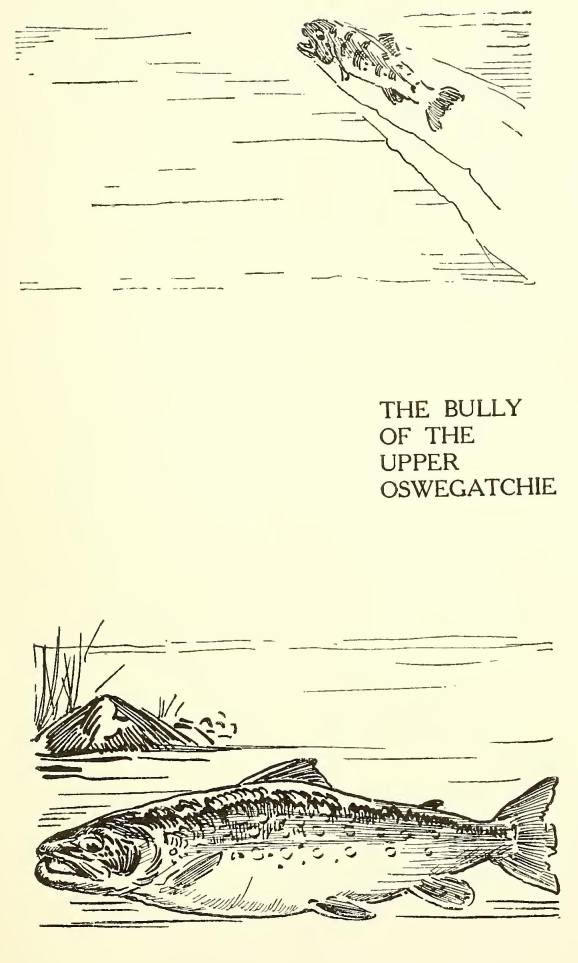
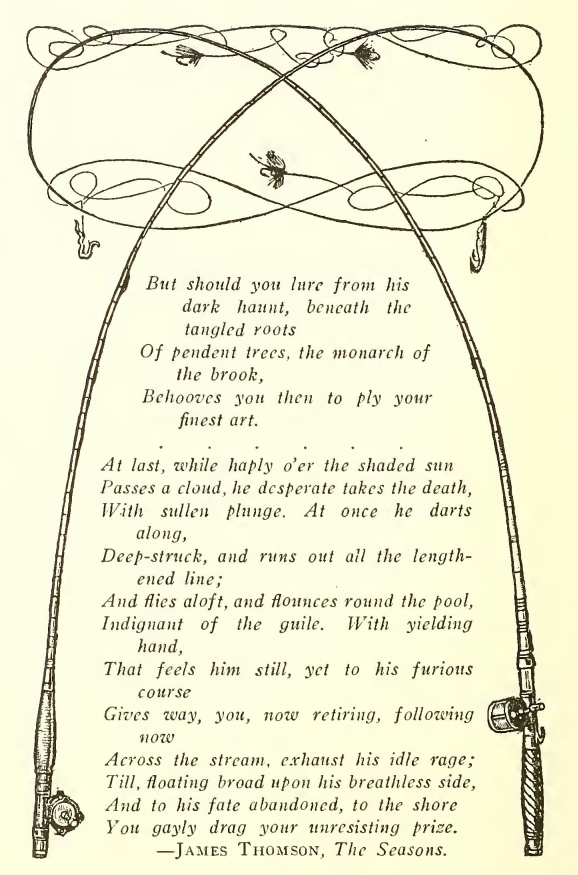
But should you hire from his
dark haunt, beneath the
tangled roots
Of pendent trees, the monarch of
the brook,
Behooves you then to ply your
finest art.
At last, while haply o’er the shaded sun
Passes a cloud, he desperate takes the death,
With sullen plunge. At once he darts
along,
Deep-struck, and runs out all the length-
ened line;
And flies aloft, and flounces round the pool,
Indignant of the guile. With yielding
hand,
That feels him still, yet to his furious
course
Gives way, you, now retiring, following
now
Across the stream, exhaust his idle rage;
Till, floating broad upon his breathless side,
And to his fate abandoned, to the shore
You gayly drag your unresisting prize.
—James Thomson,
The Seasons.
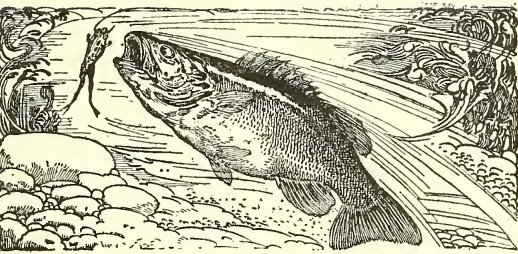
F the sucker had gone twenty feet farther up the little brook on his foraging expedition this story would not have been written. However, by the time he had appropriated some ten thousand trout eggs, the hunger which had urged him into the mouth of the brook deserted him, and, as the water was too cold for his liking, he made his way back to the river where he could take a siesta in the pool that he had left that morning.
Just above the spot where the sucker turned about was a bend in the stream, and, passing that, you came upon a reach of shallow water running over the most beautiful bed of gravel in that whole section. It was here that the Bully was born, in the afternoon of the very day when destruction in the form of a predatory sucker came so near to him. Not that he appeared much like a bully in those first hours of conscious existence. In fact he looked more like an animated sliver with a sack suspended from underneath. He moved slowly about the stream in company with a hundred or so other little fellows until the sack had disappeared, and then it was easy to see that he had the advantage of all his comrades in the matter of size at least.
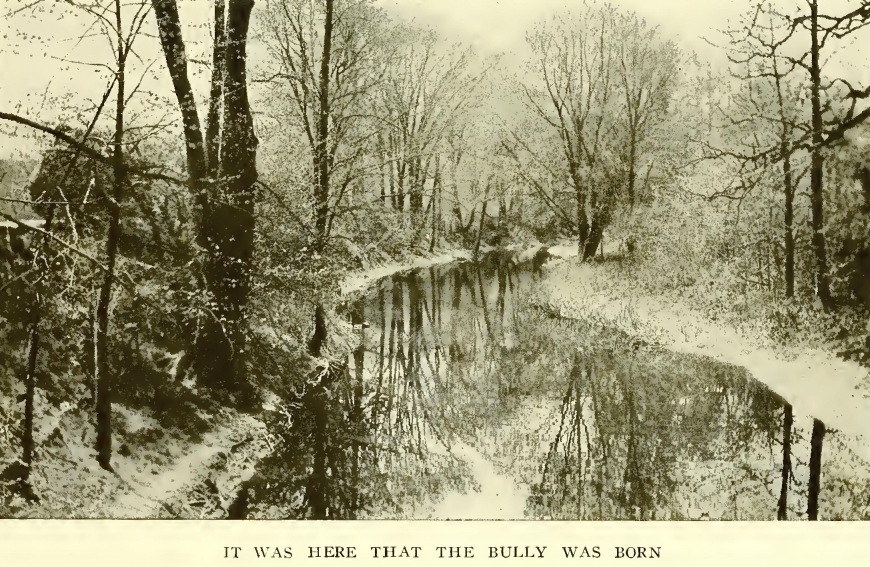
When they began feeding upon the tiny forms of life found in the creek, the Bully soon gained a reputation for pugnaciousness. He did not hesitate to crowd his best friend away from a larva, and, before he was an inch long, he had bitten the left pectoral fin from one of his comrades who had ventured to resist the Bully’s attempt to rob him of a luscious little snail that he had discovered. One day when the Bully was yet a fingerling he joined battle with a chub twice his size, and, although he lost a part of his tail in the fray, and all the spectators thought he was whipped before the conflict had fairly begun, the thought of giving up never occurred to him, and he fought until his foe turned tail and fled into the river, a quarter of a mile away.
He was still living in the brook and had come to be almost four inches in length when he had an experience that shook his nerves somewhat. As he was resting beside a sod a little worm, all bent out of shape, but undeniably of the vermes family, came floating down the stream and he promptly grabbed it. Then came a sharp prick in his lip and something was pulling him out from under the sod. He braced and twisted and threshed about, but all in vain. Up he went out of the water, all the time doing fancy somersaults such as he had never attempted before. A moment later he struck the water with a splash and was soon safely hidden under the sod again. From his hiding-place he watched that worm come floating past him again and yet again, but he had learned caution. Now that he looked closely, he saw that the worm was fastened to the end of a string, and a little later he discovered that this string was tied to a stick which was in the possession of some creature that walked along the bank of the stream. Later on he learned that this strange animal was a small boy and that all members of this species were his enemies. Whether or not he ever realized that he owed his life to the fact that the boy had lost the last of his store hooks and was using a bent pin that day, no one knows.
All that summer the Bully lived in the brook; but when the days grew shorter and it began to freeze he moved with his friends into the river. That winter, when the river was frozen over except in shallow places where the current was swift, he had a narrow escape from a mink. He was talking with a trout much older and larger than himself about the comparative merits of worms and flies as food when a dark form darted towards them with open jaws, and, with one snap, his neighbour was captured and carried away. This foray caused great excitement in the trout colony, and the Bully learned for the first time of the existence of rapacious animals frequenting the banks of the river which made their living by capturing unwary trout.
The following summer he spent in exploring the river above the point where the brook joined it. Here there were hills crowding close in on either side of the river, and rapids were numerous and strong. Practice in rushing up the swift water brought his muscles to such a state of development that every now and then he would spend half an hour in jumping out of the water as far as he could. In fact he entered a jumping contest held under the auspices of the Hemlock Point Trout Club late in July, and carried off the first prize, an enormous blue-bottle fly. The judges on this occasion decided that his jump was two and a half times his own length which would probably make it some twelve inches. It was during this summer that he became expert in taking game on the wing. There is a tradition among the Oswegatchie trout that on one occasion, with a favourable start, he pulled down a “devil’s darning-needle” that was flying eighteen inches above the surface of the water and going at the rate of sixty miles an hour. N. B.—This is merely a tradition and is unsupported by trustworthy historical evidence.
The bullying tendencies waxed strong during this second summer. One dislikes to set it down, but it was about this time that he entered upon those cannibalistic practices in which he persisted for the rest of his life. One dark and chilly day, when all the millers and bugs and flies seemed to have gone into retreat, noon came and found him with a gnawing pain in his stomach which made him almost beside himself. Unfortunately when his hunger was at its height a little trout that was playing tag with some of its fellows happened to jostle him. In his anger the Bully snapped at and swallowed him. For a moment he was conscience-stricken, and then, when he realized what a delicious morsel he had taken to himself, he turned to and grabbed up fifteen other little members of his family without stopping to take breath. Henceforth he was looked upon as a social outcast by the best people in troutdom and his only intimacies were among the tough and lawless members of the community. Doubtless he brooded over this ostracism, and grew bitter as he realized the evident contempt in which he was held. At any rate, he waxed more and more cantankerous and disagreeable as he grew bigger and stronger.
A record of all the experiences through which the Bully passed would fill a volume. Only a few of the many can be set down in this brief biography, and those the more important ones. When he was three years old he was recognized as the boss of the river above the brook. For some time stories had come up stream of the prowess of a big trout living five miles down the stream in a mill pond. Confident in his ability to whip anything that wore fins, the Bully started down stream one May morning bent upon challenging this far-famed warrior to mortal combat. He had gone about one-half the distance and had stopped to rest for a little in a riffle, head up stream, when a strange looking fly came hopping and dancing across the water. It was many coloured, but that which attracted him most strongly was its body, which shone like burnished silver. Without the least hesitation, he made a grab for it only to feel that same stinging in the lip which followed upon his experience with the crooked worm when he was a little fellow. Fortunately for him he had touched the fly lightly, and, while he felt a pull for an instant, it was only in the skin of his lip, and that, for some strange reason, was torn. Fie started down stream vowing that never again would he snap at a fly with a silver body.
By the second morning he had reached the pond, and found himself among strangers. It did not take long for him to become involved in a scrap with a trout of about his own size from which he quickly emerged triumphant. Had the pond not furnished seemingly unlimited supplies of fat chubs he would have proceeded to give free rein to his cannibalistic inclinations; but as it was less trouble to catch the chubs than his own blood relations, he filled himself with the former, and then took a nap under the shadow of a big stump, the top of which stood a little way out of the water.
A little before sundown, when he was quite refreshed and had begun to think of taking a little turn about the pond in search of adventure, he heard the sound of many voices, and, looking out from his hiding-place, saw a company of trout moving in his direction. In the lead was his foe of the morning. There, surrounded by an admiring crowd, came the biggest trout that Bully had ever seen. His under jaw projected far beyond its mate and had an ugly upward curve. He was broad across the back and thick through and moved with all the pride of a conquering hero. “Where is he? Show him to me. I’ll make mincemeat of the insolent intruder.” The booming voice of the big fellow left the Bully in no doubt as to the identity of the approaching monster. It was the fighter of whom he was in search.
The Bully would have been scared if that possibility had not been denied him. Instead of fleeing in fear he came out from under cover and shouted: “Are you talking about me? You big bluffer! I’ll make you food for the crows.” If the truth must be told, both the combatants used language that was not only exceedingly scurrilous, but shockingly profane. In this gentle exercise the Bully had the best of it and the pond trout became so enraged that he dashed at his enemy with jaws extended. The Bully was so busy swearing that he came near losing his life. As it was, he dodged just in time to prevent those powerful jaws from closing upon him, but not quickly enough to escape a slashing from two big teeth which laid his side open in deep gashes. He was a surprised Bully, but not dismayed.
The battle that followed had no historian. Of much that took place, the whirling and darting, the snapping and struggling, the reports that have come down through the years are somewhat confused and even contradictory. It seems clear that at the first the Bully had the worst of it. Besides the gashes received in the first attack, he lost one fin and a piece of his tail early in the fray. The pond trout had all the advantage in size and was cheered on by his friends; but the Bully’s gymnastic exercises, fighting with the rapids, stood him in good stead now. His muscles were steel, while those of the pond trout had grown somewhat flabby since he had come to content himself with life in the still water. As they feinted and charged and whirled about, the pond champion began to grow short of breath and found increasing difficulty in meeting the rushes of the Bully, who seemed to grow more agile as the battle raged. Then there came a moment when the Bully feinted for his opponent’s tail, and, when the pond trout turned suddenly to guard his caudal extremity, he left his throat unguarded for an instant—and it was all over. Once the Bully had set his teeth into the white throat he shook and raged and tore while the life-blood of his foe gushed out, and the denizens of the pond saw their supposedly invincible warrior die before their eyes.
Nothing is known, certainly, of the Bully’s life after this up to the day that he met his death. It is whispered that before leaving the pond he undertook to capture a white miller that came fluttering over the surface of the water just at dusk one night and found himself fast at the end of a line as in his boyhood. Some even assume to say that after vainly flinging himself into the air in the effort to shake the miller out of his mouth, he said goodbye to those who had been drawn about him by his struggles, and was about ready to give up hope when one last struggle took him over and under a root and he found himself free. They even go so far as to say that for many a day after that the miller stuck to the Bully’s jaw, and that from it floated a fine, white thread.
Another unsupported rumour has it that as he was going up stream one day in a narrow part of the stream he found a fine bunch of branches and leaves, and gladly pushed in among them when he heard a disturbance in the water back of him. No sooner had he entered this refuge than it began to rise out of the water, and he shortly found himself on shore and being handled by an animal that resembled the boy who had given him so much trouble years before, only much larger. Even then he would not give up without an effort, and, summoning all his strength, he gave a mighty squirm and escaped out of his captor’s hands. He struck on the gravel, gave two or three tremendous leaps and was in water again, free.
The Bully had grown to be the biggest trout in all that stretch of water, and his under jaw protruded as far and was quite as hooked as had been that of his vanquished enemy of the pond. An August morning found him well up the river in the dense woods where the water was cool and food was abundant. He had found a place where the water was some four feet deep, and a fallen tree-top made the finest kind of a hiding-place. Just above him was a clear space some two feet in diameter where now and then he could take a bug or a foolish miller. Lying at his ease, he thought with satisfaction of his numerous victories over other trout and of his good fortune in escaping those strange beings which prowled along the shore and threw enticing flies or worms into the stream. Just then—but, before we tell of this incident, we must bring in another story. That morning four men had broken camp some miles down the stream and started on a sixteen-mile tramp back into the woods, where they were to spend a month on the shore of a lake, fishing and hunting. The duffle was piled upon a rude sled drawn along the trail by a horse. When two of the party were ready to start ahead of the others, the guide, Fide Scott, said to one of them, the Preacher, “We’ll follow the river for more than half the way, and if you fellows can catch some trout we’ll have ‘em for dinner.”
The Preacher already had hooks and a line in his pocket, and at once added a supply of fat angle worms from the common stock. They had walked for an hour or more when they came to a point on the river where a tree had fallen across the stream. Just below this natural bridge the water was deep and still, and a great mass of brush seemed to promise an ideal hiding-place for trout. To make conditions exceptionally favourable there was a good-sized open place in the centre of the brush where one might drop his lure without the absolute certainty of getting snagged. The line came out of the Preacher’s pocket in a hurry, the hook was tied on and two exceedingly well-developed worms were looped in such a way as to be as enticing as possible. A piece of alder, six feet or so in length, was pressed into service and everything was ready for the piscatorial adventure. But the pole was too short. Doing his best, the fisherman could not stand on the shore and drop his bait into that open spot in the brush. Only one thing remained, and that was to walk out on the log, from which the bark had dropped away, leaving it as slippery as the cellar door down which the Preacher had been wont to slide as a boy. Slowly and with exceeding caution the adventurer made his way inch by inch along the log until he had reached a point from which he could drop his hook into that most attractive opening in the brush. Balancing himself carefully, he allowed that mass of wriggling worms to touch the surface of the water when—but now we’ll go back to the Bully.
When he saw that bunch of angleworms just above him he forgot the crooked worm which had pricked him in his childhood. He was sure that here was the most satisfying morsel that had ever come his way and rushed for it. He closed his jaws on only a part of the mass, and the rest disappeared, much to his disappointment. What he secured made him eager for more. It was distinctly more palatable than anything he had tasted for many a moon. Just as he was longing for more of the same kind—behold! another bunch of wriggling, squirming worms appeared in almost the same spot. This time he did not propose to lose any of this meal so providentially provided, and he made a rush that enabled him not only to grab the entire mass, but to get it well back in his mouth. Then came that upward pull which he had felt in former experiences. He kicked and struggled and threshed, making the water boil about him. For a little his upward progress seemed to be stayed and he imagined that he would get free after all. Then his ascent began again and continued, despite all his mighty protests, until he felt himself enwrapped and almost smothered by something, he knew not what. The Bully of the Upper Oswe-gatchie never knew what happened after that. He could not see the painfully anxious face of the Preacher endeavouring to balance himself on a peeled log and haul a big trout out of the brush by a sheer pull. He had no knowledge of the fervour with which the Preacher embraced him, or of the perilous journey to the shore along that treacherous pathway. He could not see the comrade of the Preacher when, excited by the splashing made by the Bully in his efforts to get off the hook, he jumped into the stream in his anxiety to be of help.
When the rest of the party came up, there upon the grass lay a noble fish, and the proud Preacher was fairly sizzling with eagerness to tell all about the capture. There was nothing with which to weigh the Bully, but he measured a plump twenty-two inches in length and Fide Scott placed his weight at a good five pounds. That Preacher fairly split the buttons from his coat, swelling with pride when the guide exclaimed: “I’ve lived along the Oswegatchie for fifty years and he’s the biggest trout I ever saw took out of the river.”
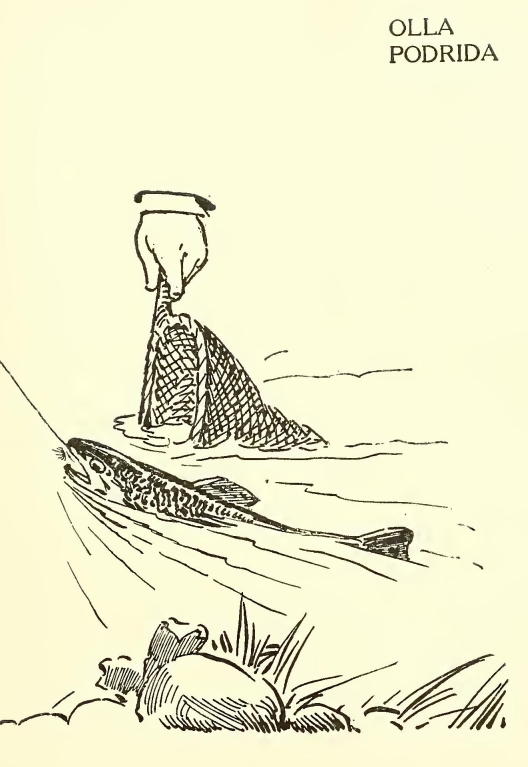
We may say of angling as Dr. Botcler said of strawberries: “Doubtless God could have made a better berry, but doubtless God never did”; and so, if I may judge, God never did make a more calm, quiet, innocent recreation than angling.—-Izaak Walton, The Complete Angler.
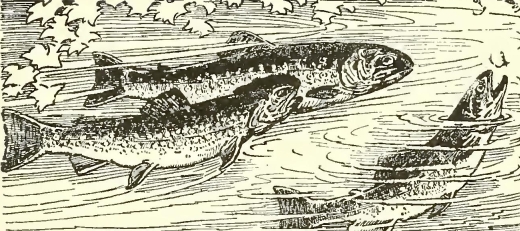
HE backward look reveals many-isolated bits of experience in the out-of-doors, not one of them important enough to form the nucleus of a story of respectable size, and yet to each one crying out every time we glance in its direction: “Tell about me!” If the reader finds nothing of interest in these odds and ends, he who writes may at least hope to quiet the importunities of these clamorous voices from out of the past.
The Canasawacta Creek is usually a quiet, inoffensive stream, making its way between the low-lying hills of central New York to its union with the Chenango River. The rain had been falling steadily all day and the creek was somewhat swollen when the families in the little hamlet at South Plymouth retired for the night, but no one thought of danger. Shortly after midnight a little chap in one of those homes was awakened by his father, who lifted him out of his trundle bed and wrapped him in a blanket. The lad did not understand what had happened, even when he saw the water ankle-deep on the living-room floor, or when his father carried him through the swiftly rushing flood to the house of a neighbour on the height of land. It never occurred to him to be afraid so long as his father’s arms were about him.
In the sunshine of the next morning father and boy walked hand in hand down the street to the home which they had so hastily abandoned the night before. The creek had returned to its bed and was behaving much as usual. The boy wondered not a little at the flood-wood left stranded against the picket fence, and was not slow to begin an investigation of the changes wrought in his playground by the visitor of the previous night.
Over towards one corner of the yard was a depression in the ground with water still standing in it, and as the lad passed this pool he saw something moving. Although less than three years old, he had learned that a moving object in the water was very likely to be a fish. Young as he was, a great passion of pursuit seized him, and he grabbed with both hands at the object dimly seen through the roily water. Conviction became a certainty as he felt the fish squirm out of his grasp and received a splash of muddy water as the frightened victim struggled in the shallow pool. Clean clothes and a mother’s injunctions were forgotten in the lust of the chase. In he waded and gathered that fish to his heart with both arms. When the father returned from investigating conditions in the house, there stood the lad, wet, muddy, but triumphant. What kind of a fish? The boy neither knew nor cared. It was a fish—and that was quite enough, especially when accompanied by the unquestioning conviction that it was the biggest fish in all the world. Since that boy has grown to manhood he has often said to himself as he looked upon an unpromising bit of water, “You never can tell. If fish are to be caught in your front dooryard, where may you not find them?”
Many trout come to view as we peer into the mists of the long ago, but, among them all, two are in a class by themselves. One of them came out of the Otselic River on a day when the boy had been berrying and had made a failure. Swinging his empty pail, he came to the river just where it had dug its way into the bank and formed a deep pool over which the alders hung. No normal boy goes abroad on any day, save Sunday, without a fishhook and line in his pocket. Bringing forth these essentials to happiness, he found a pole, dug an angleworm from a muddy spot, and dropped his bait just where the water was blackest. Sunfish and perch and eels abounded in this river, but it was not famous for trout. In fact, this boy was not fishing for trout and so was all the more amazed when, after a sharp struggle, he landed a speckled monster on the grassy bank. At least he seemed a monster in size to the boy, and a conservative adult estimate would place the fish at well over a pound.
Now, failure to find berries appeared plainly providential, for here was the empty pail and the trout could be carried home alive. Under the porch at the back of the house was a half-hogshead, set into the ground, into which poured a little stream of pure, soft spring water brought from the nearby hillside through a lead pipe. Did a trout ever have a more ideal place of residence? Here he lived and thrived for many a day, fed with untiring regularity until—just here memory fails. Possibly he died of old age.
The boy had grown somewhat older and had learned to make and use the “snare,” when he went on a visit to friends in Cortland. Cortland is a thriving city now, and even then was a wide-awake and bustling village; but its chief attraction to the boy was its river—the Tioughnioga. No sooner had he said “How do you do?” to his relatives than he hurried to the river bridge to snare suckers. Now don’t sniff, you owners of hand-made split-bamboo rods and scorners of all fishing except that for trout or bass! If you will just think back along the years until you catch sight of yourself as you once were, you will realize that the boy knows but one rule when fishing, and that is, “Get there!” Methods do not matter to him so that he catches fish. Neither has he learned that dainty discrimination among the inhabitants of the water that comes with the years. We know boys, even in these days, who would rather stand on a log and catch unlimited numbers of sunfish, than to fish all day and take a half-dozen bass.
He had borrowed a cane pole, and the line, with the slipping-noose of shining copper wire at the end, was soon dangling over the side of the bridge. Yes, the suckers were still there just about as they had been a month before when he saw them but lacked the paraphernalia for their capture. Of course, they were not good eating, for it was summer-time and their flesh was soft. So, as often as one was derricked wriggling to the bridge, it was thrown back, and the process repeated. Naturally, he sought to catch the biggest ones, and when he discovered one of unusual size lying in the shadow of a rock he was all a-tingle with desire and anxiety. Cautiously he dropped the snare well above the fish and gently guided it down with the current until the copper wire was well back of the gills, and then jerked. Hurrah! he had him! Sucker? Not with that mouth and the beautiful carmine spots upon its sides. It is a trout, and a big one. The suckers had lost their charm, and a bee-line was made for the house of his friends that he might ‘have company in his rejoicing. Passing along the street, proudly dangling the big trout from an alder sprout, he was met by a man who stopped to admire the fish.
“Where did you catch him?”
“Down at the bridge. I snared him.”
“Snared him? Don’t you know that’s illegal?” When the good-natured man, who had not forgotten that he was once a boy, had explained that snaring a trout laid one liable to fine or imprisonment, a scared, small boy sneaked by back-ways, and with the trout carefully hidden under his jacket, to the home of his friends. Heretofore game laws had not entered into his scheme of life. He was worried and unhappy; but nothing happened.
Every fisherman has his favourite lure for bass. Some put their trust in frogs, others swear by minnows. The crawfish, dobson, fly, spoon, worm, lamprey, pork-rind, and almost innumerable other supposed attractions,—each has its enthusiastic champions. But what will you do when all these fail? It came pretty near being that question which was faced by the boy who sought to capture the big bass lying under the Erie Canal bridge. On sunny days one could stand on the bridge and see a score or more of bass resting near the bottom of the canal, but this particular fish, of aldermanic proportions, made all the others seem like infants. The boy could and did catch some of these bass, but the prize fish maintained a tantalizing indifference to all that was offered. Once or twice he had rubbed his nose against a fat minnow that was dangled directly in front of him, but usually he treated the most enticing morsel with utter disdain. The boy had exhausted his repertoire of attractions, when, on a certain morning, he made his way to the bridge with the fixed purpose to ignore the big bass and devote himself to more responsive members of that family. As he trudged along the road he noticed an apple peeling that had been cast away by some passer-by. A part of it was brilliant red. An idea popped into the lad’s mind, only to be turned out of doors as absurd. But it would not stay outside. Again and again it returned asking hospitality, but the boy was firm and continued on his way. Once more, as he fished, that preposterous idea thrust itself upon him, and finally he retraced his steps and picked up the apple-peeling. Going back to the bridge, he fastened a piece of the red peeling to his hook, red side down, stood well out of sight of the fish, and began wiggling his pole in such a way that the brilliant peeling was compelled to dance a jig on the surface of the water. Only a moment of suspense, and then came a strike that almost carried him off his feet. Was it the big one? The pole bent until it threatened to snap in two. Pushing it rapidly backwards through his hands, he grasped the line and proceeded to haul in hand over hand. Of course a number of things might happen, any one of which would be a measureless calamity. But the line did not part, the hook did not tear out, the heavens did not fall, and when at last a noble bass was safely landed on the bridge the boy let out a yell that might have been heard in Syracuse. Five pounds, four ounces, he weighed, and his relatives under the canal bridge knew him no more for ever.
The bass has countless vagaries, and one never knows what he will do under given circumstances. As a father and son were fishing for small-mouth on the St. Lawrence, the senior hooked a fish which broke the snood and went free. Now there is a persistent tradition that, when a bass has been pricked by the hook, he does not bite again until the passing of twenty-four hours or such a matter has served to wipe the experience from his memory. In less than an hour the boy caught a two-pounder having in its jaws the identical snood which the father had lost. The tradition was discredited, unless we assume that the one caught had envied the mouth ornament worn by the one hooked earlier in the day, and, stealing it, had fixed it in his own jaw.
Bass fishing on the Bay of Quinte is famous for its excellence. Not only is there abundance of fish, but they are exceptionally gamey. Their vigour and eagerness to be caught is illustrated by the member of this tribe that jumped into our boat. Every one has heard of the Florida mullet that, attracted by the light in a boat at night, came jumping over the sides in such numbers that they sank the boat and imperilled the lives of those on board. But a bass is no such fool fish as a mullet. If they do any jumping it is usually away from the boat, not towards it. The bass under consideration was hooked in some twenty feet of water, and put up a vigorous fight. The fisherman was compelled to give out line in considerable quantities, but when the fish ran under the boat it was evidently time to “snub” him. No sooner was this done than he gave a leap and landed in the boat from the opposite side.
As a rule, ladies are not enthusiastic devotees of the “gentle art.” One, however, whom we knew somewhat well, became, under the tutelage of her husband, more than a little expert in fishing for bass. She had grown familiar with all their ordinary tricks and knew how to drop the point of the rod to prevent an impending leap, and just when to give out line and when to reel in. Fishing one day on Round Lake, she hooked a bass and proceeded to play it according to the most approved rules. She met every rush and anticipated every jump. Then the line became limp and she said to her husband, “He’s off.” Just then the fish broke water less than two feet away from the boat, flung himself into the air, shook the hook free from his jaws, and was gone. Here was one trick with which the fisherwoman was not familiar. Small wonder that she asked pathetically, “Why did he do it?”
One makes strange catches sometimes. We recall a gentleman who, on his initial experience in trout fishing, was discovered sitting on a log by the stream, examining a strange-looking fish which furnished the solitary evidence of his piscatorial skill. “Is that a trout?” he asked of his friend. “Hardly,” was the reply. “What is it, then?” That question remains unanswered. It was evidently a bottom fish of some kind, and resembled a “hammer-head,” but with some marked differences.
Every one familiar with sea-fishing knows what freaks in form and colouring are brought up occasionally when one is fishing for cod or scup or flounders. It remained for Mt. Desert to take a safe lead of all competitors in furnishing peculiar returns to the fisherman’s advances. We were fishing off the pier at one of the famous summer resorts of this famous island. The fish were not responsive and it was decided to quit. When the fisherman attempted to pull in his line he found that his hook was snagged. Under a strong but steady pull the line began to come in with something heavy dragging at the end. As it made no struggle it could hardly be a fish, and sunken logs and sticks are not frequent in tide-water. Slowly the catch was drawn in until the wondering fisherman could see a jug, brown but not very little, into the handle of which his hook had caught. The wonder was that an empty, corked jug should sink. When it was discovered that a strong cord anchored the jug to one of the timbers of the pier, a suspicion was created that this jug had been caught previously. A somewhat hasty and incomplete examination established relationship between the jug and the Maine prohibition law, but not between the jug and its owner. Can any other fisherman boast of catching the “spirits of the vasty deep”?
Perhaps the Deacon had an experience as exciting, if not as satisfactory, as that ever allotted to any fisherman. He and his son and the Preacher were fishing on Big St. Germain. The hotel was provided with a porch which ran along the entire front. As the party came in from an afternoon with the pike, the rods were placed against this porch, butts on the ground and tips projecting above the porch roof. The Preacher was the first to finish his supper, and as he came out the front door a peculiar combination of sounds was heard. Spitting, snarling, scratching were mingled with the clicking of a reel. It was the Deacon’s reel that seemed to be working alone and unaided, and the mystery was solved only when it was discovered that a cat had climbed upon the porch roof, swallowed the minnow that the Deacon had failed to remove from the hook, and was now making frantic efforts to escape. When the Deacon was informed of what was certainly nothing short of a cat-astrophe, he hastened to the rescue. Then and there was furnished such an exhibition of artistic and skilful handling of a rod as few have been permitted to witness. If a ten-pound trout instead of a cat had been at the end of the line, the Deacon could not have done better. Did the cat run up the side of the building, the Deacon paid out line. Did it run down again, he reeled in. His poise and calm were admirable. Once, indeed, when the youngster giggled, the Deacon’s voice was heard remarking that he did not see anything to laugh at. This furnished an atom too much for the Preacher’s self-control, and he hurried into a boat and rowed hastily out to the middle of the lake where he could give vent to the emotions which rent and tore him. An hour later, when the Preacher returned, all was peaceful. Despite the Deacon’s skill—possibly because of it—the cat had gotten off.
Did you ever see a muskallonge walk over the water on its tail? It is not claimed that this is its favourite method of taking a stroll, but only that under certain exceptional circumstances it may be induced to disport itself in this manner. W. G. had always felt like fishing, but circumstances had not permitted much indulgence of this inherent desire. When he had succeeded in making arrangements for a trip to Pike Lake and found himself on the twenty-five-mile drive from the railway station to the lake, he was happy. To be sure, the city-dweller was not quite prepared for the quiet of the woods, and when night came he was heard to aver that it was so still it made him nervous. However, on the whole, he found the experience quite to his liking, and entered with enthusiasm upon pursuit of the valorous muskallonge. It was the first one he struck which furnished the remarkable phenomenon of walking upon the water. He was trolling with a steel rod and plenty of line out, when a careless muskie grabbed the hook. The figure which a moment before had been relaxed and seemingly inert, became a mass of steel springs. Over that placid face came a look of such fierceness as fairly to frighten his boat-mates. He began to reel, but that did not at all satisfy his desire for speed. Casting the rod aside, grabbing the line and standing up in the boat, he jerked that muskallonge in, seemingly a rod at a jerk. To the onlookers the fish seemed to touch only the high places on the water, and then only with his tail. Not one muskie out of a thousand has a mouth tough enough to stand such treatment, but this was an exceptional fish. He came walking into the boat as if he had been accustomed to such violent exercise from childhood. We did not need to club him; he had died of surprise.
It was a muskie that furnished us with an introduction to those tricky scales which some unregenerate fishermen are said to use. We had journeyed to the Ottonaby Lakes, north of Port Hope, in search of bass and muskallonge. The senior member of the party had never caught a specimen of the latter, and was up at sunrise every morning to be rowed up and down until breakfast-time in pursuit of this gallant fish. When the Preacher came down to breakfast one morning there was the old gentleman, the centre of an admiring group gathered about a muskallonge. There could be no doubt as to its genuineness, but when the Senior announced that it weighed thirteen pounds, the Preacher was stunned. He thought of certain fish of which he had heard whose great weight was found to be due to some pounds of shot that had been surreptitiously poured down their gullets. One look at the honest face of the Senior dispelled all such suspicions.
“Who weighed him?”
“I did,” answered the landlord. “He goes a little over thirteen pounds.” After breakfast the troubled Preacher went behind the bar in search of those scales, and was caught in the act by the landlord.
“What do you want?” questioned the proprietor.
“I want to weigh that fish.”
In a low voice that could not reach the Senior in the adjoining dining-room, the landlord said: “Never mind. I’ll tell you. That fish weighs just five pounds.”
And that unsuspicious old man went back home and bragged of his thirteen-pound muskie, while the Preacher said never a word. What’s the use of spoiling a good story?
Some people seem to be naturally skeptical about fish stories. They should not be, for tales of piscatorial adventure are peculiar in that, no matter how big they are made, they can never equal the facts. The Preacher had just come to his new parish, and after a month or so of work there had taken a trip to the Nepigon. He could do nothing less, on his return, than tell stories of big trout, for there were no others to tell about. At the dinner table in one of the homes of his parish he had been relating some of his fishing adventures on the famous stream, of an eight-pound trout taken at Victoria Pool and the numbers that went four and five pounds each, when the hostess, a vivacious and witty woman, threw up her hands and jocularly exclaimed: “For Heaven’s sake! What sort of a pastor have we drawn?”
It was a year or two later that the Preacher, when spending a few days on Tomahawk Lake, caught a muskie that went a little over seventeen pounds. Recalling the skepticism of his parishioner, he had the fish packed in a box where it could lie out at full length, surrounded it with moss and ice, and expressed it to the doubter. When he reached home again the skeptic had been soundly converted from the error of her ways. On their first meeting after the reception of the muskie, she said: “Pastor, after this you may tell any fish-lie you like and I will swear to it.”